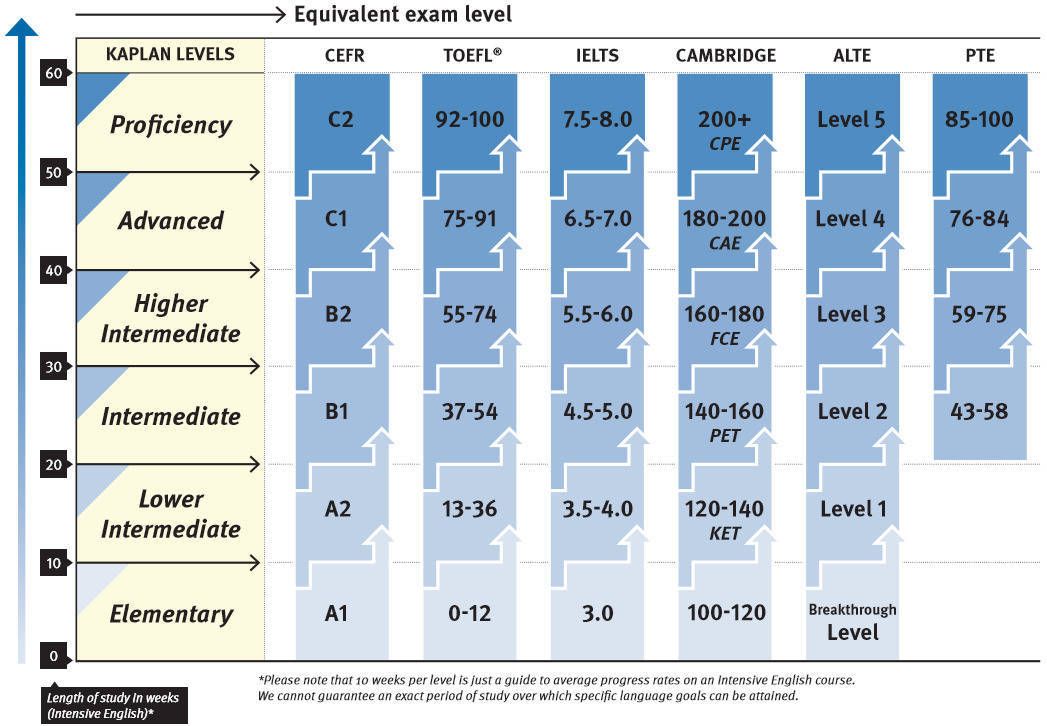Test love language
Test love language
Quizzes to strengthen your relationships
Join the millions that have discovered the secrets to better relationships.
The Love Language™ Quiz
Discover your primary love language and how you can use it to better connect with your loved ones.
Apology Language™ Quiz
Learn your primary apology language to better understand how to heal hurt in your relationships.
Anger Assessment™ Quiz
Understand how you manage your anger, and discover how you might do better.
Appreciation Language™ Inventory
Discover what makes you feel encouraged and appreciated in the workplace.
© 2022 Moody Publishers. All Rights Reserved.
Apology Language Quiz
What’s Your Apology Language?
What’s your Apology language? Just as our preferred Love Languages differ, each one of us has a preferred Apology Language that may differ from the people we love. This quiz will help you learn your Primary Apology Language so that you can better understand how to heal hurt in your relationships.
Apology Language Quiz
Apology Language Quiz
It’s more meaningful to me when I hear someone say.
I deeply regret having embarrassed you like I did.
Our friendship is really important to me. Will you please forgive me?
It’s more meaningful to me when someone says.
OK, I admit it- I made a big mistake.
I want to grow from this experience. Would you be willing to help me figure out steps to handle this type of situation better?
It’s more meaningful to me when someone tells me.
What can I do or say to make things right between you and me?
I had a bad attitude and it showed. I should have thought more about what I was doing.
It’s more meaningful to me when someone says.
I don’t want to do this again. So I will come up with ways to avoid mistakes like this in the future.
I apologize for my actions. You obviously don’t have to forgive me, but I hope you will.
It’s more meaningful to me when someone asks me.
Can you possibly forgive me?
What can I do to mend our relationship?
It’s more meaningful to me when I hear someone say.
I totally messed up. I could make excuses, but really, I have no good excuse for my actions.
You have every right to hold this against me, but will you please consider forgiving me?
It’s more meaningful to me when someone asks me.
I’d like to make things better between us. What can I do to make things right?
You don’t have to answer immediately, but will you consider forgiving me for making this mistake?
It’s more meaningful to me when I hear these words from someone.
I want to ask you to forgive to me.
It deeply pains me to see you hurting like this.
It’s more meaningful to me when someone says.
I’ve really messed up this time. We missed the deadline because of me.
Can we back up and let me try to fix this? I really want to mend the damage I’ve caused.
It’s more meaningful to me when I hear someone say.
I am upset with myself over how I handled our disagreement. I cringe when I recall the way I acted.
I know that what I’ve been doing is not helpful. What would you like to see me change that would make this better for you?
It’s more meaningful to me when someone tells me.
I know that what I did was wrong.
I’m so sorry- I feel terrible that I let you down.
It’s more meaningful to me when someone asks me.
What changes could I put into place so that you might begin to trust me going forward?
I hope this won’t permanently damage our working relationship. Will you please accept my apology?
It’s more meaningful to me when someone says.
I can see my actions caused you pain, and I feel terrible about what I did.
Is there anything I can do to repair the damage I’ve created?
It’s more meaningful to me when someone tells me.
If I had only thought about what I was doing, I would have realized it was wrong.
I know that I’ve caused you a significant amount of trouble. I would greatly appreciate it if you would forgive me.
It’s more meaningful to me when I hear someone say.
I am truly grieved and sorry for my actions plus the ways they affected you.
If I am ever again upset with you, I promise to gather my thoughts and approach you directly and respectfully.
It’s more meaningful to me when someone says.
I hope that you can find it in your heart to forgive me.
I simply should not have done that.
It’s more meaningful to me when I hear someone say.
I realize that talk is cheap. I’ll work to show you that I’m changing.
Is there anything I can do to make up for what I did?
It’s more meaningful to me when someone tells me.
I really am embarrassed about my behavior—and I’m so, so sorry.
No if’s, and’s or but’s. I admit that I was wrong.
It’s more meaningful to me when I hear someone say.
I apologize. Will you please forgive me?
Going forward, I will manage my time and prioritize my schedule so that I won’t have the same difficulties.
It’s more meaningful to me when someone says.
I want so badly to avoid this type of error again. Let’s talk about what I can do in the future to follow through on my commitments.
I don’t feel right just saying «My bad.» I want to make up for what I’ve done. What would you consider appropriate?
It’s more meaningful to me when someone tells me.
I know that my actions were totally unacceptable. I own that.
It stresses me out to know that you had to stand there waiting on me. I regret the frustration and worry that I caused you.
It’s more meaningful to me when someone says.
I know that I’ve inconvenienced you. What can I do for you that could help balance things out?
I am unhappy with how I’ve hurt you—I’m enormously disappointed in myself.
It’s more meaningful to me when I hear these words from someone.
What can I do to make this situation right for you—immediately?
It may take some time to rebuild your trust in me—meanwhile, I’ll be working hard on changes to prove that I am trustworthy.
It’s more meaningful to me when someone says.
I am so sorry about that. I feel truly awful about having disappointed you.
Saying «I’m sorry» doesn’t feel like it is enough. What more can I say or do to make this up to you?
It’s more meaningful to me when someone says.
I’m confident that everything I’ve learned from this bad experience will prevent me from doing it again.
I know what I did was inappropriate—no two ways about it.
Love Language Test
Your primary love language is Physical Activity
What is a love language test?
A love language is an online quiz that contains questions related to words of affirmation, physical touch, quality time, gifts, and acts of service, each of which represents a distinct way of expressing love.
The love language test is completely related to the love language theory, which is developed by Gary Chapman, Ph.D., in the 1990s, which posits that every person has a diffrent love language for giving and receiving love.
For example, A person feels most respected when their lover/partner says words of affirmation like «I love you,» whereas their partner may feel most appreciated when they receive physical touches like kisses and holding hands.
How does the love language test work?
The love language test is designed to measure your level of responsiveness to five different love languages, including words of affirmation, quality time, physical touch, gifts, and acts of service.
There is no «passing» score on the love language test. Your results can give you essential insights into your own needs and how you best express love to your partner.
Whether you’re looking to improve your relationship with a partner or want to understand yourself better, taking the love language test can be a valuable experience.
What are the 5 love languages?
Here’s a quick basic overview of each love language that is interconnected to you and your partner’s feelings.
1. Words of Affirmation
Words of affirmation are any verbal expressions that your partner says things that make you feel loved. Usually, It contains receiving compliments, hearing their partner about them, saying or hearing «I love you» from a partner and much more words that make your partner love.
2. Physical Touch
3. Quality Time
Quality time is the time when two partners spend their time together and enjoy their company. We can say it is the best time to make memories with the partners. This love language is of real value to partners who make traveling plans, night-out plans, movie plans, etc.
4. Gifts
Gifts are the physical things that are loveable to your partner like a watch, books, smartphone, bangles, etc. It is the most attractive way to show your love and make a lifetime memory with your partner.
5. Acts of service
Acts of service are gestures that make someone’s day better or easier, like making them coffee for your partner, caring when they’re sick, or sacrificing something, so they feel love. People with this love language are talking less and assemble acts to feel their partner loveable from the sole.
How to use the love languages in your relationship?
Our love language test is a quiz that can help you to understand yourself and your partner. It is based on the book The Five Love Languages by Gary Chapman.
Love Language Test
The language of love that a person speaks depends on many factors: on the characteristics of character, upbringing, behavior patterns of parents, social environment. We get used to expressing ourselves in the language we are familiar with and expect from a partner the same love manifestations that we understand.
However, very often there is such a situation when we speak different languages of love with our loved ones. If for one person to love is to receive and give gifts, and for another — to help, then these two loving people may simply not understand each other. And, unfortunately, this often destroys marriages, and many still do not understand that it was only necessary to express their love in a slightly different way.
If you want your love relationship to be harmonious, you need to know your own language of love and learn the main language of your partner, because it is in this language that your significant other speaks to you, communicating their feelings for you.
Free 5 Love Languages Quiz – [Quick Test]
We all interact with the world in ways that are as unique as ourselves.
There are thinkers and feelers, introverted and extroverted people, highly sensitive and intuitive people as well as endless other ways of processing the world around us.
It’s no surprise then to discover that we each give, receive, and understand love in different ways. Although there are as many love “dialects” as there are people, there are five main love languages we use to communicate: Words of Affirmation, Quality Time, Gifts, Acts of Service, and Physical Touch.
The 5 Love Languages® by Dr. Gary Chapman presents the idea that we each have an “emotional love tank” that constantly needs replenishing. When our emotional tank is empty, we feel unloved, unappreciated, and our relationships don’t reach their full potential.
Most problems in our relationships with other people come from speaking in different love languages, whether that be with your partner, friend or even child. For example, your husband/wife might complain to you that you “don’t spend enough time with him/her” when you communicate your love through acts of service.
In this free love languages test, you’ll find out what your primary love language is. Discovering your love language will help you to communicate with others how you prefer to receive love.
You might also like to encourage your loved one’s to take this love languages quiz so that you can find out how to speak their love language as well.
Test love language
Gary Chapman, Ph.D.—author, speaker, and counselor—has a passion for people, and for helping them form lasting relationships.
Chapman is a well-known marriage counselor and director of marriage seminars. The 5 Love Languages® is one of Chapman’s most popular titles, topping various bestseller charts for years, selling over twenty million copies and has been on the New York Times bestsellers list since 2007. Chapman has been directly involved in real-life family counseling since the beginning of his ministry years, and his nationally-syndicated radio programs air nationally on Moody Radio Network and over 400 affiliate stations.
It’s never too late to start loving better.
Dating, married, single, or simply looking for better ways to connect with others? There’s a book for you!
The 5 Love Languages®
The 5 Love Languages® of Children
The 5 Love Languages® Singles Edition
The 5 Love Languages® for Men
The 5 Love Languages® of Teenagers
The 5 Love Languages® Military Edition
3 steps to strengthening your relationships
Step 1
Learn Your Love Language™
Get ready for an «aha» moment! Discovering your own primary love language will help you better understand yourself, as well as teach others how to love you best.
Step 2
Exchange Your Results
Relationships go two ways. Once you discover your love language, share it with your loved ones. Then, ask them to share their results with you so you can love them better.
Step 3
Strengthen Your Relationships
Weekly Newsletter
Want to get helpful suggestions, product updates, and even discount codes delivered straight to your inbox?
«What Are The 5 Love Languages™?»
They love each other, right? Then why do they always feel like they’re not on the same page?
The most common issue in any relationship is the communication barrier. Everyone experiences love differently, and it’s easy to miss the mark when it comes to showing that you care.
In his early years as a marriage counselor, Dr. Gary Chapman noticed that over and over, couples voiced similar complaints regarding their marriage.
One spouse would say something like, «I feel like he doesn’t love me.»
And the other would protest, «I don’t know what else to do. I’m doing everything I should be doing.»
Recognizing this pattern and remembering the rocky start in his own marriage, Dr. Chapman pored three years of session notes.
He asked himself, «When someone’s saying, ‘I feel like my spouse doesn’t love me,’ what did they want?»
Surprisingly, their answers fell into five different categories, revealing a unique approach for how to effectively love another person.
The premise is simple: Different people, with different personalities, give and receive love in different ways. Dr. Chapman called these ways of expressing and receiving love «The 5 Love Languages®.» He even wrote a best-selling book about it.
This revolutionary concept has improved millions of relationships across the globe.
These Love Languages don’t only apply to couples, the concept holds true for friends, siblings, parents and their children, and relationships of every kind. Each individual has at least one primary love language that they prefer above the others and that is where it really starts to get interesting.
Want to intentionally strengthen and improve your relationships? You can start right now, by taking The 5 Love Languages® quiz to find out how you prefer to give and receive love.
Онлайн тест «5 языков любви» (20 вопросов)
Влюблённость придаёт нам сил, энергии, уверенности в себе, помогает совершать самые смелые поступки. Но очень часто в союзах встречаются недопонимания, ссоры, обиды, которые приводят к расставаниям. Для того чтобы избежать проблемы и пронести светлое чувство через всю жизнь, на помощь придёт психологический онлайн-тест «Пять языков любви» бесплатно.
Онлайн тест
Результаты бесплатного онлайн-теста языки любви помогут построить крепкие любовные отношения. Прохождение теста не займёт больше 10 минут, а его результаты вас порадуют.
Совет. Если хотите построить гармоничные любовные отношения, то вам было бы неплохо как свой язык любви, так и партнёра, тогда вы сможете выражать чувства понятным друг другу способом.
Что такое языки любви
Знаменитый психолог Гэри Чепмен определил пять языков любви:
Это способ, которым человек предпочитает, чтобы партнёр выражал чувства, а также на таким образом, он выражает свои. Но очень часто бывает, что для одного любить означает дарить и получать подарки, а для возлюбленного любить — значит помогать. Из-за этого два любящих сердца не могут понять своего мужа или жену — в отношениях возникают ссоры, конфликты, что приводит к расставаниям.
Удачного вам тестирования!
Эзотерик, таролог, астролог (консультант проекта)
Cyberculture Love Styles Test
The love styles framework is a popular tool for exploring how a person expresses love and likes to be treated in their relationships. The cyberculture version of the classic love styles test is a variant adapted to the distinctiveness of internet culture.
What are your love styles like? For each of the following statements, indicate how well it applies to you below.
Question 1 of 30
I enjoy it when my partner and I can share the adrenaline and endorphin rush that comes from delving deeply into certain horrific murders or crimes.
Advertisement
The IDRlabs Cyberculture Love Styles Test (IDR-CLLT) was developed by IDRlabs. The IDR-CLLT is based on the machinations of internet youth culture.
The test provides feedback such as the following:
Memes: People whose love style is “memes” communicate love through the exchange of digital in-joke imagery. People who share this love style feel understood by their partner by virtue of a shared sense of humor, and they enjoy the feeling of knowing that their significant other has thought about them when they receive a meme with a curated message.
Serial Killers: People whose love style is “facts about serial killers” communicate love through sharing facts about murderous crimes and the individuals who commit them. Such conversation might also include debate and analysis of these events, the psychological constitution of specific serial killers, or the practices (and potential neglects) of law enforcement. People who share this love style are bonded by a mutual sense of morbid curiosity and feel understood when seeing their niche interests (which are often condemned as macabre by society) reflected in their partner.
Conspiracy Theories: People whose love style is “conspiracy theories” cherish partners who are open-minded, unrestrained by dogma and convention, and capable of seeing things from many different perspectives. Given the taboo that surrounds conspiracy theories in many social circles, such people find it soothing and exhilarating to be able to share their takes on controversial theories with their significant other. They feel loved when they are met with curiosity and earnest interest, and they adore when their partner in turn feels safe enough to share his or her own conspiracy theories in turn. Date nights can be spent in long hours immersed in deep discussions about the secrets that are being kept from us.
Roasting: People whose love style is “roasting each other” enjoy it when they and their partner engage in playful banter that outsiders might perceive as shocking or harsh. For such people, making light of each others’ flaws and ultimately articulating these in a well-directed insult is really an act of affection. People who share this love style also tend to find the power-play entailed by such a dynamic exhilarating. In these spheres, insults are considered a kind of affirmative flirtation rather than put-downs meant to undermine the other person’s self-esteem. Still, date nights spent enjoying a heartfelt exchange of loving verbal abuse are not for everyone.
As the publishers of this free online Cyberculture Love Styles Test, which allows you to screen yourself for the characteristics and manifestations of your internet culture love style, we have striven to make the test as reliable and valid as possible by subjecting it to statistical controls and validation. However, free online quizzes such as the present Cyberculture Love Styles Test do not provide professional assessments or recommendations of any kind; the test is provided entirely “as-is.” For more information about any of our online tests and quizzes, please consult our Terms of Service.
Why Use This Test?
1. Free. This Cyberculture Love Styles Test is freely accessible and will allow you to obtain your scores relating to the use of memes, serial killers, conspiracies, roasting, dates, and care as preferred communications, and learn your normie factor as well.
2. Statistical controls. Statistical analysis of the test is conducted to ensure maximum accuracy and validity of the test scores.
3. Made by professionals. The present test has been made with the input of people who work professionally with psychology and individual differences research.
Which of the 5 Love Languages Are You?
Working our magic.
Get your results & other quizzes sent to your inbox!
No, thanks, I’ll watch an ad to see my results
Please, be patient, your results are being generated!
Working our magic.
Save all future quiz results by signing in!
(you won’t lose your spot!)
No, thanks, I’ll watch an ad to get to the next question
Please, be patient, your results are being generated!
You might be aware that there are five love languages, five chief ways in which we express love to those who are important to us. The five languages of love are receiving gifts, quality time, words of affirmation, acts of service, and physical touch. Everyone responds to and values each of these la Show More
You might be aware that there are five love languages, five chief ways in which we express love to those who are important to us. The five languages of love are receiving gifts, quality time, words of affirmation, acts of service, and physical touch. Everyone responds to and values each of these languages differently. You may feel most loved when someone uses their words to literally say, “I love you.” Your partner might respond most positively to holding hands or cuddling. You probably have a love language (or two) that make you feel most valued in a relationship, and you also probably have a few set ways in which you show your love to others. These might not be the same, but that is totally OK.
This quiz will tell you which love language you embody with all your heart and soul. If you are open to giving and receiving love this way, you will live a very happy life.
Love Language Test: How to Get Started with Finding Your Love Language
Home » Relationship Habits » Love Language Test: How to Get Started with Finding Your Love Language
There might be affiliate links on this page, which means we get a small commission of anything you buy. As an Amazon Associate we earn from qualifying purchases. Please do your own research before making any online purchase.
If you’re in a committed relationship, chances are it’s not all sunshine and roses. And if you believe that it is, then you must be in the early stages.
You know, the ones where you try really hard to be the person you think your partner wants you to be.
Like when you get up at 5:30 am to go jogging with your girlfriend… even though you are not a morning person or a runner.
Or when you have dinner waiting on the table for your fiance every night when he gets home from work… even though you are exhausted from working all day too.
Or when you pass up a chance to go to a hockey game with the guys because your partner feels like binge-watching a series on Netflix.
Ah, yes. We’ve all been there… the courtship.
Yet it’s not reality.
I mean, sure… it got you to where you are now. You fell in love. Those joyous, carefree moments meant something.
But now that you’ve found yourself deep in the trenches of true love, or marriage, things have changed a bit.
(Side note: Another positive way to improve your life is to read and learn something new every day. A great tool to do this is to join over 1 million others and start your day with the latest FREE, informative news from this website.)
What You Will Learn
How Knowing Your Love Language Helps Your Relationship
As time goes by, every romantic relationship will see its share of ups and downs.
After all, life happens… and it can be stressful. Health issues, romance issues, work issues, social issues, parenting issues. And those are just some of the things that can affect a relationship.
So what can we do to prevent the rough patches from consuming us? From destroying the relationship we’ve worked so very hard to build?
Many of you will say that communication is key in a relationship… and it is. Open, honest communication is a fabulous start.
Understanding the way your partner wants to be loved is also beneficial.
And lucky for you, the answer to that can be found in a simple love language test.
Think about it as someone gifting you with a box of tools to help make your partner feel better about themselves… more appreciated.
A Quick Intro to the Love Language Quiz
Created by Dr. Gary Chapman, author of The 5 Love Languages, this short online quiz is designed to help couples identify the unique ways in which they feel the most loved.
The 5 languages are:
The quiz is simple, asking many of the same questions… only phrased differently. So don’t worry about being repetitive.
Also, if you aren’t sure of an answer, Chapman suggests picking the one closest to how you feel.
The quiz took me only about 10 minutes… a drop in the bucket to gain some very valuable insight into myself.
At the end, I was given my results immediately. They are emailed as well.
The highest score indicates your primary love language (the highest possible score is 12). It’s not uncommon to have two high scores, although one language does have a slight edge for most people. That just means two languages are important to you.
The lower scores indicate those languages you seldom use to communicate love and which probably don’t affect you very much on an emotional level.
You may have scored more highly on certain love languages than others, but do not dismiss those other languages as insignificant. Your partner may express love in those ways, and it will be helpful to you to understand this about him/her, according to Chapman.
I’m working on getting my husband to take the love language test.
Similarly, it will benefit your partner to know your primary love language in order to best express affection for you in ways that you interpret as love. Every time you or your partner speak each other’s language, you score emotional points with one another.
Of course, there’s no actual scorecard! The payoff here is a greater sense of connection with your partner that comes from speaking each other’s love language.
This translates into better communication and increased understanding of… which will likely lead to kickstart in the romance department.
So, back to the quiz.
My Love Language Quiz Results
Here are my results:
Words of Affirmation (10 out of 12)
Actions don’t always speak louder than words. If this is your love language, unsolicited compliments mean the world to you. Hearing the words, “I love you,” are important – hearing the reasons behind that love sends your spirits skyward. Insults can leave you shattered and are not easily forgotten. Kind, encouraging, and positive words are truly life-giving.
Acts of Service (8 out of 12)
Can vacuuming the floors really be an expression of love? Absolutely! Anything you do to ease the burden of responsibilities weighing on an “Acts of Service” person will speak volumes. The words he or she most wants to hear: “Let me do that for you.” Laziness, broken commitments, and making more work for them tell speakers of this language their feelings don’t matter. Finding ways to serve speaks volumes to the recipient of these acts.
Quality Time (6 out of 12)
In the vernacular of Quality Time, nothing says, “I love you,” like full, undivided attention. Being there for this type of person is critical, but really being there – with the TV off, fork and knife down, and all chores and tasks on standby – makes your significant other feel truly special and loved. Distractions, postponed dates, or the failure to listen can be especially hurtful. Quality Time also means sharing quality conversation and quality activities.
Physical Touch (5 out of 12)
This language isn’t all about the bedroom. A person whose primary language is Physical Touch is, not surprisingly, very touchy. Hugs, pats on the back, holding hands, and thoughtful touches on the arm, shoulder, or face – they can all be ways to show excitement, concern, care, and love. Physical presence and accessibility are crucial, while neglect or abuse can be unforgivable and destructive. Physical touch fosters a sense of security and belonging in any relationship.
Receiving Gifts (1 out of 12)
Don’t mistake this love language for materialism; the receiver of gifts thrives on the love, thoughtfulness, and effort behind the gift. If you speak this language, the perfect gift or gesture shows that you are known, you are cared for, and you are prized above whatever was sacrificed to bring the gift to you. A missed birthday, anniversary, or a hasty, thoughtless gift would be disastrous – so would the absence of everyday gestures. Gifts are visual representations of love and are treasured greatly.
Now, let me say two things about Chapman’s love language test.
First, I thought my results were fairly spot on. I might have ranked physical touch a bit higher; however, the way the questions presented themselves to me dictated otherwise. Clearly, I favor a kind word over a squeeze of the buttocks… when it comes down to it.
Second, I felt that some of the questions were circumstantial in nature… as in, a person’s love language may change as situations do.
Had I taken the quiz when we were dating, I’d wager I would have put a lot of weight on quality time and physical touch.
Ten years later, I am a stay at home mom to four young kids… meaning I tend to feel underappreciated and overworked sometimes.
Ok, a lot of the time.
Not just by the children, but by my husband.
You see, we’ve seem to hit a point in the relationship where the kids are getting older and costing more money (food, activities, vacations, parties, clothing)… so having only one main source of income is stressing him out.
Thus, he comes home some days acting as if I’ve done nothing all day.
No running the kids around. No laundry. No cooking. No cleaning. No food shopping. No playdates. No writing part-time.
My days are full as well, maybe not in the same way as his… but I am busy. And all I want is for him to acknowledge my contributions in the relationship by saying something nice.
And to lend a hand with the laundry here and there… which would be why I ranked Acts of Service pretty high.
So, yeah, the love language test nailed it.
I wonder what my husband’s results will show?
Maybe he feels the same way I do about Words of Affirmation?
I mean, while I’d like to fancy myself the perfect wife who always smiles, waxes compliments and never complains… I know I’m not.
Not all of the time anyway
In fact, if I’m being honest, I’ve caught myself complaining on quite a few occasions… usually on school day mornings, before that first cup of coffee kicks in.
Up with the kids a few times last night… four lunches to pack… dishes to do… husband still in bed.
So, one of my New Year’s Resolutions is to wake up 30 minutes earlier on school days… giving myself some quiet time to have that cup of joe and start making lunches before the kids come downstairs.
Then, all that’s left is breakfast and getting them on the bus.
I can say that this has helped alleviate my stress and put me in a better mood, which my husband is likely happy about as well. So now he just needs to acknowledge the “new me” by speaking my love language and providing those Words of Affirmation.
But here’s my point…
Final Thoughts on the Love Language Test
The love language test, whether both of you take it or not, is not meant to place blame.
Just because I have a tendency to feel most loved in a certain way (language)… doesn’t mean my partner doesn’t show me, love. He just does it in his own way.
The test is, however, meant to clue yourself and your partner into how you are feeling. Thus, forcing an open conversation and potentially unlocking suppressed issues you’ve been hiding… before they bubble up to the surface and explode via an argument – or worse.
Many couples don’t communicate properly until it’s too late. That is why the divorce rate is still so high.
The love language test is just another tool to help you keep your relationship rock solid… and, personally, I’ll take all the help I can get.
Because I love my husband and our family. I am invested in this marriage. This life.
If a love language test is another way of keeping the lines of communication open… I’m game.
More Tests for the Taking
If you like the love language test, Chapman also offers Apology and Anger quizzes. Similar to the Couples quiz, these tests are designed to reveal your apology and anger languages.
I plan to take them both.
Color me curious.
And if you’re a fan of any or all of the love language tests on the website… you can subscribe to Chapman’s 5 Love Languages® newsletter for new content, helpful suggestions, and sincere support delivered straight to your inbox. Plus, you get discount codes for featured resources and a link to author Gary Chapman’s podcast!
The Story of The 5 Love Languages®
In his early years as a marriage counselor, Dr. Gary Chapman noticed over and over that couples would voice similar complaints regarding their marriage. One spouse would say something like, “I feel like he doesn’t love me. The other would protest, “I don’t know what else to do! I’m doing everything I should be doing.”
Recognizing a pattern, Dr. Chapman pored through years of session notes. He asked himself, “When someone said, ‘I feel like my spouse doesn’t love me,’ what do they actually want?” Surprisingly, their answers fell into five categories, revealing a unique approach in how to effectively love another person.
More than 25 years later, this revolutionary concept has improved millions of relationships across the globe. The premise is simple: different people with different personalities express love in different ways. Gary called these ways of expressing and receiving love the “5 Love Languages.” They are Words of Affirmation, Acts of Service, Receiving Gifts, Quality Time, and Physical Touch.
About Dr. Gary Chapman
Gary Chapman, Ph.D. – author, speaker, and counselor – has a passion for people, and for helping them form lasting relationships.
Chapman is a well-known marriage counselor and director of marriage seminars. The 5 Love Languages® is one of Chapman’s most popular titles, topping various bestseller charts for years. He has also written books on Love Languages for:
Chapman has been directly involved in real-life family counseling since the beginning of his ministry years, and his nationally-syndicated radio programs air nationally on Moody Radio Network and over 400 affiliate stations.
Finally, if you want another positive way to improve your life, then read and learn something new every day. A great tool to do this is to join over 1 million others and start your day with the latest FREE, informative news from this website.
Love Styles Test
The love styles framework is a popular tool for exploring how a person expresses love and likes to be treated in their relationships. This test will measure yours.
What are your love styles like? For each of the following statements, indicate how well it applies to you below.
Question 1 of 35
I feel loved when my partner gets me something really special that I could not get myself.
Advertisement
The IDRlabs Love Styles Test (IDR-LST) was developed by IDRlabs. The IDR-LST is not the same as the work of Dr. Gary Chapman, Ph.D., who authored the book, “The 5 Love Languages®” or the Love LanguageTM quiz. The IDR-LST is not associated with Dr. Chapman or any specific researchers in the field of personality psychology, counseling psychology, or any affiliated research institutions. Nor is this test the equivalent of Dr. Chapman’s Love LanguageTM quiz. The 5 Love Languages® and other formative registered and common law “Love Language” trademarks are owned by The Moody Bible Institute of Chicago, which is not affiliated with this site.
The test provides feedback such as the following: Words: People whose love style is Words communicate love through kind words and encouragement. Their love style involves spoken words, praises, or compliments. They themselves also feel loved when others talk to them in a positive and encouraging way or send them positive messages, love notes, or inspiring quotes.
Focus: People whose love style is Focus communicate love through giving another their undivided attention. Such focus may involve uninterrupted and deeply-attentive conversations in one-on-one settings – creating special moments together, turning off phones, and shutting out other distractions. They themselves also feel loved when they are prioritized, and they deepen their connections by spending such special times with others.
Gifts: People whose love style is Gifts cherish the effort and creativity put into the presents which are being given to and by them. They see gifts as important symbols of love and affection. It is important to note that people with this love style do not normally expect expensive or large gifts since what they value is the sentiment and the meaning behind the object. They feel loved when others take the time to look for the “perfect” gift for them, and they express love by finding the perfect gifts for others.
Acts: People whose love style is Acts enjoy when others do everyday, helpful things for them. They feel loved when others take the time to do small favors for them, such as when others make their tea or coffee exactly the way they like it or when their partner volunteers to help them with tasks that are difficult or draining for them. This love style is the origin of the familiar adage that “actions speak louder than words.”
Touch: People whose love style is Touch cherish being hugged, touched, and physically close to the people they are comfortable with. Their love style is one of physical affection. For instance, an ideal date may include holding hands, cuddling, and sitting close with each other – simply enjoying the exchange of intimacy and familiarity.
As the publishers of this free online Love Styles Test, which allows you to screen yourself for the characteristics and manifestations of your love style, we have striven to make the test as reliable and valid as possible by subjecting it to statistical controls and validation. However, free online quizzes such as the present Love Styles Test do not provide professional assessments or recommendations of any kind; the test is provided entirely “as-is.” For more information about any of our online tests and quizzes, please consult our Terms of Service.
Why Use This Test?
1. Free. This Love Styles Test is delivered to you free of charge.
2. Statistical controls. Statistical analysis of the test is conducted to ensure maximum accuracy and validity of the test scores.
3. Made by professionals. The present test has been made with the input of people who work professionally with psychology and individual differences research.
Языки любви — онлайн тест
Как утверждают психологи, люди по-разному воспринимают любовь и говорят на разных «языках любви». Язык любви — это тот способ, которым человек предпочитает, чтобы другие люди выражали свою любовь к нему, а также тот способ, которым он сам выражает и проявляет свою любовь.
Язык любви, на котором говорит человек, зависит от многих факторов: от особенностей характера, воспитания, модели поведения родителей, социального окружения. Мы привыкаем изъясняться на привычном нам языке и ждем от партнера таких же понятных нам любовных проявлений.
Однако, очень часто складывается такая ситуация, когда мы говорим на разных языках любви с нашими близкими. Если для одного любить — это получать и дарить подарки, а для другого — помогать, то эти два любящих человека могут просто друг друга не понять. И, к сожалению, от этого зачастую разрушаются браки, и многие так и не понимают, что нужно было всего лишь немного по-другому выражать свою любовь.
Если вы хотите, чтобы ваши любовные отношения были гармоничными, необходимо знать свой собственный язык любви и изучить основной язык вашего партнера, поскольку именно на этом языке ваша вторая половинка говорит с вами, сообщая о своих чувствах к вам.
Чтобы узнать, какой из пяти языков является для вас основным, пройдите тест, который основан на книге Гэри Чепмена «Пять языков любви», и заключается в определении языков любви, наиболее свойственных тому или иному человеку.
Если вы хотите узнать, на каком языке любви говорит ваша вторая половинка, пройдите тест «Язык любви вашего партнера», а затем попросите любимого человека выполнить тест, представленный на странице ниже, и сравните полученные результаты. Так вы сможете узнать, правильно ли вы понимаете свою вторую половинку.
Онлайн тест «Языки любви». Узнайте свой язык любви
Тест состоит из 30 пунктов, каждый из которых содержит два утверждения. В каждом пункте необходимо выбрать одно. Вам могут подходить и два ответа, однако для того, чтобы результаты были точными, необходимо выбрать то утверждение, которое вам ближе всего, с которым вы согласны больше.
Каков ваш язык любви?

Как ни странно, но общие интересы и схожее мировоззрение далеко не всегда дают гарантированный результат, что пара останется вместе. Проповедник и консультант по вопросам семьи Гэри Чепмен разработал особую методику из пяти пунктов, каждый из которых означает отдельный вид языка, которым мы показываем свою любовь. Гэри думает, что если языки любви пары не стыкуются, то они и не смогут быть вместе. Среди них слова, помощь, время, подарки и прикосновения. Пройдя наш тест, вы сможете узнать, какой из них наиболее близок и используем вами.
Вы привыкли выражать чувства с помощью слов: признаваться в любви, делать комплименты. Вы давно заметили, насколько важно уметь разговаривать, прояснять, что сейчас происходит с близким человеком. Вам трудно представить счастливые отношения, где партнеры понимают друг друга без слов.
Вы уверены, что поступки способны гораздо больше рассказать об отношениях в паре, чем признания в любви. Вам доставляет удовольствие помогать любимому человеку, брать на себя часть его ежедневных забот. Возможно, партнер упрекает вас в немногословности, но вам привычнее выражать чувства не словом, а делом.
Объятия, поцелуи, ласки – именно через тактильные ощущения вы чувствуете любовь партнера и сами выражаете чувства. Вам нравится как можно чаще касаться любимого человека: держать за руку или просто сидеть рядом. После ссоры вы невольно ограничиваете физический контакт и даже стараетесь не подходить слишком близко к тому, с кем только что выясняли отношения.
Вам важно проводить все свободное время с любимым человеком. Вы интересуетесь его увлечениями и даже готовы пойти в кино на фильм, который не слишком вам интересен: главное – провести время вместе. Вам кажется, ничто так не сближает, как те моменты, которые надолго останутся в памяти у вас обоих.
Вы не привыкли говорить партнеру, как сильно его любите, и сами испытываете неловкость, когда вам признаются в любви. Вам гораздо проще купить подарок, который без слов расскажет о ваших чувствах. Вы ответственно относитесь к выбору даже небольшого сувенира: с его помощью вы пытаетесь не только сделать приятное близкому человеку, но и показать, насколько сильно любите его.
Test love language
Для того чтобы лучше понять своего партнера, пройдите тест на определение языка любви на котором разговариваете вы.
Начало теста:
Варианты ответов:
Варианты ответов:
Варианты ответов:
Варианты ответов:
Варианты ответов:
Варианты ответов:
Варианты ответов:
Варианты ответов:
Варианты ответов:
Идет подсчет результатов
Сообщить о нарушение
Ваше сообщение отправлено, мы постараемся разобраться в ближайшее время.
Попробуйте пройти эти тесты:
Тест Роршаха расскажет, что сейчас творится у вас в голове
Если вы знаете, где находятся эти города, то ваши знания географии достойны аплодисментов!
Из какой страны вы душой?
Сколько ты можешь выиграть в «Кто хочет стать миллионером?»
Тест на грамотность: Технарь вы или гуманитарий?
Сможете ли вы набрать 10/10 баллов в нашем тесте на общие знания?
Только те, кто росли в СССР, смогут без труда ответить на все вопросы нашего теста
Тест на общие знания: Просвещены ли вы настолько, чтобы пройти его на все 10/10?
Тест из одного вопроса, ответить на который правильно не может почти никто. Попробуете себя?
Цветовой тест на возраст
Вы — настоящий интеллигент, если сможете закончить 10 крылатых фраз — ТЕСТ
Угадайте воинские звания России по погонам
Этот тест определит ваш кругозор
Cколько лет вашей душе?
Тест: Узнайте в каком году вы должны были родиться на самом деле?
Умеете ли вы готовить? Сложный кулинарный Блиц-тест ресторатора Ивана Шишкина
Тест на кругозор. Хватит ли вам эрудиции, чтобы пройти его 10/10?
У вас должно быть как минимум два образования, чтобы пройти этот тест хотя бы на 9/12
Тест на общие знания, который без ошибок проходят лишь единицы. А получится ли у вас?
Только 4% людей способны пройти этот тест с вопросами различной направленности
Подписывайтесь на наши странички! Обязательно делитесь с друзьями! Впереди много новых интересных тестов! Ежедневные добавления! Страницы: Яндекс Дзен, ВКонтакте, Одноклассники, Facebook
Новые тесты от Андрей
Пройди тест совместимости по знакам зодиака
Тест на характер: Выберите яблоко и узнайте о себе
А давайте вспомним любимые советские фильмы?
10 вопросов для знатоков географии
Хочешь узнать, какая любовь тебе подходит?
Не все, кто родился в СССР, сумеют вспомнить эти преметы советского быта
IQ тест: 12 вопросов определят уровень вашего интеллекта!
Животное, которое вы первым увидели на картинке, расскажет секреты вашей сильной стороны характера
Тест для настоящих грамотеев. Ответите хотя бы на 8/10?
Не забыли еще советские мультики? Попробуйте вспомнить их названия по одной лишь реплике героя
Хотите узнать, насколько вы эрудированы? Тогда попробуйте ответить на наши 10 вопросов
Психологический тест: В чем скрыта ваша сила?
Популярные тесты от Андрей
Помнишь, что ели в Советском Союзе?
Если вы закончите представленные 15 фраз, то вы настоящий интеллектуал!
Как хорошо вы разбираетесь в географии?
У вас блестящая эрудиция, если сумеете дать 14 верных ответов из 14
Не заглядывая в Гугл, сможете ответить хотя бы на половину вопросов этого теста?
В чём ваш мозг крут
Если вы знаете, где находятся эти города, то ваши знания географии достойны аплодисментов!
Если сможете закончить 13 крылатых фраз, то вы настоящий интеллигент
Cколько лет вашей душе?
Угадайте воинские звания России по погонам
Тест на общие знания: Просвещены ли вы настолько, чтобы пройти его на все 10/10?
Если ответите на все вопросы нашего теста без ошибок, то можете считать себя уникумом с высоким IQ
Популярные тесты
Тест Роршаха расскажет, что сейчас творится у вас в голове
Если вы знаете, где находятся эти города, то ваши знания географии достойны аплодисментов!
Из какой страны вы душой?
Сколько ты можешь выиграть в «Кто хочет стать миллионером?»
Тест на грамотность: Технарь вы или гуманитарий?
Сможете ли вы набрать 10/10 баллов в нашем тесте на общие знания?
Только те, кто росли в СССР, смогут без труда ответить на все вопросы нашего теста
Тест на общие знания: Просвещены ли вы настолько, чтобы пройти его на все 10/10?
Тест из одного вопроса, ответить на который правильно не может почти никто. Попробуете себя?
Цветовой тест на возраст
Вы — настоящий интеллигент, если сможете закончить 10 крылатых фраз — ТЕСТ
Угадайте воинские звания России по погонам
Этот тест определит ваш кругозор
Cколько лет вашей душе?
Тест: Узнайте в каком году вы должны были родиться на самом деле?
Умеете ли вы готовить? Сложный кулинарный Блиц-тест ресторатора Ивана Шишкина
Тест на кругозор. Хватит ли вам эрудиции, чтобы пройти его 10/10?
У вас должно быть как минимум два образования, чтобы пройти этот тест хотя бы на 9/12
Тест на общие знания, который без ошибок проходят лишь единицы. А получится ли у вас?
Только 4% людей способны пройти этот тест с вопросами различной направленности
Преимущества
Можете встраивать тесты на Ваш сайт. Тест показывается нашем и других сайтах. Гибкие настройки результатов. Возможность поделиться тестом и результатами. Лавинообразный («вирусный») трафик на тест. Русскоязычная аудитория. Без рекламы!
Пользователям
Вам захотелось отдохнуть? Или просто приятно провести время? Выбирайте и проходите онлайн-тесты, делитесь результатом с друзьями. Проверьте, смогут они пройти также как Вы, или может лучше?
Внимание! Наши тесты не претендуют на достоверность – не стоит относиться к ним слишком серьезно!
Тест: на каком из 5 Языков Любви вы говорите? Определите свой язык любви и придите к гармонии в отношениях с близкими
Общество Дружба и любовь
Ссоры, обиды и непонимание происходят настолько часто, что вы уже решили, будто не созданы друг для друга? Прежде чем рвать концы, выясните, не на разных ли языках любви вы говорите. Это поможет лучше понять и себя, и партнера.
Вы любите своего партнера, но часто не понимаете его? Постоянно ссоритесь на пустом месте и никак не можете понять, в чем дело? Вероятно, вы говорите на разных языках любви: например, вы цените слова и совместно проведенное время, а для него больше важны ваша поддержка и физическая близость.
Семейный консультант и автор бестселлера “5 языков любви” Гэри Чепмен предлагает интересную схему из пяти способов, которыми люди выражают свою любовь. В тесте, который мы составили вместе с проектом сеkc.рф, вы узнаете свой язык любви. Не забудьте предложить этот тест вашему возлюбленному — это сделает вашу совместную жизнь проще и приятнее.
Тест: на каком из 5 Языков Любви вы говорите? Определите свой язык любви и придите к гармонии в отношениях с близкими
Как вы ссоритесь и как миритесь, как планируете совместную жизнь, что дарите друг другу, как выстраиваете отношения с родными и друзьями — все это говорит о вас больше, чем вы думаете. Схема языков любви поможет вам достичь гармонии в отношениях с самыми близкими людьми.
Что за тест на язык любви. В рунете гадают, о чём говорят его результаты на самом деле
Пользователи Сети проходят вирусный «Тест на язык любви» и гадают, что же значат его результаты. В опросе про отношения люди видят проверку на способность принимать знаки внимания, уровень требовательности к партнёру и детские психологические травмы.
Как в рунете проходят тест на язык любви
«Тест на язык любви» захватил пользователей рунета. Вирусный опрос предлагает узнать, как человек выражает свои чувства и какие способы проявления привязанности ему нравятся — например, подарки или прикосновения. Кто-то спешит на сайт узнать ответы на эти вопросы, а кто-то терзается сомнениями.
Хочу пройти тест на язык любви, но боюсь смотреть на результат.
Тест состоит из 35 утверждений об отношениях, с которыми нужно согласиться или нет. Для этого нужно выбрать одну из пяти предложенный реакций — от «совсем не нравится» до «очень нравится».

После прохождения теста программа составляет диаграмму и в процентном соотношении показывает, какой язык любви подходит человеку. Всего их семь — внимание, слова, деньги, подарки, прикосновения, действия и интеллект.
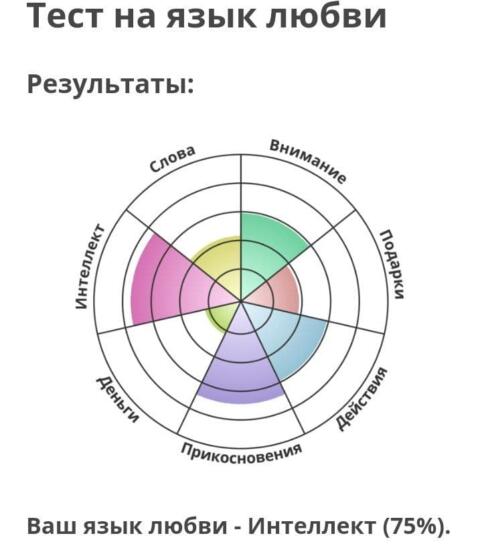
На сайте с тестом есть также описание для каждого из языка любви, чтобы прошедшие опрос смогли расшифровать результаты.
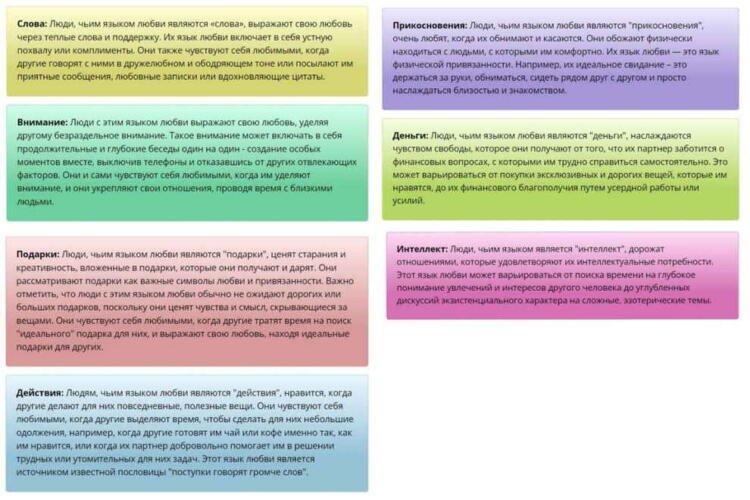
Многие пользователи Сети сошлись на том, что тест выявляет самые важные для человека аспекты отношений. Пройдя тест, большинство людей согласились с его результатами.
Прошла я этот ваш тест на язык любви, и да, так и есть. Отсутствие этих штук провоцируют тревожку и чувство, что тебя любят, уходит.
Для других пользователей Сети итоги тестирования оказались неожиданными и вызвали вопросы. Ведь они ожидали совсем иных результатов.
Ну типа ок, но… Я была уверена, что там будет слова 100%, а тут ваще не так. Меня надо хвалить 24/7.
Я не знаю, как реагировать на этот тест.
А кто-то вовсе не смог пройти тест до конца, ведь его вопросы напомнили о неудачах в личной жизни.
Я попыталась пройти тест на язык любви и провалилась буквально на первом же вопросе, потому что я не знаю, как выглядят эти ваши отношения. Что бы я чувствовала?
Столь разная реакция заставила людей задуматься, верно ли они расшифровывают диаграмму. Они начали строить теории, что на самом деле показывает тест на язык любви.
Какие теории о результатах теста на язык любви строят в Сети
Пользователи рунета обратили внимание не только на лидирующие «языки любви» в диаграмме, но и на степень их заполнения. Они посчитали, что это может дать подсказку к расшифровке результатов.
Теория № 1. Способность принимать знаки внимания
Стало популярными предположение, что тест показывает, насколько люди способны принять различные проявления чувств. Чем больше цвета в каждом секторе, тем более свободно и непринуждённо человек реагирует на слова нежности, подарки или прикосновения. Если у тестируемого очень низкие показатели во многих секторах, это повод задуматься о своей готовности к отношениям.
Этот вывод подтвердила психотерапевт, к которой тиктокерша o.meline обратилась за консультацией.
Например, низкие показатели в секторах «Деньги» и «Подарки» и пользовательницы твиттера katrinadesudesu не означают, что девушка не любит деньги или подарки. В соответствии с теорией, ей может быть сложно принимать их от партнёра.
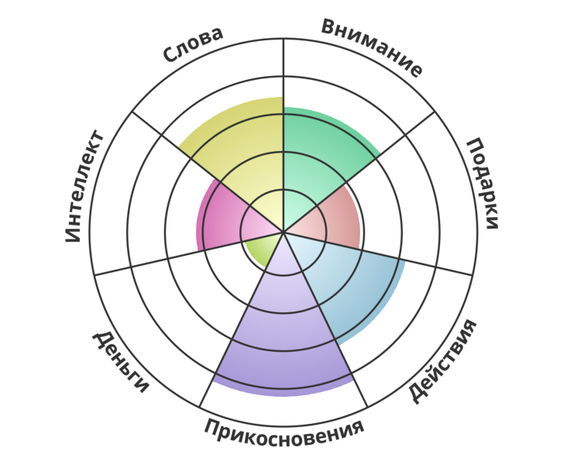
Теория № 2. Уровень требовательности к партнёру
Также с помощью теста пользователи Сети определяли, насколько они требовательны к своим партнёрам. Высокие проценты в каждом секторе предскажут, как часто и насколько интенсивно нужно одаривать человека — например, вниманием и подарками.
Прошла тест на язык любви. [Ничего себе], я требовательная, оказывается.
Чтобы понять, как работает теория на практике, сравним два разных результата. Оба тестируемых благосклонно относятся ко всем языкам любви. Однако первый настаивает на более частом и интенсивном проявлении привязанности, а второй довольствуется малым.
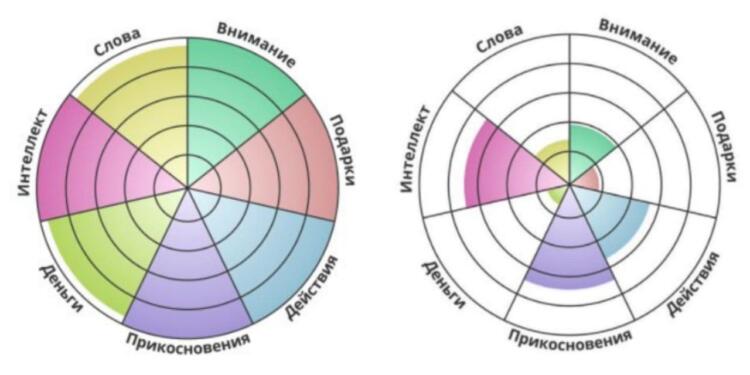
Теория № 3. Тест на недостаток любви в детстве
Другие пользователи Сети обнаружили взаимосвязь между результатами теста и детскими переживаниями. По их мнению, заполненные сектора показывают, чего больше всего не хватало человеку, когда он был ребёнком.
Представь: недолюбленный ребёнок проходит тест на язык любви.
Судя по результатам авторши видео, в детстве она испытывала недостаток внимания и любви со стороны родителей.
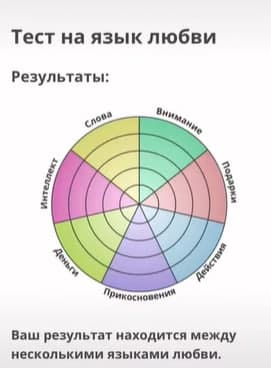
Вирусный тест на язык любви для многих пользователей Сети превратился из быстрого развлечения в повод поразмышлять о своём психологическом состоянии и проанализировать степень открытости и готовности к отношениям.
Ранее Medialeaks рассказывал, что такое избегающий тип привязанности и как его обнаружить у потенциального партнёра заранее.
Тест на стиль любви
Система стилей любви — это популярный метод для изучения того, как человек выражает свои чувства и как ему нравится, чтобы с ним обращались в его отношениях. Этот тест позволит определить Ваш стиль любви.
Каким стилем любви владеете Вы? Для каждого следующего утверждения укажите, насколько Вы с ним согласны.
Вопрос 1 из 35
Мне приятно, когда мой партнер находит время, чтобы отметить и поблагодарить меня за то, что я для него делаю.
Advertisement
Тест на стиль любви (IDR- LST) разработан компанией IDRlabs. Тест IDR- LST берет за основу работу доктора Гэри Чепмена, который является автором книги «Пять языков любви» и также одноимённого психологического теста. Тест IDR- LST не связан с доктором Чепменом и ни с какими конкретными исследованиями в области психологии, консультативной психологии или конкретными учреждениями. Этот тест также не является аналогичным тесту «Языки любви» доктора Чепмена. 5 Love Languages ® и другие официально торговые марки «Love Language» принадлежат Чикагскому библейскому институту Муди, который никоим образом не связан с этим сайтом.
Данный тест подает характеристику стилей любви следующим образом: Слова: Люди, чьим стилем любви являются «слова», выражают свою любовь через теплые слова и поддержку. Их стиль любви включает в себя устную похвалу или комплименты. Они также чувствуют себя любимыми, когда другие говорят с ними в дружелюбном и ободряющем тоне или посылают им приятные сообщения, любовные записки или вдохновляющие цитаты.
Подарки: Люди, чьим стилем любви являются «подарки», ценят старания и креативность, вложенные в подарки, которые они получают и дарят. Они рассматривают подарки как важные символы любви и привязанности. Важно отметить, что люди с этим стилем любви обычно не ожидают дорогих или больших подарков, поскольку они ценят чувства и смысл, скрывающиеся за вещами. Они чувствуют себя любимыми, когда другие тратят время на поиск «идеального» подарка для них, и выражают свою любовь, находя идеальные подарки для других.
Действия: Людям, чьим стилем любви являются «действия», нравится, когда другие делают для них повседневные, полезные вещи. Они чувствуют себя любимыми, когда другие выделяют время, чтобы сделать для них небольшие одолжения, например, когда другие готовят им чай или кофе именно так, как им нравится, или когда их партнер добровольно помогает им в решении трудных или утомительных для них задач. Этот стиль любви является источником известной пословицы «поступки говорят громче слов».
Прикосновения: Люди, чьим стилем любви являются «прикосновения», очень любят, когда их обнимают и касаются. Они обожают физически находиться с людьми, с которыми им комфортно. Их стиль любви — это стиль физической привязанности. Например, их идеальное свидание – это держаться за руки, обниматься, сидеть рядом друг с другом и просто наслаждаться близостью и знакомством.
Как авторы этого бесплатного онлайн-теста на стили любви, позволяющего определить Ваш способ выражать свои чувства, мы приложили все усилия, чтобы этот тест отличался надежностью и достоверностью благодаря многочисленным проверкам и статистическому контролю данных. Однако, бесплатные онлайн-тесты вроде этого предоставляют информацию «как есть», и не должны толковаться как предоставление профессиональной или сертифицированной консультации любого рода. Для получения дополнительной информации о наших онлайн-тестах ознакомьтесь, пожалуйста, с нашими Условиями предоставления услуг.
Почему использовать этот тест?
1. Бесплатность. Этот онлайн-тест предоставляется Вам абсолютно бесплатно.
2. Статистический контроль. Статистический анализ теста проводится для обеспечения максимальной точности и достоверности результатов.
3. Профессионализм. Этот тест разработали профессионалы, которые работают в сфере психологии и занимаются исследованиями индивидуальных различий.
Тест на умение любить
Тест на умение любить был разработан профессором Нестором Д. Капустой и его коллегами. Первичный тест связан с многочисленными параметрами психического здоровья и считается важным показателем психотерапевтической практики. Тест также доказал свою психометрическую достоверность и правдивость результатов по шести факторам, связанным со способностью человека любить.
Умеете ли вы любить? Для каждого следующего утверждения укажите, насколько вы соглашаетесь с ним.
Вопрос 1 из 30
При возникновении конфликтов я всегда стараюсь найти компромисс.
Тест на умение любить от IDRlabs (IDR-CTLT) разработан компанией IDRlabs. Этот тест основывается на работе доктора Нестора Капусты и его коллег, которые разработали опросник на умение любить. Тест IDR-CTLT не связан с какими-либо конкретными исследованиями в области психологии или конкретными исследовательскими учреждениями.
Пример результата теста: Интерес: Человеку с высокими показателями этого параметра необходимо знать подробности жизни его второй половинки. Искренняя заинтересованность в партнере включает эмоциональную близость, общие планы и чувство поддержки. Более того, для этих людей общение является ключевым фактором хороших отношений, поэтому для них важны частые разговоры, которые показывают искренний интерес друг к другу.
Доверие: Люди с высокими показателями этого параметра умеют открыто выражать свои чувства и потребности, не хранят секреты от своих партнеров и не испытывают никаких ограничений в отношениях. Таким образом, они верят, что их слышат, видят и воспринимают такими, какие они есть на самом деле.
Благодарность: Люди с высокими показателями этого параметра благодарны за сам факт существования своего партнера. Они выражают свои чувства, делая все возможное, чтобы их вторая половинка чувствовала себя более комфортно и значимо. Они очень ценят своих близких людей, и выражают свою благодарность разными способами, например, делая комплименты, помогая, отсылая письма или сообщения со словами благодарности.
Работа доктора Капусты и его коллег легла в основу их опросника на способность любить (Capacity to Love Inventory). Наш тест предоставляет информацию только в учебных целях. Тест IDR-CTLT не связан ни с какими вышеназванными исследовательскими учреждениями или учеными.
Данный тест опирается на известный опросник, оценивающий умение любить по таким факторам, как интерес к жизни партнера, элементарное доверие, благодарность, взаимность, постоянная страсть и разочарование. Однако все бесплатные онлайн-тесты вроде этого служат лишь ознакомительными материалами, которые не смогут определить свойственные вам черты с абсолютной точностью и достоверностью. Поэтому наш тест дает информацию только в учебных целях. Подробную информацию о вашем психическом состоянии может предоставить только дипломированный специалист.
Как авторы этого бесплатного онлайн-теста, который позволит оценить ваше умение любить, мы приложили все усилия, чтобы этот тест отличался надежностью и достоверностью благодаря многочисленным проверкам и статистическому контролю данных. Однако бесплатные онлайн-тесты вроде этого предоставляют информацию «как есть», и не должны толковаться как предоставление профессиональной или сертифицированной консультации любого рода. Для получения дополнительной информации о наших онлайн тестах ознакомьтесь, пожалуйста, с нашими Условиями предоставления услуг.
Почему использовать этот тест?
1. Бесплатность. Этот онлайн тест предоставляется вам абсолютно бесплатно. Он поможет определить ваш показатель умения любить по следующим факторам: ваш интерес к жизни партнера, элементарное доверие, признательность, взаимность, постоянная страсть и разочарование.
2. Клиническое направление. Результаты данного теста опираются на научные работы и предназначены для отображения четкой клинической картины респондента на способность любить.
3. Статистический контроль. Статистический анализ теста проводится для максимальной точности и достоверности результатов.
4. Профессионализм. Этот тест создан дипломированными специалистами с опытом работы с многочисленными психологическими тестами, которые работали на профессиональном уровне с тестированием типологии личности.
What Are the Five Love Languages?
Knowing your partner’s love language could strengthen your relationship
Sherri Gordon is a published author and a bullying prevention expert.
Adah Chung is a fact checker, writer, researcher, and occupational therapist.
Verywell / Alison Czinkota
The five love languages describe five ways that people receive and express love in a relationship. Knowing your partner’s love language and letting them know yours is a way to help you both feel loved and appreciated. Author and pastor Gary Chapman describes how to use these love languages to show your partner you care for them in a way that speaks to their heart.
What Are the Five Love Languages?
Chapman’s book «The 5 Love Languages» was first published in 1992. Before writing the book, Chapman began to notice patterns in couples he was counseling. He realized that the couples were misunderstanding each other’s needs.
That led him to come up with five love languages, or ways that people in relationships express love. They are:
Words of Affirmation
«Words of affirmation» is about expressing affection through spoken words, praise, or appreciation. When this is someone’s primary love language, they enjoy kind words and encouragement, uplifting quotes, love notes, and cute text messages. You can make this person’s day by complimenting them or pointing out what they do well.
Quality Time
Someone with this love language wants undivided attention. They feel loved if you are present and focused on them when you are together. This means putting down the cell phone, turning off the computer, making eye contact, and actively listening.
People with this love language are looking for quality over quantity.
Physical Touch
Acts of Service
Acts of service are nice things you do for your partner that make them feel loved and appreciated, such as:
If your partner’s main love language is acts of service, they’ll notice and appreciate little things you do for them. They tend to perform acts of service and kindness for others, too.
Receiving Gifts
For someone who uses and responds to this love language, gift-giving indicates love and affection. They treasure not only the gift itself but also the time and effort the gift-giver put into it.
People who enjoy receiving gifts as part of their primary love language do not necessarily expect large or expensive presents; it’s more the effort and thoughtfulness behind the gift that count.
When you take the time to pick out a gift specifically for them, it tells them you really know them. People with this love language can often remember every little gift they have received from their loved ones because it makes such an impact on them.
How to Identify Your Love Language
In a relationship, do you feel more loved when your partner:
Answering these questions could give you a hint as to what your love language might be. You could also try to recall the sorts of things you ask for in a relationship or consider how you express love to your partner. Chapman also offers an online 30-question quiz to help you determine your dominant love language.
Your partner’s love language might not be the same as yours. When couples have different primary love languages, there are bound to be misunderstandings. However, if your partner learns to speak your love language (and you, theirs), they will likely feel loved, appreciated, and, ultimately, happier in the relationship.
How Love Languages Benefit Relationships
We all express and receive love differently. Learning and understanding those differences can have a meaningful impact on your relationship. According to Chapman, this is one of the simplest ways to improve your relationships. Here are some other ways learning your respective love languages could be beneficial.
Love Languages Promote Selflessness
When you are committed to learning someone else’s love language, you are focused on their needs rather than your own. This is the central premise of Chapman’s theory. Couples should work to learn their partner’s love language rather than trying to convince their partner to learn theirs. Ideally, both people will want to express love in a way that is meaningful to the other.
The entire purpose of exploring your love languages together is to learn how to love your partner in a way that is meaningful to them.
Love Languages Create Empathy
As you learn more about how your partner experiences love, you learn to empathize with them. It helps you step outside of yourself for a moment and take a look at what makes another person feel significant and loved.
When couples are committed to learning and using the love languages, they increase their emotional intelligence and learn how to put someone else’s needs above their own. Instead of speaking their own love language to their partner, they learn how to speak in a language that their partner understands.
Love Languages Help Maintain Intimacy
Regularly talking about what keeps your love tanks full can build more understanding—and ultimately, intimacy—in your relationship. You’ll not only learn more about one another, but you’ll also connect in deeper, more significant ways. When this happens, your relationship feels more intimate.
A 2016 review published in the Global Journal of Health Science concluded that improving communication skills can aid intimacy in a marriage.
Love Languages Aid Personal Growth
Focusing on something or someone outside of yourself can lead to personal growth. Loving your partner in ways that are outside your comfort zone forces you to grow and change, and to look outside yourself.
Love Languages Help You Share Love in Meaningful Ways
When couples start speaking one another’s love language, the things they do for each other become more intentional and meaningful. They are saying «I love you» in ways that make sense to their partners, who then feel noticed, content, and appreciated.
Love Languages in Everyday Life
According to Chapman, love languages also apply to relationships between parents and children, among coworkers, and among friends. For example, if your child’s primary love language is words of affirmation, they’d like to hear verbal praise or, «I love you.» It’s highly individual: A coworker might feel more appreciated if you use one love language instead of another.
Your love language can also change occasionally. For instance, if you had a bad day at work, you might prefer a hug from your partner rather than an encouraging word.
The key is to regularly communicate and ask what your partner needs to feel cherished, heard, appreciated, and loved. Then, put this into practice.
Criticisms of the Love Language Theory
Though learning the love languages helps many people communicate better with their partners, there are limitations to the theory and how people apply it to their relationships.
Many People Misuse the Languages
Some people get a bit competitive about using love languages, which can actually strain a relationship. For example, partners might start keeping track of all the times they use their partner’s love language and compare it to how many times their partner used theirs.
Love languages can be a way to open up communication and compassion, but you shouldn’t use them as games or weapons against your partner. Some people continue to use their own language (instead of their partner’s) to show they care—and that’s OK.
You can be in a relationship with someone who doesn’t share your love language. Try to be understanding and open. You can recognize and appreciate your partner’s actions even if they don’t match your own language perfectly.
They Don’t Fix Other Relationship Problems
The five love languages won’t fix all of your relationship issues; they are simply one tool of many you can use to improve communication with your partner.
Research shows that couples who use each other’s love languages feel the happiest within their relationships when they also use self-regulation tools to handle their own emotions. While the love languages were a tool, the couples’ accountability for their emotions and behavioral changes contributed the most to their overall happiness.
Your love language can change, too. It’s important to accept and expect that love languages can change over time, especially given life stressors or major changes such as having children.
They May Lead to Pressure on Partners
Many people talk about love languages in the context of committed relationships or marriage. Remember that learning and understanding your own love language is an important tool for you to practice self-love.
You want to avoid putting too much pressure on your partner to consistently express your love language to you.
One study found that the biggest obstacle for couples who were using each other’s love languages was that the recipient often didn’t recognize that their partner was trying to use their love language. It’s crucial that the recipient recognizes their partner’s efforts, even if they don’t exactly meet expectations.
Press Play for Advice On Cultivating Self-Love
Hosted by Editor-in-Chief and therapist Amy Morin, LCSW, this episode of The Verywell Mind Podcast, featuring actress KJ Smith, shares how to cultivate self-love. Click below to listen now.
They Perpetuate Heteronormativity
Chapman’s original model focuses on heterosexual couples even though the theory can apply to any partnership regardless of their sexual orientation. If you’re reading «The 5 Love Languages» and you aren’t in a heterosexual relationship or you aren’t heteronormative, it might feel frustrating to be excluded from the text.
What is heteronormativity?
Heteronormativity is the assumption that all people are straight and that romantic and sexual relationships are always between one man and one woman. It assumes that heterosexuality is the default sexual orientation and that it’s the only normal or natural way to express sexuality and attraction.
A Word From Verywell
Once you and your partner know each other’s love language, you both can benefit. Speaking your partner’s love language can take a bit of effort and intention, though, especially if it is different from yours. Remember, healthy relationships aren’t born; they’re developed through attention and effort.
The good news is that you can enhance your relationship by learning your partner’s love language and putting it into practice. And, if you both are committed to loving one another in the ways that speak to both of you, you will find yourself not only deeper in love, but also in a happy, fulfilling relationship.
Frequently Asked Questions
In 1997, Gary Chapman wrote a book with Ross Campbell, MD, about how the five love languages can apply to children as well. In it, he describes methods of observing which love language your child may resonate with. There is also a quiz that a parent can take on behalf of their child. It is available on the Five Love Languages website.
The easiest way to determine your partner’s love language is to have them take the quiz. You could also consider what they ask for or do most in a relationship. Do they frequently bring you thoughtful gifts? Or tell you they love you? This could be a hint as to what their love language might be.
The Five Love Languages Quiz
This is one of those relationship quizzes that will prove its’ weight in gold. You will discover your primary an secondary love languages.
By encouraging your partner or boyfriend to also do The Five Love Languages Quiz you will also gain extremely valuable insight into learning how to speak the language of love most effectively to them in a way that they understand and really treasure.
I hope you enjoy the Five Love Languages Quiz.
“Many marriages would be better if the husband and the wife clearly understood
that they are on the same side.”
Zig Ziglar (1926-), American author, salesperson & motivational speaker
Sometimes it can seem like the person we love most in this world is also our greatest frustration. like we’re playing on different teams or actually trying to hurt each other. In actual fact, however, we’re longing for closeness and love, but just can’t seem to pull things together.
Instead of believing that we’re on different «sides», let’s just learn to celebrate our differences. Let’s stop trying to make our partner more like us, and instead seek to enjoy and appreciate those differences and quirky things that we fell in love with in the first place.
The Five Love Languages Quiz does just that. It helps you understand the ways you most understand receiving love. This is valuable info for your partner. Why not both do this test and then share results with one another!
So, grab a pen and piece of paper. Read each of The Five Love Language Quiz questions with your boyfriend, partner or husband in mind (or if you haven’t found that special someone yet, then just imagine you have).
The Five Love Languages Quiz
5 = Extremely True
4 = Very True
3 = True
2 = No Very True
1 = Not At All True
(1) It makes me so happy when the cards I receive from you are filled with thoughtful and loving words that you have written yourself
(2) I really love the little things you do around the house to help me
(3) I love to receive hugs from you
(4) Hugs are such simple things, but they mean so much to me in my love relationship
(5) Spending time together just enjoying each other is an important way in which I feel loved
(6) I really feel loved when you tell me that you think I look attractive/handsome
(7) I feel really loved when you put yourself out for me
(8) I feel loved when you buy me little gifts
(9) I feel so loved when you say little things to encourage me
(10) I feel loved when you turn your mobile phone off and we can just enjoy each other
(11) I love it when you tell me how much you appreciate the everyday things I do
(12) I really enjoy it when you touch me on the arm affectionately
(13) I feel very special when you surprise me with flowers
(14) I feel so loved by the thoughtful things you do for me
(15) It’s great to go out to a concert, for a meal or a walk… just where we can enjoy each other
(16) I love it when you make me breakfast
(17) Holding hands together is really important to me
(18) I feel loved when we have great conversations together
(19) The gifts you give me are very special to me
(20) It doesn’t so much matter what we do, as long as we do it together
(21) Helping me do things makes me feel really loved
(22) I feel so loved when you give me your undivided attention
(23) I think that receiving gifts is a very important part of a loving relationship
(24) I really love when we can just talk and laugh together
(25) I really love it when you compliment me
(26) I really feel loved when you cook me a special romantic dinner
(27) I feel so loved when you spontaneously give me kisses
(28) Sitting close together with you makes me feel more loved than if we sat apart
(29) I feel so special when you buy me things you know I’d like
(30) I feel so loved when you write me little love notes
(31) Receiving tangible gifts from you make me feel loved
(32) I really appreciate and feel loved when you do little things that you know I don’t enjoy doing
(33) Receiving presents are among my favourite things
(34) I feel so much closer when we touch more often
(35) Just calling me on the phone just to tell me you’re thinking of me is really important to me
(36) The thing I’d most like you to do for my birthday would be to:
A. Take the day off work and organise to do something special together
B. Write me an original poem about how you feel about me
C. Buy me a special gift that you know I would really enjoy
D. Make me a special three course meal and organise to do some of my least favourite chores for the week
E. Make me 100 “hugs and kisses” coupons that are redeemable wherever and whenever I want
STOP. Don’t go past this point in The Five Love Langauges Quiz until you’ve graded each of the above questions with a score from 1-5.
Don’t cheat, as you want to get the most out of The Five Love Languages Quiz.
The Five Love Languages Quiz Calculations.
Now add up the following to get your Five Love Language Quiz results:
1) Add together: 1, 6, 9, 11, 25, 30, 35 & 36B = /40
2) Add together: 2, 7, 14, 16, 21, 26, 32 & 36D = /40
3) Add together: 3, 4, 12, 17, 27, 28, 34 & 36E = /40
4) Add together: 5, 10, 15, 18, 20, 22, 24 & 36A = /40
5) Add together: 8, 13, 19, 23, 29, 31, 33, 36C = /40
The Five Love Languages Quiz Results.
1) = Words of Affirmation
You feel extremely loved when your partner compliments you on the way you look or on the things you have done. You love their encouragement and verbal support and save their cards and love notes as some of your most precious items. You are always filled with such love when you receive a card they’ve written that expresses their heartfelt love for you in their own litle way, little poems they might write, or if they ring you spontaneously during the day to say they love you.
2) = Acts of Service
You feel so loved when your partner does little things to help you. You always notice when they are thoughtful and put themself out to assist you, even if you could do those things yourself. There is such a sense of love and thankfulness you feel when they do this.
3) = Physical Touch
You feel especially loved when your partner touches you in loving ways. Whether it’s a spontaneous kiss, playful cuddle, or gentle, loving touch on the arm, you feel that touch convey the love your partner feels. You don’t understand why people would prefer to sit far apart on different chairs or couches, when they could be touching or in each other’s arms. When walking together, you really enjoy your partner reaching out to hold your hand, and you’d never say no to them giving you a massage.
4) = Quality Time
There’s nothing that makes your feel more loved than spending quality one-on-one time with the person you love. Great conversation and eye contact, flowing conversation, laughter and just being together. While fancy gifts and kindly spoken words are nice, you’d trade them any day for uninterrupted «together» time. You love it when your partner’s mobile phone is turned off or they sacrifice other important activities to spend time with you. Whether it’s fancy restaurant or just cuddling up on the couch to watch a movie and laugh about it together, you’re happiest when you can share experiences together.
5) = Gift Giving
There’s nothing better than receiving a thoughtful gift to make you feel loved in a relationship. Whether it’s a single flower or something much more expenisive, you love being fussed over, spoilt and thought of. The fact that your partner thought to give you something then organised it is very meaningful to you.
I hope you’ve enjoyed doing The Five Love Languages Quiz.
Why not start putting your findings to practice right away! Check out How To Be Romantic. This is a great article that gives you romantic ideas and suggestions under each of the love language headings. Once you know your partner’s love language (after they do The Five Love Languages Quiz themself), then you’ll have all the info you need to really «WOW» them and make them feel even more loved and appreciated
В© 2009 The Relationship Coach Australia. All Rights Reserved
Privacy | Disclaimer
Ultimate Love Tester Quiz. 100% Accurate Calculator
This love tester quiz exposes how genuine your love is with 20 simple personality questions. Would you dare to face the truth about your feelings?
Is There a Way to Measure Love? Kind of.
It seems impossible to associate abstract emotions like love with measurable numbers. However, a love tester quiz can analyze the crucial segments of affection (respect, intimacy, passion, and commitment) to see how significant or dismissible your feelings are towards a person.
During the initial stages of romantic relationships, you might ask questions like, “Am I in love?” But as things progress, you may want to know how deep, reliable, and true your emotions are. You’d probably want to know what the other person feels as well.
The love test questions for couples on this page allow you to evaluate your affection level. The goal is to help you find out if it’s love or lust.
What Does the Love Tester Quiz Do?
Basically, a love tester quiz is a self-report questionnaire designed to assess emotions in your romantic relationship(s). It uses compatibility tests and psychological questions to determine how much you love a particular person.
People have different love languages, and they show affection in unique ways. So, it’s understandable when someone wants to discover how reliable their emotions are. The quiz allows you to report what’s going on in your relationship and receive an accurate analysis based on that.
Unlike a couples quiz, we don’t necessarily want to expose how well you know your partner. Instead, we explore the primary signs of true affection to come up with actual results. See below.
Signs that the Love Tester Looks for
According to Hofstra.edu, “Psychologist Robert Sternberg’s theory describes types of love based on three different scales: intimacy, passion, and commitment.” These concepts, along with respect, are considered the fundamentals of true, long-term love. Here’s how the love tester quiz examines each.
Respect is crucial in any sort of relationship—not just romantic ones. During the test, you answer questions about your traits, thoughts, and experiences that reveal how much you admire and value your partner. The lower the respect level is, the lesser you love that person.
Intimacy is not limited to sexual acts of yours. Yes, physical intimacy is a crucial part of love in most relationships. But it’s not the whole thing. Emotional, ideological, and spiritual intimacies are equally important. So, the love tester quiz presents questions that show how intimate you are as a couple.
Passion forms the fuel you need to keep your love life moving. Without it, your love would become empty and be nothing more than a commitment. By taking the love tester quiz, you can see how passionate you are about your romantic relationship and how it’s affecting your emotions.
Commitment is the key difference between love and lust. If you’re not committed to your lover, then it’s just recreational love. The test aims to discover how dedicated you are to evaluate the level of affection in your relationship.
What Are the Love Tester Results Like?
The results help you understand how deep or unreliable your love life is. Here are some examples of things that might pop up in your results.
Dead Love
When you take the love tester quiz, and there’s no sign of respect, intimacy, commitment, or passion in your relationship, you come across this result. As the title suggests, it means that your affection has been dead. And you’re not happy in your relationship.
Empty Love
This one is one of the disappointing results in the love tester quiz. It indicates that you’re not passionate about your relationship anymore, but you’re still committed to your partner. Those who see this result often have other questions like, “Should I break up with him or her?” But they often find it challenging to separate their ways because of the promises and obligations.
Recreational Love
Being in a beneficial relationship is fine if both parties are okay with it. Sometimes, you may want to know how powerful your emotions are for a person you’re not committed to. It’s often called recreational love because you only choose to experience the fun parts and exclude challenging things like dedication.
The love tester quiz can identify if your feelings are recreational. We inspect the signs to see if you’re serious about the relationship or you prefer to enjoy it as long as possible.
Passionate True Love
If you come up with this result in the love tester quiz, you no longer need to ask, “Will I ever find love?” That’s because you already have it. Only couples who have acceptable respect, commitment, passion, and intimacy manage to get this result.
What if the Love Tester Said Your Love is Dead?
Don’t panic. Affection comes and goes. It’s you who needs to protect and help it grow. If the test says your love is dismissible, don’t give up. Try to talk to your partner about it and find ways to reignite the flame between the two of you.
Here are some tips:
Disclaimer: Read Before Taking the Love Tester Quiz
It’s just an entertaining self-report questionnaire for you and your partner. It’s wise not to count on the results for making important decisions about your relationship. Ensure you discuss the results with your lover and let them know what you think about it.
You should know that love is an emotion; hence unstable. So, if you’re going through a tough time in your relationship, don’t expect your results to be significantly different.
Questions of the quiz
Which one describes your arguments with your partner?
We remain respectful and don’t yell
We mind our own business, so we don’t argue
We are too numb to argue. We just moved one
We’re loud, disrespectful, and aggressive
What do you love about your partner’s behavior?
They value my personality and respect it
They value my fantasies and sexual desires
I like that they mind their own business
I don’t like anything about my partner
How difficult is it for you to apologize after an argument or fight?
It’s fairly easy. We apologize to each other all the time
It’s a bit challenging because I don’t like to apologize
It doesn’t even matter. We don’t care about apologies
It’s impossible. We never apologize.
Does your partner respect your freedom of choice?
Yes, we both value that
I don’t know. We’re not that close
I don’t think so. (I’m not sure)
No, they don’t respect anything
How does your partner treat your family members?
They treat my family great, and I love it
I never introduce my partners to my family
They treat them casually (nothing special about it)
They treat my family poorly and disrespectfully
Have you and your partner introduced each other to your friends?
Yes, and my friends loved them
Nah, I like to keep my relationships private
I did, and I regret that decision
I did, and everyone hated my partner
How often does your partner cut you off while talking to say something else?
Rarely or not at all
It happens frequently, but I don’t mind it
They do that a lot, and I hate it
We don’t talk that much. So, I don’t know.
What do you think about physical intimacy in a relationship?
I love it, and it strengthens our bond
It’s the only reason I have a relationship
I do it out of need. I don’t enjoy it
I hate it. I don’t get intimate with my partner.
Is it difficult for you or your lover to show physical affection?
Not at all. We do that all the time.
It used to be easier, but it’s challenging these days.
It’s impossible. We both avoid physical intimacy.
Do you talk about your deepest emotions and thought to your partner?
Yes, that’s what I love about my relationship.
Nah, that would be a silly move. I value my privacy.
I’d like to talk, but my partner wouldn’t even listen.
Not at all. I’d never open up to my partner again.
Can you say that your lover is also your best friend?
Yes, my partner is my bestie
Not really. We’re friends with benefits.
I used to think they were. But not anymore.
No. It’s more like they’re my enemy.
Which one sounds like the reason you’re in a relationship?
To thrive and enjoy my life
To have fun and live in the moment
To keep my family together
I don’t know why I’m in this relationship.
How do you feel about the future of your relationship?
I’m optimistic about where we’re headed
I don’t think about my relationships’ future
I think we have to get used to what we have
I think we’re going to break up sooner or later
If you went back in time, would you choose the same person to have a relationship with?
Yes, sure! I love my partner
I don’t know. I’d probably see other people too
I’m not sure about that. I have mixed feelings.
Not at all. I’d never make that mistake again.
Have you ever cheated or been cheated on in your relationship?
No, I’ve never experienced that.
I don’t really mind. I prefer open relationships.
I’m not sure. My partner might have cheated on me.
Yes, I’ve been cheated on (or cheated on my partner).
What do you think about cheating? Do you think it’s understandable or okay?
No, it’s unfair and disrespectful
It depends. I don’t like to make it a big deal.
I don’t even know.
Everyone is a cheater…
What’s your opinion about commitment? Is it crucial for love?
Yes, commitment makes a relationship desirable
Not really. I don’t like commitment.
I used to think it was important. Not anymore.
Commitment is just a lie. Don’t fall for it.
How much quality time do you spend with your partner?
A lot. We spend all our free time together
We just hang out, and that’s it
Not much. We do that occasionally.
Not at all. We don’t spend time together.
Which one describes how you spend time with your lover?
We do fun activities
We hang out with our kids
We argue and fight
Final question; are you sure that you’ve picked the right person for a romantic relationship?
Yes, I’m 100% confident about my choice.
I don’t know. It’s not anything serious.
I used to be sure. But not anymore.
No, I’m sure that I picked the wrong person.
Love Languages
An interview with The 5 Love Languages author, Dr. Gary Chapman
When couples have their “date nights”, what kinds of questions can they ask each other to connect and know each other better?
Different questions would be applicable to different couples, probably depending on how long they’ve been married and what kind of communication they’ve had in the past.
You can see these questions can lead to many different directions. None of these are designed to get a couple into an argument. They are questions to reveal themselves to each other.
Here’s another one: “Complete this sentence, ‘I’m sure my mom and dad wished I would …’” That question may reveal something of your own sense of disappointment or feeling you’ve disappointed your parents.
—What is perhaps the worst movie you’ve ever seen?
—Describe your favorite elementary or high school teacher.
And there are lots more questions. I think what you’re looking for on date nights is to talk about things that you wouldn’t necessarily talk about in the day-to-day flow of life. And sometimes a little tool, like these Love Talks for Couples, can be extremely helpful in stimulating conversation between the two of you.
This is not a time to share your grievances. A date night should be a fun night. Intimacy in a marriage has to do with sharing and revealing yourself. I remember one night my wife and I were going through these while we were putting them together, along with a friend Raymon Presson who helped me on this project, and one of the questions was, “Tell me your most serious physical injury as a child.”
My wife told me about this time when she was five years old when she got into the medicine cabinet and took several sleeping pills and slept for 36 hours. The doctors were trying to understand what was wrong with her; quite a serious situation. Well, we’d been married forty years and she had never told me that. And she said, “I wasn’t trying to hide it, it’s just there was never an occasion to share that.”
These kinds of questions encourage couples to share things about themselves — past present and ideas for the future — that they would never share if they didn’t have something to stimulate the conversation.
How can you love your spouse when you have stopped even liking them and find it difficult to even be in the same room with them?
That’s a bad situation, yet a lot of couples are there. I think we need to face that realistically. This is one of the positive aspects of The Five Love Languages. Because the Love Language concept begins with the concept that you don’t need to feel anything to love. But that if you do love, you’ll begin to feel something.
In the Bible, love is not a feeling. Love is the attitude of thinking that says, “I choose to look out for your interests. How may I help you?” Love is a way of thinking and behaving.
The wonderful thing about this is, when you do express love, particularly when you express it in the primary the Love Language of your spouse, your spouse begins to feel loved. And when they begin to speak your love language, you begin to have warm feelings for them.
It’s not necessary to have warm feelings in order to express love. What’s important is you choose to love your spouse. I think that’s why the bible says to husbands, love your wives — it’s a command. In Titus 2 it says the older ladies are supposed to teach the younger ladies to love their husbands.
If love can be commanded and if love can be taught and learned, then love is not an emotion.
Even if I don’t have love feelings for my spouse, but I understand God wants me to express my love to them and I’m willing to accept that attitude and have appropriate behavior, there’s a good chance that emotional warmth will be reborn in that marriage.
A commitment is that attitude toward life, a promise that I’m going to follow through with my promises. In a marriage, when the feelings are gone, obviously that’s more difficult because now I’m not pushed along by my emotions which I had before I got married. In fact, my emotions might be pushing me in the opposite direction. But because I did make a commitment, I’m not going to just stay in the marriage. The idea is staying in the marriage and doing something that has the potential for making the marriage better.
Choosing to express love to my spouse has the potential of making the marriage relationship better.
What is most crucial for a couple to do when rebuilding a marriage after mistrust?
I like to think of trust as a fragile plant. Whenever a person loses trust in their spouse, it’s because the spouse has been un-trustworthy; they have broken trust. It is like stepping on that plant.
Trust is like that. Trust stands erect in a marriage, we’ve committed ourselves to each other, we enter marriage trusting each other. Trust will remain until one of them becomes untrustworthy. When that happens the little plant bends over.
If the person will repent for what they’ve done and turn from their wrong, and then begin to live trustworthy again — that is doing what they say they’re going to do — the little plant will straighten up. And trust will be re-born in the marriage.
Choosing to express love to my spouse has the potential of making the marriage relationship better.
If trust is violated a number of times, it’s as if the plant is broken off. The roots of trust are still there, but you can no longer see the plant. That often happens in a marriage where a person violates the trust of their spouse again and again.
Wherever they are, whether it’s the first time or many times, the only way for trust to be re-born is for the one who violated the trust to choose to be trustworthy. And consequently, change their lifestyle so that they are doing what they say they’ll do.
One of the ways this happens is by giving the spouse evidence that you are now trustworthy. For example, if a husband has violated his wife’s trust by being unfaithful to her, maybe he got involved with someone emotionally, maybe even sexually. He later repents of that, he asks forgiveness, he promises he will be faithful to her.
How is she going to believe him? How is her trust going to grow? Her trust will grow as he demonstrates to her that he is going to be true to his word.
Let’s say he says to her, “I’m going over to George’s house tonight to work on his car.” An hour later she calls George’s house and asks if her husband is there. And the husband says, “She’s checking up on me!” My answer is, that’s right, and that’s good. Because every time she calls and finds you are doing what you said you would do; you are where you said you would be — Her trust grows.
But if she happens to call and if you didn’t do what you said you would do, then her trust begins to evaporate again.
The only way for trust to be re-born is for a person to become trustworthy. The only way the trust can grow is for the person to have some evidence they’re trustworthy.
If you really are trustworthy, if you’ve really changed and you’ll be committed to your spouse, you should not object when they call to affirm you are doing what you said you would do. You should be glad because what they’re doing is rebuilding trust in you.
Can Love Languages Change Over Time?
Is it possible for love languages to change in marriage, or do we really just change our expectations?
I don’t think an individuals Love Language changes through the years. I think it’s developed early in life and I think it stays with us through a lifetime. However, in a marriage, we may get the idea our Love Language has changed.
Sometimes it’s because we’ve misdiagnosed our Love Language the first time or we misdiagnosed our spouse’s Love Language. Sometimes we jump to a conclusion and later on we realize we missed it.
The physical dimension of the sexual needs of the male, is so powerful, that when that need is not met, it overrides the need for emotional love. So consequently a lot of men misdiagnose their Love Languages.
Another reason a person may think their Love Language has changed is that their primary Love Language and their secondary Love Language are very, very close to each other. If that’s the case, when you get enough of your primary Love Language your secondary Love Language becomes more important.
I say to couples, it’s really an advantage if there are two Love Languages that are about equal for your spouse. Either one of those will give them positive feelings. So you want to focus on both of those.
Expressing a Love Language to Your Husband
How can wives best open the door to allow, support, and encourage their husbands to be the spiritual leaders of the home?
That’s a question I get often when I’m talking to couples. This whole question about a husband taking the initiative to be a leader (or spiritual leader), is one where there’s a lot of fuzzy thinking by both the husband and wife.
Some years ago I wrote a book called, Five Signs of a Loving Family, in which I went back to the five fundamentals of a healthy family. One of those fundamentals in scripture is the husband as a loving leader. This is not a peripheral issue — this is a fundamental issue in healthy families. Incidentally, all five of those I took from Ephesians 5 and 6, the passage on marriage and family.
In that book, I did a chapter on how wives can encourage their husbands to be leaders in the marriage and in the family. And one of the points I made in that chapter was that men respond positively to praise. Because the average wife who wants her husband to become a loving leader
is nagging him. She’s pointing out things he ought to be doing; it comes across as condemning.
What I say to her is, look for something he’s doing right. Something that gives evidence of leadership and give him affirmation of that.
For example, I sometimes will say to a wife who’s complaining about her husband not being a leader, “Tell me, does your husband have a steady job?” And often she says, yes. I say, “So he regularly brings home monies to help support the family and make the house payment? You know, that’s a pretty big step according to the bible. The bible says if a man doesn’t support his own family he’s worse than an unbeliever. This is pretty big leadership. A man who’s working regularly, bringing home money and paying bills, that’s a major step in leadership. So why don’t you focus on praising him for the way he works and provides?”
There are many other places you can look for areas of affirmation. Let’s take the spiritual area. If he goes to church with her on Sunday, there’s a place for praise. There are a lot of husbands who don’t go to church.
For a wife to say, “Honey, I haven’t told you this lately, but I just want you to know how much it means to me and how much I appreciate and how proud I am of you to know that every Sunday morning you go to church with me. You know my friend Mary, her husband goes about half the time; my friend June, her husband never goes. It feels so good when we go to church together.”
That husband will walk away feeling good about himself and he will be open to growth. That’s the first step: Begin praising your husband for whatever evidence you see of leadership.
A second idea is that requests are more productive than demands. This is true of course whether you’re male or female. If you want your husband to become a spiritual leader, don’t make demands of him.
Statements such as, “You ought to be reading bible stories to the children.” or, “You ought to be praying with these kids at night.”, come across as if you are God and you’re telling your husband what he ought to be doing.
If a wife begins with the praise and then makes a request, is she says to him for example, “You know honey, would it be possible for you to read the bible story to Johnny tonight? I have to finish the dishes.” Specifically, she’s requesting him to do something. Which if he does, is evidence of spiritual leadership.
A wife will encourage her husband to be a spiritual leader far more by making requests, and the more specific the request the better.
I know some wives say, “Well if I have to ask him to do it, it won’t mean as much.” Let’s face it, we’re all in process. Your husband may have a long way to go. If you sit there waiting for him to think of all the things he ought to do to be a spiritual leader, you may be waiting a long time.
What we’re talking about is a wife helping her husband to be a spiritual leader. Maybe you’d get 100 points of emotional encouragement if he thought of it himself. At least give him 50 points and feel encouraged 50% that he did what you requested him to do. And over a period of time, a husband will learn how to do those things.
Healthy Boundaries
What guidelines do you suggest for healthy boundaries when putting the needs of your spouse before your own needs?
Fundamentally, we have to recognize that all of us have emotional needs, social needs, physical needs, and spiritual needs. The scriptures call me, as the husband, to serve my wife, to give my life to her like Christ gave His life to the church. And the same spirit is on the part of the wife when she submits to the husband. Both of those words are preceded by the concept, submitting yourselves one to another. And wives are told to submit to husbands, husbands are told to love their wives and give themselves to her.
So the biblical pattern of serving your spouse is there, for the husband and wife. I think the husband is to take the initiative, as Christ took the initiative to love the church. The scriptures say we love Him because He first loved us.
In the process of giving my life away for my wife, I have to recognize that if my own needs aren’t met – physically, emotionally and spiritually – eventually I won’t be there to meet her needs.
About a year ago, I put together something called Love Talks for Couples, which is a little flip chart with a different question on each page. These are the kinds of questions that I think would work well on a date night.
For example, if I don’t meet my physical needs of food, rest, and exercise, I’m going to die early, and I won’t be there to give my life to her. She will be alone. It’s fundamental to recognize the necessity of meeting our own basic needs so that we can be a healthy person in order to continue the process of serving our spouses over a period of time.
In the spiritual area, you need to make time for your daily time alone with God. Nothing substitutes for that personal, daily time when you and God sit down and you listen to God and have this personal time every day. If you’re not meeting with God on a regular basis and developing your own spiritual life, you will draw back from servanthood, you will not be the husband or wife God intended you to be.
You need to make time for your emotional needs too. We can get so uptight in all the things we’re doing that emotionally, we’re no longer effective in loving our spouses. Learning your own emotional makeup and what you need to keep yourself emotionally balanced, is critical.
Some people find great help in taking five-minute vacations throughout the course of a day. Taking a five-minute walk around the house is exactly what they need to keep themselves on an even keel emotionally. It’s different for different people. You need to learn your own limits, you need to understand your stress limitations, and you need to learn when to back off and divert your heart, mind, and body.
Taking care of ourselves is fundamental in order to do what the bible tells us to do, namely, give our lives away to each other.
Making your Spouse a Priority
How do you make your spouse more important than your children?
In a theoretical sense, we know that our relationship with our spouse and our relationship with our children are extremely important. And in a sense, we don’t want to pit those against the other. The well being of our children and the well being of our spouse and marriage are both very important.
However, what happens sometimes, is when the children come we begin to focus on their needs and almost without knowing it we begin to ignore each other and the needs of the marriage. And then we wake up a year or two down the road and realize our marriage has suffered. We don’t feel close to each other. We have negative feelings toward each other. And sometimes, one of us is getting attracted to someone else outside the marriage. We focus so much on the children, that we didn’t give proper attention to the marriage.
Let’s sit down before the children come and say to each other, “We’re excited, we’re looking forward to this child, but there’s a danger that one or both of us will so focus on the child we will forget each other. Let’s make a covenant that when this child comes, we will remember that the most important thing we can do for this child is keeping our marriage strong.
At this time you discuss how you might give time to each other. This might be the time to initiate a date night if you haven’t already done so. This is the time to say, “Maybe for three months after the baby comes, we won’t have a date night where we go out, but we’ll sit down two nights a week after the baby’s in bed and we’ll give an hour to each other.” You establish some things to safeguard your time with each other, realizing it’s all tied together: Your good marriage and the well being of your child are a package, and you really can’t separate them. When you do, you get into trouble,
If the marriage is neglected and the marriage falls apart, all your good efforts to invest time in the life of that child are going to be lost because that child will grow up with one parent instead of two parents. That is not a healthy situation.
How do I get my spouse to welcome outside help, whether it is from a counselor or a resource, such as a book or marriage conference?
There’s alot of help available today in books, videos, marriage seminars, and counseling. Sometimes the people who need it most are not aware they need it. They’re happy with things the way they are. They’re getting their fulfillment maybe not in the marriage but from their work, the church or some social involvement. It’s okay with them that the marriage isn’t going the way they earlier dreamed it would.
The other partner really wants things to be different. It is often the case that one spouse will desire help more than the other.
We’ve said for a long time, we cannot change our spouses. But the fact is, we can influence our spouses, and we do every day. The question is are we having a good influence or are we having a poor influence? Let’s try to learn how to have a positive influence on your spouse.
Typically, when one a spouse realizes the marriage needs help, we tend to get negative. We tend to get critical of our partner, it shows up in our behavior, we withdrawal.
If you want to have a positive influence, first you have to have a positive attitude and use positive words. Back off from the hurt, pain and frustration and ask yourself, “How can I have a positive influence on my spouse?”
You start giving them positive affirmation for the good things they are doing. After you’ve done that a while, you make a request of them. Not overnight – not until you give them lots of affirmation.
Before you make that request, you might even ask, “How can I be a better husband to you? What could I do to help you this week?” You begin to reach out and ask them for information on how you can serve them. What you’re doing is practicing biblical principles that you wish they would practice.
After you’ve done that a while and they see there’s been some change in the way you’re responding to them, you make your request of them. Because they have seen these changes in you and they feel more warmly toward you, they are now more likely to respond to your request to participate in outside help.
Love Languages for Newly Marrieds
Is there a particular activity or practice a couple could do consistently during their first year of marriage that might get them off on the right foot for a healthy relationship?
First, they could share a book on marriage. They would agree that each of them would read a chapter and at the end of the week they would sit down and share with each other one thing they learned about themselves. It’s a vehicle for self-revelation. In that context, chances are they will be growing through the process.
Secondly, once a year, the rest of your lives, attend a marriage enrichment event. It might be a weekend retreat sponsored by your church, it might be a weekend seminar that comes to your city, it might be a class in your church. Every year commit to attending some marriage enrichment event. If couples will start that habit the first year of marriage, they will get on the right track.
A third suggestion, particularly during the first six months of the marriage, once a week, have a sharing time in which we share with each other one thing that’s troubling me. One thing, you wish your partner would change.
Sometimes couples are reluctant to do this in the early stages because they’re still in the “in love” experience. The fact is when two people get married, they discover things they never knew about each other. It can be little things, things you never noticed before, things that bug you. There needs to be a way of processing those things in a positive way and make changes.
My suggestion is this. Once a week you agree that we will sit down and open ourselves up and say, “Okay, tell me one thing you wish I would change that would make things better for you.” Before responding. the spouse first tells their partner three things they like about them. If there’s nothing that bothers you, you pass that week.
What you’re doing is recognizing that we’re going to make some changes in the first year of marriage, and here’s the way we’re going to do it. We’re not going to save up all these things that bug us and then one night, shoot each other with five things we need to be changed. We have a plan.
If couples would do that, most couples could work through those little troubling things in that first year of marriage and they wouldn’t become “unresolved conflicts” five years after they’re married.
Gary Chapman is the author of the best selling Five Love Languages series, which includes The Five Love Languages, The Five Love Languages of Children, The Five Love Languages of Teenagers and Your Gift of Love. In addition to his church educational responsibilities, Dr. Chapman hosts the nationally syndicated radio broadcast, A Growing Marriage. He directs marriage seminars throughout the country and regularly counsels married couples. To learn more about Gary’s conference, Toward a Growing Marriage, visitMoody Conferences.
Get the 5 Love Languages Book!
Copyright © 2018 Jim Mueller, Growthtrac Ministries
The 5 Love Language – by Gary Chapman
With Valentines Day coming up, we thought we’d delve into The 5 Love Languages so you can heighten the experience with your date or your partner.
Psychologists have concluded that the need to feel loved is a primary human emotional need – without it you will be emotionally and socially challenged. However, we all experience the feeling of love differently and we all have certain things that make us feel loved. Gary Chapman has broken this down in to 5 ‘love languages’ – we all have our own language, and we often can’t understand or speak other languages. Every partner needs to feel loved which best communicated through one of the 5 Love Languages.
#1 – Words of Affirmation
#2 – Quality Time
#3 – Receiving Gifts
#4 – Acts of Service
#5 – Physical touch
TAKE THE TEST: You can take Gary Chapman’s “Love Languages” quizzes here: https://www.5lovelanguages.com/quizzes/
The 5 Love Languages Summary
Psychologists have concluded that the need to feel loved is a primary human emotional need. Among the basic emotion needs, none is more basic than the need for love and affection – this is the need to sense that he or she belongs and is wanted.
Most of us enter our relationships by way of the ‘in love experience’. In your mind your partner is the most wonderful person you’ve ever met, “I know it’s crazy, but I’ve never been so happy!”
The physical characteristics and personally traits creates enough electric shock to trigger our ‘love alert’ system. Sometimes we lose the tingle early, other times it gets stronger on each date. Eventually we get convinced that this is the real thing, we’re falling in love.
The 5 Love languages show us that u nfortunately the ‘in love’ experience is fiction, not fact. Eventually we will descend from the clouds and plant our feet on the Earth again. Our eyes become open and we see the warts on the other person, their sharp sense of humour now wounds, those little bumps we overlooked when in love become huge mountains.
This ‘real’ kind of love is emotional in nature, but not obsessional. It is a love that unites reason and emotion, it involves an act of will and an act of discipline, and it recognizes the need for personal growth. It is a choice to expand energy and effort to benefit the other person. It is knowing that his or her life is enriched by your effort. It doesn’t require the euphoria of the in love experience, but it needs the euphoria to run its course.
When you’re spouse’s emotional love tank is full, and she feels secure in your love, the whole world looks bright and your spouse will move to reach her highest potential in life. Garry is convinced that keeping this emotional love tank full is as important to marriage as maintaining proper oil level in an automobile.
The 5 Love Languages
You’ve probably had the ‘in love experience’. When you’re in it, you think that your partner is the most wonderful person that you’ve ever met. You only see your partner’s best characteristics. You’re riding high, floating in the clouds… but eventually you plonk back to planet Earth. With your eyes now fully open, you start to see their warts. We’ve all got personal blemishes, but those little speed bumps you previously overlooked now seem like insurmountable peaks.
‘Real love’ is something different to this ‘in love experience’. It takes a lot more emotional effort and empathy to serve the needs of your partner. If you want to sustain real love, you need to learn your partner’s Love Language. We’re not talking about learning a bit of Spanish to kink up your role play, we’re talking about learning effective new methods of communication.
Let’s use the analogy of a vehicle to explain the state of a healthy relationship. When your emotional love tank is full, you feel great. When your partner’s emotional love tank is full, you feel even better. They feel secure and in love. The whole world looks bright to them. You’re on their team, helping them achieve their highest potential in life. But when the tank moves towards empty, you’re in the doghouse. Your relationship will deteriorate and you might be sleeping on the couch. For an amazing relationship, keep one eye on the tank at all times. You need to ensure that you’re keeping their tank full. The only way to do that is to speak their Love Language.
You might think you’re expressing your love and appreciation, but if you’re speaking Dutch and they can only speak Japanese, your partner will feel unloved. You might think that you’re opening up, being vulnerable, sharing your love, giving all that you can give… but they’re not even noticing it. It is rare that both partners will have the same love language, so it will take some effort for both parties to learn to speak a new language.
Words of Affirmation
For some, words can make or break a day. They can drain the love tank or fill it to the brim.
If this is your partner’s love language, try sprinkling these into your words. Verbal compliments and appreciation go a long way. It could be as straightforward as sentences like these:
For bonus points, make sure you’re giving these words of affirmation in front of others. If your partner’s come over for dinner, make sure you lather on the praise and whip out a few words of affirmation so that everyone can hear. To go one step further, tell your mother-in-law how good your wife is. Your mother-in-law will tell your wife all the good things you said about her (probably with a little extra salt and pepper as well), plus your mother-in-law will think you’re an incredible partner to her daughter. Double points!
For those whose love language is ‘words of affirmation’, words are a tool that can cut both ways. Be careful what you say, a big failure could be saying things like “are you sure you want to wear that out tonight?” or “well don’t you look fabulous, I wouldn’t have the courage to wear my hair like that”.
Quality Time
Some partners need to hang out with you. This doesn’t mean putting on an episode of Lost to zombie out in front of the TV – the TV has your focus, not your partner! Quality time means giving your undivided attention. It’s not just being in the same room as your partner, it means breaking free from all distractions and giving them your focus.
You don’t need to gaze into each other’s eyes all night. It doesn’t mean that all day every day has to be spent doting on their every need. It can be as simple as sitting down on the couch (without any devices) and looking at each other while you talk about your day. Or, go for a 15 minute walk around the neighbourhood and speak about what’s on your mind.
Time is a precious commodity. We only have a fixed amount of time. If this is your partner’s love language, commiting just a few hours of your week will go a long way to filling up their love tank.
Receiving Gifts
A gift is something you can hold in your hand and say ‘they were thinking of me’. The gift is a physical symbol of your love, it doesn’t matter how much it cost. If this is your partner’s love language, understand that you don’t need to be buying fancy watches or expensive jewellery. A more important indicator than the pricetag is the amount of thought you put into it.
Acts of Service
Do the things that you know your spouse would like you to do. You seek to please them by serving them, to express your love by doing things for them. Cooking a meal, setting the table, emptying the dishwasher, keeping the car clean, paying the bills, trimming the shrubs or making the beds. They require thought, planning, time, effort and energy. It might seem like a minor inconvenience to you at the time, but three or four minutes out of your day could have powerful leverage over how it makes your partner feel.
This doesn’t mean spending all day doing chores, cooking them food, giving them foot massages. It takes empathy and understanding to work out what is truly important to them. You could spend all day cleaning the house and your partner’s love tank could still be empty if this isn;t what they needed for you. Conversely, you can whip out the hedge trimmer and spend two minutes shaving the edge off the bush and fill up the tank to the brim, if this was the correct act. It’s less about the act or the outcome, and more about taking the time to think about their needs.
Physical Touch
Physical touch includes holding hands, kissing, embracing or touching. Unlike the other senses, touch is not limited to one localized area of the body. Tiny tactile receptors are located throughout the body. When these nerves or receptors are touched, they carry impulses to the brain. It causes pain or pleasure, and can be interpreted as loving or hostile.
Touching your spouse on the shoulder as you walk through a room only takes a moment, but it helps them feel your love. The same goes for holding hands as you walk from the carpark to the supermarket, or putting a hand on their leg as you sit on the couch, or taking a short break from your work by standing up from your desk to take 30 seconds to give them a hug. For bonus points, learn a few massage techniques – a simple little hand massage, neck massage or back massage could do wonders and add a lot of fuel to the tank.
Using the last few pages, you can identify your own love language, then use it as the basis of a discussion with your partner to determine their’s.
As you read through these, you might have recognised yourself in one of these descriptions. Most blokes will instantly think that their Love Language is physical touch, which they think is code for ‘more sex’. That’s what we thought ours was at first too. But it turns out that for us our language is ‘words of affirmation’ and ‘acts of service’ respectively.
If you couldn’t work out your love language just by reading the above descriptions, here are a few other thinking tool that might help you:
And of course, even more important than getting an understanding of your own language is identifying that of your romantic partner. If you can learn how to speak their language, you may take your relationship to the next level.
last 3 mins of episode ads some extra juice if needed (look for what hurts you most if it’s missing, looking for the negative, think about what you ASK most often and nag them about, think about what you express the most)
Anger Assessment Quiz
Are you handling your anger, or is your anger handling you?
Are you handling your anger, or is your anger handling you? Take this quiz to help you understand how you manage your anger and how you might better use anger to promote positive change in your life and relationships.
Anger Assessment Quiz
Anger Assessment Quiz
Choose the statement that most closely describes you.
I have serious arguments with my loved one, sometimes for no reason.
I think most people would think I handle my anger well.
When I am angry with someone, I am quickly and respectfully able to tell him or her why.
Choose the statement that most closely describes you.
I’m very good at being quick to talk to someone who offends me so we can work out the issue.
I fly off the handle quickly.
Sometimes it takes me longer than I’d like to get over being angry.
Choose the statement that most closely describes you.
I occasionally feel regret about how I express my anger.
I simply let bygones be bygones.
I find it very hard to forgive someone who has done me wrong.
Choose the statement that most closely describes you.
Little things don’t bother me very much.
I wish I had some better strategies or ideas for taking care of the anger I feel.
I take frustration so badly that I can’t put it out of my mind.
Choose the statement that most closely describes you.
I’ve been so angry at times I couldn’t even remember some of the things I said or did.
I consistently find appropriate outlets for my anger.
I’m usually able to figure out what it is that makes me angry.
Choose the statement that most closely describes you.
I don’t generally like being angry with others.
I have said malicious things about others to get back at them when I am angry.
I rarely if ever raise my voice in anger.
Choose the statement that most closely describes you.
I’ve had trouble on the job because of my temper.
My temper has caused problems with loved ones, but we usually seem to work it all out.
If I have anything to do with it, I don’t let unresolved issues hang in the air with those I care about.
Choose the statement that most closely describes you.
I don’t tend to get in many arguments.
Some people are afraid of my bad temper.
I’ve blurted things out in anger that I knew I needed to apologize for right away.
Choose the statement that most closely describes you.
Though it doesn’t always happen, I usually recognize when I’m angry.
I have control over how I express my anger in the vast majority of situations.
I often break things when I’m angry.
Choose the statement that most closely describes you.
After getting angry, I’m still able to act lovingly toward those around me.
I sometimes feel like arguments with my loved ones just lead to more arguments and difficulties.
My anger tends to come out suddenly in strong bursts that often appear uncontrollable to others around me.
Choose the statement that most closely describes you.
I just keep it to myself when I’m angry.
I am quick to forgive others who have offended me.
I’m usually able to resolve arguments with other people.
Choose the statement that most closely describes you.
After an argument, I often find myself wishing I had thought of a better way to respond.
People tend to think I overreact when I’m angry.
I work hard to have all the facts before acting on my anger.
Узнай, какой у тебя язык любви!
Существует пять различных языков любви. Но какой из них твой? Узнай это прямо сейчас с помощью этой викторины!
Тест “Язык любви
Однако каждому человеку нужны определенные вещи, чтобы чувствовать себя любимым. И они различны для большинства. Самое главное, то, как люди показывают другим, что они их любят, широко различается.
Вот здесь-то и приходят на помощь пять языков любви!
Каковы пять языков любви?
Если ты не знал, существует пять языков любви. В зависимости от того, на каком языке любви говорит человек, различается то, что ему нужно, чтобы чувствовать себя любимым и ценимым. Самое главное, они указывают на то, как люди выражают свою привязанность к другим людям.
Каков мой язык любви?
Это отличный вопрос! Хотя большинство людей относятся к смешанным типам, один язык любви преобладает у всех!
Так какая же из них твоя? Только эта викторина может прояснить это! Тебе лучше сделать это прямо сейчас!
Больше викторин о любви
Если тебе понравилась эта викторина, тебе стоит немедленно ознакомиться с другими нашими викторинами о любви!
The 5 Love Languages® And What They Mean
Sometimes it can be hard to understand our partners. They do say opposites attract, but at times, it can feel like they are from a different planet! So how do we really connect with them if they are so different?
That’s where the 5 Love Languages can have such a powerful impact on your relationship.
The five love languages describe the way we feel love and appreciation. Depending on your personality, you may feel love differently than how your partner does. Understanding and decoding these different ways of showing love will help take the guesswork out of your partner’s expectations and needs.
According to Dr. Chapman, there are five love languages: Words of Affirmation, Acts of Service, Receiving Gifts, Quality Time, and Physical Touch. These love languages are present in romantic relationships, and we even see them within our families, friendships, and leadership roles!
Want to connect and laugh more with your partner? Check out these conversation starters and date night games!
What is your primary love language? Take the quiz!
To find out what your primary love language is, take THIS QUIZ with your partner.
The Words of Affirmation love language expresses love with words that build your partner up and make them feel appreciated. Verbal compliments don’t have to be complicated; the shortest and simplest praises can be the most effective.
«That dress looks incredible on you!»
«You always make me laugh.»
«I love your hair today.»
A few words can make a world of difference if your partner has this love language. Compliments and an «I love you» can go a long way. On the other hand, hostile or insulting comments can hurt your partner, and it may take them longer to forgive than others.
If your partner’s primary love language is Words of Affirmation, make sure to have an open line of communication with them.
Learn more about the Words of Affirmation love language!
Your partner might have the Acts of Service as their primary love language if their motto is «Actions speak louder than words.»
This love language focuses on specific actions that show you care and understand your partner. Cooking a meal, doing the laundry, and picking up their prescription on your way home from work are all acts of service. They require thought, time, and effort.
You should do all these acts with positivity and your partner’s ultimate happiness in mind for them to be considered an expression of love. Doing something purely out of obligation or with a negative tone will not mean as much and can even sometimes hurt your partner.
Learn more about the Acts of Service love language!
Want to connect and laugh more with your partner? Check out these conversation starters and date night games!
The Receiving Gifts love language isn’t necessarily materialistic. It just means that a meaningful or thoughtful gift makes your partner feel loved and appreciated. Something as simple as picking up a pint of their favorite ice cream after a long work week can make a huge impact.
The most important part of the gift is the thought and meaning behind it. The right gift can show your partner that you listen and understand them, making them feel loved and appreciated.
Learn more about the Receiving Gifts love language!
This love language is all about undivided attention. No televisions, no
This love language is all about undivided attention. No televisions, no smartphones, or any other distractions. If this is your partner’s primary language, they don’t just want to be included during this time; they want to be the center of your attention. They want their partners to look at them and them only.
This doesn’t mean that you can’t curl up on the couch to watch Netflix or HBO; it just means that you need to make sure to dedicate time together without all of the distractions. That will help them feel comforted and appreciated at the moment.
Every time you cancel a date, postpone time together or aren’t present during your time together, it can be exceedingly hurtful to your partner as it can make them feel like you care more about other things or activities than them.
Learn more about the Quality Time love language!
The Physical Touch love language can often be confused for purely being sexual. But in fact, it is more about intimacy. To people with this love language, nothing is more impactful than the physical touch of their partner. They aren’t necessarily into over-the-top PDA, but they feel more connected and safe in a relationship by holding hands, kissing, hugging, etc.
If Physical Touch is your partner’s primary love language, they will feel unloved without physical contact. They want to feel you close by, not just emotionally but physically. All of the words and gifts in the world won’t change that.
Learn more about the Physical Touch love language!
Want to connect and laugh more with your partner? Check out these conversation starters and date night games!
Summary of the 5 Love Languages
There are five love languages: Words of Affirmation, Acts of Service, Receiving Gifts, Quality Time, and Physical Touch. Each one is important and expresses love in its own way. Learning your partner’s and your own primary love language will help create a stronger bond in your relationship.
Are you ready to find out more about your love language?
Гэри Чепмен
Пять языков любви
Благодарность
Любовь мы узнаем, прежде всего, в семье. Моя семья – это папа и мама, Сэм и Грейс, которые любят меня уже больше пятидесяти лет. Если бы не они, возможно, сейчас я не писал бы о любви, а сам безнадежно искал ее. Семья – это моя жена Кэролайн, с которой мы живем тридцать лет. Если бы все женщины умели так любить, мужья не заглядывались бы на других. Наши дети, Шелли и Дерек, уже покинули родительское гнездо, у них своя жизнь, но я знаю, они любят меня. Я счастлив и благодарен им всем.
Я признателен профессионалам, чьи теории помогали мне в работе.
Среди них психиатры Росс Кемпбелл, Джадсон Свихарт и Скотт Пек.
И наконец, самое важное. Я хочу поблагодарить людей, которых повстречал за двадцать лет моей работы и которые делились со мной самым сокровенным. Без них не было бы этой книги.
Глава 1. Что происходит с любовью после свадьбы?
На высоте 30.000 футов, где-то между Буффало и Далласом, он отложил журнал и, повернувшись ко мне, спросил:
– Чем вы занимаетесь?
– Я консультант по вопросам брака, веду семинары.
Рекомендуемые статьи
Оставить комментарий
Отменить ответ
22 комментария
Очень полезная и познавательная информация. Я до этой книги даже и не представлял о том как можно разговаривать на родном, русском языке и не понимать друг друга. Сейчас я на краю развода. Жена и младший сын меня ненавидят, хотя я их всех ( у нас ещё есть старший сын) очень сильно люблю и не представляю своей жизни без них. Надеюсь, что с помощью полученной информацией смогу сохранить семью. Автору огромное спасибо и уважение за его труд.
Спасибо за книгу. Прочитала. Да, думаю поможет в отношениях, только вот мой муж не согласен со многим. Почему говорит я должен говорить слова поощрения. Ты их хочешь слышать, а я не хочу говорить. Почему должно быть через силу. Но семью сохранить хочет, и хочет чтобы все хорошо было. А у меня низкая самооценка, чуток бы слов поощрения и на крыльях летала бы.
Почему должен говорить слова поощрения? Потому что это естественно для любящего или хотя бы благодарного человека.
Если бы Вы ему тысячу долларов каждый день давали, он бы тоже не благодарил? Точно бы искренне радовался. Значит деньги важнее жены.
Цитаты из книги:
Каждый день передо мной встает выбор – проявить любовь к жене или нет. Если я владею ее родным языком и говорю на нем, она верит в мою любовь.
Да и при чем тут ваши удобства? Мы же говорим о любви, а любить – значит заботиться о другом, а не о себе. Всем нам каждый день приходится делать то, что нам не нравится.
Спасибо огромное автору за эту книгу. Всё просто и предельно ясно!) Всем советую почитать эту книгу. Прочитав её я понимаю, а ведь всё так, как и во взрослых отношениях, так и в отношениях с детьми. Всем терпения и удачи. Это Правда, любовь правит миром и творит чудеса.
Спасибо огромное автору за простое объяснение многих моих обид и недопониманий. Теперь смотрю на мужа, его отношение или бездействие в каких-либо вещах совсем по-другому. С пониманием. И в себе книга помогает разобраться. В своих потребностях в любви. Мне очень понравилась книга. Читайте все, даже если в семье всё хорошо 😉
Огромное спасибо. Проясняет безумно много! 🙂
От книги становится теплее, хочется дарить любовь, причем на правильном языке)))
ПРОСТО ОБЯЗАТЕЛЬНАЯ КНИГА)))
По моему — всё намного проще. Есть три основные типа людей по восприятию информации (о чём, по сути, и говорится в книге): визуалы, аудиалы и кинестетики. От этого и пляшем. Кинестетику нравятся прикосновения, аудиалу — красивые слова, визуалу — красивые картинки. А подарки, проведённое время и благодарность — они всем нравятся, за редким исключением. Визуалы выражают свои ощущения словом вижу, аудиалы — словом слышу, кинестетики — словом чувствую. Если вы скажете визуалу, что вы чувствуете — он не совсем поймёт вас, а если скажете, что видите — он точно вас поймёт. Аудиал скажет — ты меня не слышишь, кинестетик — ты меня не понимаешь, визуал — ты не видишь, что. Аудиалы и визуалы более грубые типы, чем кинестетик. Им проще найти общий язык, чем кинестетику с каждым из них.
“И она по-настоящему любила меня, я чувствовал.” “Сперва по мелочам: не вынес мусор, не убрал одежду.” Типичный кинестетик. 🙂 А она, к примеру — визуал, который любит чистоту и порядок.
Всё остальное — время, одобрение, помощь, поощрение, подарки — элементарные вещи, которые должны быть в автоматическом режиме.
Невероятно быстро проникающая в сознание книга. Спасибо автору! Огромное спасибо моему бывшему мужу, который посоветовал почти через 5 лет после развода ее прочитать. Он очень изменился после ее прочтения и помого мне понять мою лбовь к нему. Без ошибок никогда ничего не получалось и не получится. Но осмысление их приводит к вдохновляющему результату! Еще раз БлагоДарность автору и моему любимому!
Благодарна всем, принимавшем участие в написании этой книги. Приняла решение проявлять любовь, да ведь это не чувства и не легко. Встала на пути алкоголизму, верю мой супруг расстанется с этим.
Я несколько раз плакала, когда читала эту книгу, понимая свои ошибки. Теперь я знаю, что дам почитать своим дочерям, когда им будет лет 15–16. И если бы отношения мужчины и женщины преподавали в школе, то я думаю, наше общество было бы другим.
Замечательная книга, действительно её надо включать в школьную программу, я её рекомендовала всем свои друзьям и супруг читает. Это как азбука любви и отношений. Спасибо автору. Читается на одном дыхании.
Спасибо автору за его труд! Написано просто и интересно, доступно. У меня тоже появилась идея распространения этой книги, особенно для тех, кто на грани развода, да и просто для желающих жить и дарить близким людям радость и любовь. Желаю всем наполнять сосуды до краёв!
Очень интересная книга, буду практиковать в своей семье, думаю у меня все получится, у нас с мужем все получится. Как то надо мужа попросить прочесть эту книгу. Обязательно посоветую своим близким. Спасибо автору за такую замечательную книгу. Всем советую прочитать. Всем удачи, большой взаимной любви и полные сосуды.
Очень интересно написано. Попросила мужа прочитать, надеюсь наши отношения станут лучше. Пока не могу понять свой язык любви, наверное слишком долго был пуст мой сосуд. Но есть над чем думать и размышлять. Думаю надо всем её почитать. Спасибо.
Прочитала книгу на одном дыхании. Очень просто написано, доступно и понятно. Читается легко, с интересом. Хорошая книга, полезная. Думаю, что она должна быть в домашней библиотеке каждой семьи. Обязательно порекомендую ее друзьям, мужу и прочту ребенку, когда тот подрастет. Благодаря книге, ее автору, очень много проанализировала (отношения с мужем, с друзьями, с ребенком), сделала определенные выводы. Полезные выводы. Спасибо автору книги, спасибо книге.
P.S. Отдельное спасибо моему брату, который сам того не замечая, и даже, не думая, порекомендовал мне ее прочитать.
Если бы мне эта книга попала в руки год назад, я бы сохранила семью. Я вижу во круг себя друзей, которым эта книга может помочь сейчас, я обязательно о ней расскажу. А главное, я по пробную найти язык любви своей дочери, я вижу, что мы говорим на разных языках. Спасибо автору за эту книгу.
Эту книгу нужно не только перед свадьбой)
Было бы здорово включить эту тему в школьную программу. Не на 1–2 часа.. А сделать серьезный курс.
Уверен, у нас будет совсем другое общество!!
Думаю, если бы по этой книге проводили огласительные беседы перед свадьбой, разводов было бы меньше.
Ну очень позновательная книга 👍
Умелый тамада сможет придумать из этого конкурс!))
Love Language Quiz – Test What Is Yours
by Samantha Stratton » data-lazy-src=»https://scuffedentertainment.com/wp-content/uploads/2020/07/pexels-photo-1024311-200×300.jpeg»/>
by Samantha Stratton
Take this love language quiz to test what is yours. This quiz is updated in 2021 and is the most accurate among the other quizzes.
Can you remember your partner’s falling in love? Your partner could not make mistakes, you were euphoric living on a hill. At best, your differences just slightly irritated you.
10, 20, even 30 years, quickly, this happy high has long disappeared. Your work, children, parents and even your dog stresses you beyond belief as if that is not bad enough. Also, this is probably one of the most engaging quizzes you will play today.
‘There’s the best of us here in the middle stage of marriage after the happy high and then the pleasure, and we are all struggling, even experts,’ says Jennie Rosiers, Ph.D., Associate Professor of Communications Studies at James Madison University in Harrisonburg (VA). But the good news can be a cure even if it sounds a little cute: learn the love language of your partner.
In 1992, Gary Chapman, Ph.D., marriage and family psychologist, wrote an innovation in The 5 Love Languages from his years of married couples therapy. “To feel loved and to share that love with others is addressed in our book,” he said. Essentially, the book shows you how you love.
Love Language Quiz
Dr. Gary Chapman’s 5 Love Languages® gives us the impression that we all have a continuously filled “emotive love tank”. But, if we have an empty emotional tank, our relationships don’t achieve their full potential. But you shouldn’t waste any more time and start this quiz.
Most difficulties in our relationships with others come from communicating with a partner, a friend, or even a child in various love languages. For example, if you communicate your love via service, your husband will complain that you “do not spend enough time with him.”
You will find out what your primary language of love is in this free test of love. Finding your language of love will allow you to express how you want to love. Also, you must try to play this quiz.
Some witches will be: my love tongue is brunch. My love language is Downtempo Progressive Bass. My love language is to hear the puzzle of Dave Ramsey together. Also, additional tweets are serious and self-evaluating: This weekend, I was able to hang on the sofa with him—think that my linguistic love was a good time.
The 5 signs explained
Today, people frequently trot their self-identified love languages for short, in a casual and convenient fashion, to signify how they conduct themselves in their relationships (or Enneagram type, or Hogwarts house). For example, the author used zodiac terms for talking about her love language, in a recent Vice story about how the theory of love-languages became popular and identified herself as “service acts with a growing ‘word of affirmation.’
This language of love expresses itself by doing what your wife wants. All the services offered are cooking a meal, washing, and collecting a prescription.
All of this can be accomplished with positivity and the overall happiness of your partner in mind as an act of affection. Anything else is totally forgiveness or in a derogatory tone.
For more trivia quizzes check this: Queens Gambit Quiz.
Your access to this site has been limited by the site owner
Your access to this service has been limited. (HTTP response code 503)
If you think you have been blocked in error, contact the owner of this site for assistance.
If you are a WordPress user with administrative privileges on this site, please enter your email address in the box below and click «Send». You will then receive an email that helps you regain access.
Block Technical Data
| Block Reason: | Access from your area has been temporarily limited for security reasons. |
|---|---|
| Time: | Mon, 29 Aug 2022 8:15:52 GMT |
About Wordfence
Wordfence is a security plugin installed on over 4 million WordPress sites. The owner of this site is using Wordfence to manage access to their site.
You can also read the documentation to learn about Wordfence’s blocking tools, or visit wordfence.com to learn more about Wordfence.
Click here to learn more: Documentation
Тест: какой у вас уровень английского? Проверьте прямо сейчас
Тестов на определение уровня языка в интернете полно, но настоящее удовольствие вы получите только от этого. Он не просто проверит ваш английский, но и напомнит о лучших фильмах, вирусных видео, мемах, музыке и событиях последних лет.
Все просто: 25 предложений, в каждом пропущено слово — нужно выбрать верный, на ваш взгляд, вариант. Имейте в виду: тест учитывает только вашу грамматику и словарный запас. Чтобы испытать навыки аудирования, говорения и получить окончательный результат, рекомендуем потом записаться на бесплатный урок с методистом Skyeng. Итак, поехали!
Про вас нельзя сказать, что английского вы не знаете. Первые (самые важные) шаги сделаны, пора поднимать планку! Чтобы не откладывать, прямо сейчас запишитесь на бесплатный урок в онлайн-школу Skyeng: на нём вы точнее определите свой уровень языка и поймете, за какое время реально прокачать его до золотой середины — Intermediate.
К тому же, именно сейчас у нас действует летняя акция — тот, кто захочет продолжать заниматься, хорошо сэкономит:
— скидка до 55% на крупный пакет уроков;
— рассрочка на пакеты от 32 уроков и гарантия возврата денег, если не понравится;
— налоговый вычет, если учитесь с 2022 года.
За границей вы легко спросите, где автобусная остановка, а вот обсуждать с иностранцами смысл жизни будет тяжеловато. Хотите в следующем году добиться большего — прямо сейчас запишитесь на бесплатный урок в онлайн-школу Skyeng. Там вы точнее узнаете свой уровень языка и поймете, за какое время реально прокачать его до Advanced.
К тому же, именно сейчас у нас действует летняя акция — тот, кто захочет продолжать заниматься, хорошо сэкономит:
— скидка до 55% на крупный пакет уроков;
— рассрочка на пакеты от 32 уроков и гарантия возврата денег, если не понравится;
— налоговый вычет, если учитесь с 2022 года.
С таким уровнем можно долго жить и думать, что все ок. Но впереди столько новых возможностей: учеба и работа за границей, онлайн-курсы от лучших вузов мира по вашей любимой теме, даже собственный блог на английском!
Хотите всего этого — прямо сейчас запишитесь на бесплатный урок в онлайн-школу Skyeng. Там вы точнее узнаете свой уровень языка и поймете, за какое время реально прокачать его до Advanced.
К тому же, именно сейчас у нас действует летняя акция — тот, кто захочет продолжать заниматься, хорошо сэкономит:
— скидка до 55% на крупный пакет уроков;
— рассрочка на пакеты от 32 уроков и гарантия возврата денег, если не понравится;
— налоговый вычет, если учитесь с 2022 года.
Некоторым крупным компаниям будет достаточно ваших знаний. Но как насчет вас самих? Впереди столько новых возможностей: учеба и работа за границей, онлайн-курсы от лучших вузов мира по вашей любимой теме, даже собственный ютуб-канал на английском!
Хотите всего этого — прямо сейчас запишитесь на бесплатный урок в онлайн-школу Skyeng. Там вы точнее узнаете свой уровень и поймете, за какое время реально прокачать язык до Advanced.
К тому же, именно сейчас у нас действует летняя акция — тот, кто захочет продолжать заниматься, хорошо сэкономит:
— скидка до 55% на крупный пакет уроков;
— рассрочка на пакеты от 32 уроков и гарантия возврата денег, если не понравится;
— налоговый вычет, если учитесь с 2022 года.
Наверняка английский уже помог вам стать успешным и востребованным. Но не расслабляйтесь: даже высокий уровень нужно постоянно поддерживать и улучшать.
К тому же, именно сейчас у нас действует летняя акция — тот, кто захочет продолжать заниматься, хорошо сэкономит:
— скидка до 55% на крупный пакет уроков;
— рассрочка на пакеты от 32 уроков и гарантия возврата денег, если не понравится;
— налоговый вычет, если учитесь с 2022 года.
The 5 Love Languages Test: What Love Language Do You Speak?
Dr. Gary D. Chapman has narrowed down the chaotic ways of love to 5 love simple love languages: words of affirmation; acts of service; receiving gifts; quality time; and physical touches.
He wrote a best seller book called “5 Love Languages”, and travels the world doing various seminars. Dr. Chapman has a Bachelor of Arts and Masters of Arts in Anthropology, and he definitely knows a lot about the world of love. Read on to find out what your love language is, and how it can help you in your love life.
What Is The 5 Love Languages Test?
According to Dr. Chapman, there are 5 different love languages, and although they all technically appeal to people, there is always one main love language that everyone loves to receive from the other person.
The quiz is designed to rank which love language is your preferred one and least preferred one. In turn, you can share this with your partner or know what you are looking for in your next relationship in order to feel loved.
Take The Quiz
In order to take the quiz correctly, for each question you are supposed to select the one answer that suits you best. The tricky part is, if you don’t like any of the options, you still need to choose the one that comes the closest to suiting you.
The same rule applies even if you love both options, you still need to choose the one option that suits you more than the other one does. Remember to record the letter of the phrase that suits you best as you will need that later to find out what your love language is.
A. I like to receive notes of affirmation from you.
E. I like it when you hug me.
B. I like to spend one on one time with you.
D. I feel loved when you give me practical help
C. I like it when you give me gifts.
B. I like taking long walks with you.
D. I feel loved when you do things to help me
E. I feel loved when you hug or touch me.
E. I feel loved when you hold me in your arms.
C. I feel loved when I receive a gift from you.
B. I like to go places with you.
E. I like to hold hands with you.
A. I feel loved when you acknowledge me.
C. Visible symbols of love (ie. gifts) are very important to me.
E. I like to sit close to you.
A. I like it when you tell me I’m attractive.
B. I like to spend time with you.
C. I like to receive little gifts from you.
D. I know you love me when I help you.
A. Your words of acceptance are more important to me.
B. I like to be together when we do things.
A. I like the kind words you say to me.
E. I feel whole when we hug.
D. What you do affects me more than what you say.
A. I value your praise and try to avoid your criticism.
C. Several inexpensive gifts mean more to me than one expensive gift.
E. I feel closer to you when you touch me.
B. I feel close when we are talking or doing something together.
A. I like you to compliment my achievements.
D. I know you love me when you do things for me that I know you don’t enjoy doing.
E. I like for you to touch me when you walk by.
B. I like when you listen to me sympathetically.
C. I really enjoy receiving gifts from you.
D. I feel loved when you help me with my home projects.
A. I like when you compliment my appearance.
B. I feel loved when you take the time to understand my feelings.
E. I feel secure when you are touching me.
D. Your acts of service make me feel loved.
D. I appreciate the many things you do for me.
C. I like receiving gifts that you make.
B. I really like the feeling I get when you give me your undivided attention.
D. I really enjoy the feeling I get when you do some act of service for me.
C. I feel loved when you celebrate my birthday with a gift.
A. I feel loved when you celebrate my birthday with meaningful words (ie. written or spoken).
D. I feel loved when you help me out with chores.
C. I know you are thinking of me when you give me a gift.
C. I appreciate it when you remember special days with a gift.
B. I appreciate it when you listen patiently and don’t interrupt me.
B. I enjoy extended trips with you.
D. I like to know that you are concerned enough to help me with my daily tasks.
E. Kissing me unexpectedly makes me feel loved.
C. Giving me a gift for no occasion makes me feel loved.
A. I like to be told that you appreciate me.
B. I like for you to look at me when we are talking.
C. Your gifts are always special to me.
E. I feel loved when you kiss me.
A. I feel loved when you tell me how much you appreciate me.
D. I feel loved when you enthusiastically do a task I have asked you to do for me.
E. I need to be hugged by you every day.
A. I need your words of affirmation daily.
The Results
In order to find your love language, you have to add up the number of times you chose each letter.
If you mainly chose A, your love language is words of affirmation.
If you mainly chose B, your love language is quality time.
If you mainly chose C, your love language is receiving gifts.
If you mainly chose D, your love language is acts of service.
If you mainly chose E, your love language is physical touch.
Based on your results you can see a ranking of your most preferred and least preferred love languages.
What does your love language mean?
Words Of affirmation
This means that you love hearing how much you mean to your partner. This usually consists of verbal compliments or any form of reassurance about how your partner feels for you. Essentially you want to hear lots of sincere, sweet, romantic, and intimate feelings that are only shared between the two of you.
Quality Time
If this is your love language, that means you love having your partner’s undivided attention and you just want to spend as much time with him talking, hanging out, or doing activities together. However, the key word is undivided, no matter what you’re doing, you want to be priority number one and the focal point of his attention.
Receiving Gifts
This love language means you want little reminders in the form of gifts. Your partner should show that he remembered a special date, or that he had just thought of you and wanted to get you something nice.
Acts Of service
This means you want your partner to show how much he loves you by doing some of the things instead of you. Or just by doing certain things for you to show you that you are appreciated, that he wants to help you, and is willing to do things for you.
Physical Touch
This means you just want to feel connected and actually be connected physically in order to feel loved. This can be you wanting to hold hands, be hugged, kissed, or anything that involves that intimate physical contact. This love language entails forms of touches that can be sexual or non-sexual.
Just because you and your partner have a different love language, it doesn’t mean that you are not meant to be. It just means that you like being reminded that you are loved in different ways. This is why it is important to share what your love language is so that way you can accommodate the other person’s preferred way of being showed they are loved.
It is also important to remember that you should not ignore the other love languages just because they aren’t their main one, all of them are important. You should still show you love your partner by using the other love languages as it will help your relationship grow.
Any reminder that a person loves you is extremely important for a healthy relationship, and by using different love languages for your significant other will always impress and keep things fresh.
The other love languages that aren’t their favourite may quickly become their favourite just because they are experiencing it from you. Just remember what their main love language is, as that one will be the one that they want to experience daily, or very frequently.
5 Love Languages Quiz: What’s Your Love Language?
Which 5 Love Languages Are You?
Expressing your love is very important. When you love someone, you need to be expressive about it; otherwise, your relationship turns boring, and your partner may have doubts about continuing the relationship. There are many ways of expressing your love, and the love languages you choose can make your relationship stronger. Take this 5 love languages quiz to find out which love language are you.
Different Ways of Expressing Love
5 Love languages are ways of expressing one’s love towards the other. Let’s see how love is expressed in different ways, everyone needs to be loved, and love is different with different people.
The way you express your love will make your partner feel closer to you. According to The Five Love Languages by Gary Chapman, there are five kind of love languages:
Words of Affirmation: Love words
A verbal way of telling «I love you» is necessary for a relationship; you can do this in many ways. Simple praises go a long way in building your relationship. So praise your loved one whenever you can and mean it. These words of affirmation will surely give your relationship a strong foundation. Read more before starting 5 love language quiz to understand the results of this test.
Acts of Service: Show that you care
Small acts of services will take your relationship a long way. Cooking for your partner or just doing small favors will let your partner know that you care. Feel happy while doing things for your partner. This will create positive vibes between the loved ones.
Gifts: Power of Surprise
Bringing gifts can change the entire atmosphere. Surprise your loved one when she is feeling low, or just surprise her for the reason of love. It does have a huge impact. Small gifts also matter more than costly ones. Price never matters when you are in love; find out your love speech with this love language quiz.
Quality Time: Spending time together
No matter what you do, if you do not spend time together, the relationship won’t flourish. Spend quality time together and see the difference. It does not mean that you need to be together 24/7. But spending time with each other whenever possible will build stronger relationships. Take this quiz to find out your love language in 5.
Physical Touch: Body connection
When you are in love, physical touch is very important. Holding hands, hugging, etc., can assure you that your partner loves you. So make it a habit of touching your partner in a loving way to keep your love alive. What’s your love language?
These are a few love languages you need to use if you want your relationship to last longer. Each of these languages is important in their way. Know your partner and discover your love language and make your relationship strong.
About Love Language Quiz
If you are confused about which love language you need to use, then here is a love language quiz for you. You don’t need to download any Love Language Quiz Pdf or similar. You can just answer online to these simple questions to get to know your love language.
You just need to click start button and take the quiz. Next time you meet your partner, surprise her with your special love language. It will surely turn out to be a success. You will get a new surge of energy in your relationship if you are more expressive in whatever way suits you or your partner. You would also like Love Attachment Style Quiz that we prepared for love seekers like you.
Make Your Relationship Stronger By Expressing Your Love
If you’re eager to find out your language of love to have a stronger and better relationship, take this 20 questions of love languages quiz to find out. This personality test is updated on February 2021.
Изучение английского языка онлайн и бесплатно
Сегодня ни для кого не секрет, что английский язык является международным средством общения в большинстве развитых стран, поэтому соответствующие знания помогают не только свободно общаться в Западной Европе и Америке, но и найти интересную и престижную работу. А для пользователей, которые видят в Интернете своё основное поле деятельности, английский язык является базовым предметом для расширения географии своего присутствия в сети.
Перечислять все плюсы, которые даёт свободное владение английским языком, будет занятием достаточно утомительным, поэтому отметим лишь главные приоритеты, позволяющие прочувствовать будущий потенциал.
Знание английского языка – это, во-первых, серьёзное пополнение интеллектуального багажа. Во-вторых – расширение возможностей общения, особенно во время пребывания за границей. В-третьих – это весомый аргумент в профессиональном резюме, открывающий двери в международные компании. И, наконец, владение английским — новый уровень лингвистической свободы, позволяющий легко читать любые инструкции и надписи, смотреть фильмы без дубляжа, а при должном уровне образования – читать бессмертные литературные произведения в оригинальном изложении.
Наш проект рассчитан на широкую аудиторию пользователей, которые всерьёз решили заняться изучением английского языка. Мы постарались охватить все возрастные категории, и доказать, что обучение английскому – это не так сложно, как кажется на первый взгляд. Нужно лишь терпение и желание – все остальные необходимые инструменты вам будут предоставлены на нашем сайте.
Наш девиз – «Английский станет родным и близким!»
Урок 13 – Одежда
В этом видеоуроке детишки познакомятся с правилами произношения звука [ɜ:]. Также они смогут выучить новые предметы гардероба
С чего начать изучение английского языка
Как изучать английский язык с интересом и не потерять мотивацию после нескольких занятий. Советы от создателя популярного курса для начинающих.
Урок 12 – Повторение изученного
Видеоурок поможет закрепить выученные слова и фразы. Также дети выучат много нового и интересного
Урок 11 – Английские числительные от 11 до 19
Видеоурок поможет без лишних трудностей освоить числительные второго десятка. Также дети узнают много интересного о традициях англичан связанных с чаем.
Librivox – сайт с бесплатными аудиокнигами на английском
На сайте Librivox можно в свободном доступе скачать тысячи аудиокниг на иностранных языках, не заплатив за это ни цента. Разбираемся, что это за аттракцион невиданной щедрости.
Урок 10 – Общие вопросы и конструкция have got — Английский с кроликом и зайцем
В видеоуроке детишки познакомятся с общими вопросами, и тем, как на них следует отвечать. Также ученики узнают как описывать свою комнату.
Урок 9 – Определенный артикль the и звонкий звук /th/ — Английский с кроликом и зайцем
Видеоурок познакомит с основным правилом использования артикля the. Кролик научит правильно произносить звук [ꝺ], изучая новые слова с этим звуком.
Урок 8 – Глагол to be — Английский с кроликом и зайцем
Видеоурок поможет детишкам закрепить изменение форм глагола to be. Также Кролик познакомит с дифтонгами и особенностями их произношения.
Урок 7 – Звуки [w] и [v] — Английский с кроликом и зайцем
Данный видеоурок поможет разобраться с разницей в произношении звуков [w] и [v] в форме интересной игры. Также дети смогут пополнить свой словарь новыми фразами и выражениями.
Урок 6 – Звук [w] — Английский с кроликом и зайцем
Видеоурок поведает о звуке [w] и интересном стихотворении для изучения этого звука. Также дети в форме игры повторят изученные слова.
Different Ways to Say “I Love You”: Love Language and Personality Type
“The most important thing in life is to learn how to give out love, and to let it come in.”
Morrie Schwartz, Tuesdays with Morrie
Some people wear their heart on their sleeve. When they love someone, that someone knows it.
These are people who dote on their romantic partners, are generous with their affection, and never hesitate to say “I love you.” They make their appreciation obvious through words and actions, leaving no doubt as to their devotion. For these personality types, expressing love comes naturally – it’s a fundamental part of their nature.
For others, well…you might need to read between the lines to find reassurance of their feelings. It’s not that they don’t feel love, it’s just not characteristic for some folks to express those feelings through physical displays of affection, let alone romantic words or lavish praise.
The theory that different people have different ways of communicating love is not new. The challenge is in learning to recognize our differences, appreciate them for what they are, and communicate more effectively by taking them into consideration.
Love makes the world go round, right?
We love our romantic partners, our children, our parents, and our pets, and many of us deeply love our friends. It can be argued that love is the vital undercurrent of our most important relationships.
Despite the undeniable influence of environmental, social, and cultural factors, personality type is an excellent predictor of how someone communicates love and appreciation. By analyzing the different personality traits, we can get a fairly reliable sense of how a person prefers to say, or show, “I love you.” At the same time, we can get a solid idea of how they prefer to hear that message from someone else.
How we receive love is just as important to understand as how we show it.
Taking the time to explore this aspect of your personality will help you more clearly understand your wants and needs when it comes to emotional expression in your closest relationships. It may also help you identify those modes of communication that might cause misunderstandings with your loved ones.
7 Ways to Say “I Love You”
After analyzing our research and carefully reviewing multiple surveys completed by 16Personalities members, we came up with a comprehensive list of ways that people show their love.
1. Thoughtful Actions
Some people feel most loved and appreciated when their partner steps in to help with practical matters, without being asked. For others, helping those they love is a heartfelt manifestation of their feelings. If they can be of service and lighten another’s load, it’s their pleasure to do so.
2. Economic Priority
Some personality types feel most seen, loved, and appreciated when their partner puts them on top of their economic priorities list. While this could be as simple as giving gifts, economic displays of love aren’t always superficial. For example, someone may offer financial support while a loved one pursues a life goal.
When a person shows their love this way, it is a source of great pleasure for them to prioritize and support their loved ones through economical means.
3. Recognition and Appreciation
When someone shows their love through recognition and appreciation, you can expect them to be generous with their compliments. It’s easy for them to say those magic words: “I love you.” They see what their loved ones do and are never shy to call attention to it in the most loving of ways.
For certain people, in order to know they are loved, it is fundamental that they feel seen and appreciated. When their efforts go unnoticed, it can be devastating.
4. Time and Attention
Many personality types feel most loved when they receive plenty of one-on-one time and focused attention. For others, there’s no need to say the words “I love you” when they can show it by prioritizing time to focus on the people they love.
5. Physical Closeness
The only bona fide way for some people to know they are loved is through physical closeness with their loved ones. For others, the easiest way to show their affection is through physical touch.
6. Psychological Support
Certain personality types are deeply connected with their emotions. When they feel psychologically supported and heard, and when they are given the freedom to fully express themselves, they know they are loved. At the same time, they find deep fulfillment and personal satisfaction expressing their love by emotionally supporting others.
7. Cerebral Stimulation
While some people are all about emotional support, others thrive on intellectual connection. They feel most loved when they know their minds are valued and appreciated. For these personality types, there is nothing quite like intensely engaging with the mind of another person.
If your loved one asks you probing questions and wants to know the ins and outs of your big ideas, they are showing their love through cerebral stimulation.
How Different Roles Express Their Love
“Love is friendship that has caught fire. It is quiet understanding, mutual confidence, sharing and forgiving. It is loyalty through good and bad times. It settles for less than perfection and makes allowances for human weaknesses.”
So, how do different personalities prefer to express themselves when it comes to love?
As mentioned earlier, there are a myriad of factors that influence how a person expresses themselves outside the scope of their personality type. At the same time, certain personality traits play an undeniably strong role in how someone expresses their love and appreciation for other people.
Because there are 16 distinct personality types, we’re not going to go into each one in great detail in this article. Instead, we’re going to look at the similarities found within the groups of personality types that make up the four different Roles: Analysts, Diplomats, Sentinels, and Explorers.
Analysts: The Key to Their Heart Is in Their Mind
Analysts, with their shared Intuitive and Thinking traits, are highly rational people who don’t mind their alone time. Architects (INTJ), Logicians (INTP), Commanders (ENTJ), and Debaters (ENTP) certainly have their differences in personality. But one thing that they have in common is that they’re not particularly sophisticated when it comes to expressing subtle emotions. Don’t expect them to be overly showy when it comes to love and affection.
In general, Analysts have little need for traditional, ritual expressions of love. They aren’t big on giving gifts – even receiving them can be an uncomfortable experience. Hugging or other physical displays of affection are not exactly in the comfort zone for most of them.
Analysts are strongly intellectual. So, while each individual will vary, you can expect nearly every Analyst to really light up with vigorous cerebral stimulation. Showing their love through intellectual engagement, they connect with loved ones through lively discussions driven by genuine interest and curiosity.
Analysts want to be with people who fundamentally get them. So if you want an Analyst to know you love them, challenge that mind of theirs with some thought-provoking conversation. Throw in some recognition and appreciation for all that they do and are – especially the ways they challenge themselves – and you’ll surely work your way into their hearts.
Diplomats: See Them for Who They Are
Diplomat personality types, on the other hand, tend to be highly affectionate and expressive with their emotions – especially when that emotion is love. Defined by their shared Intuitive and Feeling traits, Advocates (INFJ), Mediators (INFP), Protagonists (ENFJ), and Campaigners (ENFP) intrinsically value personal connection and forge deep bonds with the people they love.
Diplomats show their love in a variety of ways – there’s no single “love language” that these personalities prefer. They help the people they love through thoughtful actions. If they are able to economically prioritize their loved ones, they do so with an open heart. They love giving gifts, even if there is no special occasion.
Seeking connection through mind, body, and soul, they value physical closeness and offering psychological support. They even love cerebral stimulation – nothing says “I love you” quite like discussing altruistic principles and deep-rooted ideals.
To let a Diplomat know you love them, start with recognition and appreciation. See what they do and who they are. Tell them just how much all their effort means to you. Reveal your affection through words, be generous with your time and attention, and offer plenty of psychological support.
Sentinels: It’s What They Do, Not What They Say
As a group, Sentinel personality types (who share the Observant and Judging traits) are practical traditionalists when it comes to showing love and affection.
Because they are “doers,” expect the Logisticians (ISTJ), Defenders (ISFJ), Executives (ESTJ), and Consuls (ESFJ) in your life to show their love through thoughtful actions of every kind. They are always looking to put their productive powers to good use.
Sentinels may not be prone to dramatic gestures of love, but you might be pleased by a thoughtfully selected gift on the appropriate holiday or a well-timed gesture of gratitude. Recognizing the importance of one-on-one time, they’ll gladly dedicate time and attention to loved ones.
If you want to tell a Sentinel “I love you,” start with recognition and appreciation. Make sure that they know you value their contributions. They thrive when they feel needed. While not exactly the most overtly sensitive group of personality types, Sentinels generally appreciate having their feelings recognized, and they value being seen.
Explorers: Hang On for the Ride
Virtuoso (ISTP), Adventurer (ISFP), Entrepreneur (ESTP), and Entertainer (ESFP) personality types are true pleasure-seekers in life, craving physical affection, novelty, and adventure.
When it comes to their love, Explorer types have a talent for making the object of their affection feel special. They’ll often dedicate undivided time and attention to the ones they love, giving that person economic priority when it comes to gifts or spontaneous adventures (even if they don’t have the means). They have a way of making a loved one feel special with words of recognition and appreciation.
Because they share the Observant and Prospecting traits, it’s hard to generalize Explorer personality types – especially when it comes to how they like to receive shows of love. So we’ll leave you with these simple words of advice: match their stride. Physical closeness, recognition and appreciation, and showing them economic priority all reach straight to their heart.
How Do You Prefer to Say “I Love You”?
Have you ever thought about the ways that you prefer to express your love? How about the ways that you like to be told “I love you”? Which love language resonates with you the most?
Let us know in the comments below.
And if you haven’t yet, be sure to take our free personality test to discover your personality type and begin exploring the personality traits that influence who you are.
Love Test: What Is Your Love Language?
How do you say it? With a kiss? A hug? Tacos at 3 AM, maybe, or a whole night just lying on the sofa together talking about anything under the stars?
Relationships are nourished by the right type of communication between partners – you don’t need a cheesy personality quiz to tell you that.
Some people are reassured with a warm hug or a reassuring back rub, others fall deeper in love with partners who are helpful and kind to them, and others treasure the validation that comes from heart-to-heart talks and simple compliments.
The key to connecting meaningfully with your partner is in being aware of the kinds of affection that resonates the most with them. This connection goes further than just a superficial knowledge of a person’s likes or dislikes; it also reflects the effort you’ve given to understand the deep, internal needs in each individual that drives them to seek love in the first place.
What is your love language? As fellow connoisseurs of the art of romance, we here at GoForQuiz have devised a Love Test to help you find out.
Check your language level
Learn languages with UniPage
Do you want to learn another language? UniPage will help you find an experienced tutor or register for a language course abroad.
Language levels
What does it mean to know a foreign language? Everyone has their own understanding of this notion: someone is satisfied with the level that enables them to travel freely around Europe, but for someone it is not enough to read Shakespeare’s works in original. Subjective criteria vary greatly concerning this point — from knowledge of some key phrases to an intuitive feeling for language (sometimes even those who speak it as a mother tongue can lack this talent). Nevertheless, we all study language for some purpose: to move to another country, to study at a foreign university, to use English at work.
It goes without saying that it is impossible to obtain good results at language learning when you don’t have a definite aim. Therefore, no one can go without some objective criteria, i.e. those characteristics that can be used to check your command of a foreign language in practice. That’s why below you may find the English language level scale as it is the most widespread foreign language. This scale corresponds to the CEFR system developed by the Council of Europe. Moreover, comparison between these levels and the most popular international exams (IELTS/TOEFL/Cambridge/PTE) and some advice how to master a foreign language starting from the lowest elementary level up to the highest one are also given below.
Tests and language levels comparison
Table of results comparison
How to check your foreign language level by yourself?
Today it is possible to find out your level of a foreign language even without leaving home due to many online tests. Below you may see a selection of such several tests. It is necessary to take into account that such tests do not reflect your language level precisely because usually they are found at Internet resources connected with foreign language schools. These schools offer paid or offline resources to assess your language level precisely. So, it means that even receiving results based on CEFR system you should remember about possible online tests inaccuracies. Moreover, some tests based on their content are absolutely unable to assess your language knowledge at advanced levels (C1-C2) objectively.
Some of the tests listed below require registration before starting, but there are many tests on the Internet that allow to get results only after registration at a site or after contacts with a foreign language school which is usually very annoying and takes some additional time. That is why such tests are not included in the tables.
Multipurpose online English tests
Tests of this kind include questions from different language knowledge areas: listening, reading, grammar and vocabulary. Thus it is one of the most objective way to learn your English level for free. The only obvious disadvantage is that speaking cannot be tested during these online tests.
| Test | Questions | Time | Level | Choices | Ranking | Timer | Registration | Listening | Reading |
|---|---|---|---|---|---|---|---|---|---|
| EF SET Certificate | 42 | 50 min | A2–C2 | 4-5 | 9.7 | + | + | + | + |
| Kaplan International | 50 | 20 min | B1–C2 | 5 | 7.4 | — | + | + | + |
| LSI | 50 | 20 min | A2–C1 | 3–4 | 7.4 | — | + | + | + |
| Oxford Online English Four tests | 140 | 70 min | A1–C1 | 4 | 7.2 | — | — | + | + |
| Exam English Two tests | 30 | 20 min | A2–C1 | 4 | 7.0 | — | — | + | — |
| Transparent English | 50 | 20 min | A2–C1 | 4 | 6.8 | — | — | — | + |
| EF SET | 20 | 15 min | A2–C2 | 4 | 6.5 | + | — | + | — |
| ILAC | 60 | 30 min | A2–C1 | 4 | 6.5 | + | + | — | + |
Grammar and vocabulary online English tests
Knowledge of grammar is essential for any further language study. The following tests give you an opportunity to evaluate your English level without spending a lot of time. The results will not certainly be precise, but they can provide you with some basic information about your English.
| Test | Time | Questions | Level | Choices | Grammar | Verbs | Vocabulary | Ranking |
|---|---|---|---|---|---|---|---|---|
| Cambridge Institute | 35 min | 83 | A2–C2 | 6 | 9 | 8 | 7 | 8.0 |
| St. Gilles | 25 min | 40 | A1–B2 | Write in | 7 | 8 | 7 | 7.3 |
| St. George International+ | 10 мин. | 10 | B2–C1 | 4 | 8 | 6 | 6 | 6.7 |
| Englishjet | 35 min | 68 | A2–B2 | 4 | 7 | 7 | 6 | 6.7 |
| Cambridge Assesment English | 10 min | 25 | A1–B2 | 4 | 7 | 8 | 5 | 6.7 |
| Englishtag | 20 min | 50 | A1–B2 | 4 | 7 | 6 | 6 | 6.3 |
| ILS English | 20 min | 50 | A1–B2 | 4 | 7 | 6 | 6 | 6.3 |
| ESL | 20 min | 40 | A1–B2 | 4 | 7 | 6 | 6 | 6.3 |
| St. George International | 15 min | 40 | A1–B2 | 4 | 8 | 5 | 5 | 6.0 |
| British Council | 10 min | 25 | A1–B1 | 3 | 6 | 3 | 4 | 4.3 |
The evaluation is based on ten-point grading scale with reference to five main criteria:
The number of tasks in each of these sections and their level of difficulty play a big role.
= Why is it important to know your language level? =
Foreign languages in practice: what is important?
The first thing you need to remember is that foreign language level can only be checked in practice. To define your real language skills by yourself is almost impossible even with the help of Internet-tests as they only define grammar knowledge and very restricted vocabulary. That is why it is better not to trust these results very much as they may differ in real life situations.
Identifying any foreign language level including English all experts pay attention to the 4 key skills: listening, reading, speaking and writing. It is these skills that are checked at various international exams. It is obvious that Internet tests can help to assess only the two first criteria, though in real life it is more important to be able to express yourself in speaking and writing.
It is difficult to assess your foreign language level by yourself not only because self-evaluation is difficult but also because the knowledge of a foreign language cannot remain constant all the time. For example, you can understand very complicated texts written at a foreign language that correspond to the advanced level, but you cannot speak fluently. It means that, on the one hand, such a person knows a foreign language at a professional level, but, on the other hand, his or her communicative skills are not developed. So, how in this case can we define our foreign language level? Professional linguists and experts define foreign language mastery according to several levels which can be applied not only to the English language but also to the majority of languages spoken all over the world.
A0 — Zero level of the English language
To be honest, there is no such a level at all, but it is worth mentioning it as 80% of self-critical beginners think surely that they have no knowledge of the English language at all. It is necessary to highlight that if a person knows how to translate the words dog or house from English into his or her own language, it means that this person already has at least some very basic knowledge of a foreign language. It doesn’t really matter what the source of this knowledge was: classes English for 2 years at school, a phrase-book that was read only once or 2 weeks of learning English with a private teacher 15 years ago — this knowledge ever received remains with you for always. It is very important because even poor basic knowledge can serve as a foundation for further studying.
If we speak about zero level of a foreign language, it means that a person doesn’t know language at all (it is true, for example, if a person speaks English as much as he or she speaks filipino). In this case you may enroll on English classes in your own country. After 3 months of studying your level will raise up to speaking level B1. If a person knows English alphabet more or less and understands what means “Hello! How are you?”, it shows that his or her level of a foreign language is A1.
How to move to the next step: start with lessons for absolute beginners where you can learn alphabet, rules of reading, key words for simple texts comprehension and 300 new words. It will take you about 2 weeks to do these things.
Level A1 — Beginner
Level A2 — Elementary
If a person with a beginner level can live without knowing about it, a person with an elementary level should remember something about some language phenomena. Again, this level is far from spoken language, but in comparison with level A1 you can make a better dialogue at this stage.
If we return to the situation when you find yourself in a foreign English or American city, the situation of communication is better here: with your elementary level of a foreign language you can not only get to the embassy, but also speak with foreigners (for example, tell them about your job or order in a cafe).
There is very little difference between levels A2 and A1 in practice, but the main advantage of the former is higher self-confidence of a speaker and larger vocabulary. Nevertheless, the possibilities for communication remain limited, therefore level A2 can only be used as a foundation for further studying and cannot be applied in practice.
A student has an elementary level of a foreign language if:
How to move to the next step: continue learning grammar, try to write small texts, learn the forms of irregular verbs, practice oral speech (you may do it via Skype or at speaking clubs), watch films in English with subtitles, learn about 500 new words.
This level is very often singled out between beginner and spoken levels. This level implies that a person already can use English to solve some real life problems, but cannot speak fluently yet. It corresponds to level A2+ or B1- with reference to grading scale of levels from A0 to C2.
In can be identified in the following way:
How to move to the next step: pay attention to skills that you lack to move to the next level and concentrate on training them in accordance with some advice given in section about level A2.
Level B1 — Intermediate level
When the foreign language competence is more than just a confusing speech about museums and restaurants situation and English texts and speech are becoming much clearer these facts indicate that a student now is at the first stage of spoken English. But apart from speaking this level includes good reading skills to deal with adapted texts as well as understanding of core English grammar. According to the statistics, it is this very level that most tourists acquire and it helps them to speak fluently with the other person on some everyday topics. Nowadays high school pupils leave school with foreign language knowledge at minimum B1 and maximum at B2 level. Nevertheless. in order to speak really fluently, you need to work hard yet.
A student has an intermediate level of a foreign language if:
How to move to the next step: become familiar with more advanced vocabulary and grammar, get better training at written English (a private tutor or sites for English self-education, e.g Polyglotclub, can be useful in this way). What is more, it is necessary to speak more with native speakers or advanced learners, follow news in English language information sources (news editions, entertainment articles, sites based on interests), watch films with English subtitles (it can seem to be quite difficult at first, but you’ll definitely see some results a bit later). It is also important to expand your vocabulary and learn no less than 1000 We understand that this number can make a reader frightened but it is not difficult to do it in real life. There are about 180 000 words in English, so one thousand is just one small part of a dictionary that helps to understand the most part of the information. If we speak about time, it will take you about 3-4 weeks of intensive study. new words.
Level B2 — Upper-intermediate level
If a student has good speaking skills (for the level more than Intermediate), can support a conversation with a foreigner, has quite good listening skills, watches English films without subtitles and translation, it means that he or she knows foreign language at level B2. It should be mentioned that such a student can be mistaken for a native speaker or foreigner by those people who don’t know English at all. Nevertheless, you need to stop deceiving yourself. Upper-intermediate is a really good achievement, but sometimes it isn’t enough for professional purposes. As for another drawback, it will be much more difficult to reach high levels after this stage in case of self-education. However, this level is quite enough to enter a foreign university with average entry requirements for their applicants, and students may surely apply for TOEFL or IELTS exams.
A student has an upper-intermediate level of a foreign language if:
How to move to the next step: study more advanced English grammar, get better training at writing texts in different styles (formal, academic, professional), get used to receive the most part of the information form English sources (e.g. you can read news only in English during several weeks), study phrasal verbs, listen to lectures and watch informative films in English, expand your vocabulary by learning at least 600 In order to move to the advanced level it is necessary to learn not so many new words, but it is more important to choose them carefully and corecctly. If the leap from level B1 to B2 is possible due to learning of large number of the most widespread words, to move to level C1 it is necessary to know quite rare but important vocabulary. It is better to take them from Wikipedia articles and other scientific articles devoted to different topics of humanities as they contain not so common but useful in further progress terms. new words.
Level C1 — Advanced level
To understand the distinction between advanced and upper-intermediate level is maybe possible only for professionals or anglophones i.e. native-born English native speakers and, of course, for a student him or herself but only if he or she has so-called feeling for language: when while speaking it becomes clear the vocabulary is used adequately, but sentences can be formed a bit differently by choosing finer words and more appropriate terms. It shows that the problem of language knowledge is turned into a problem of its correct usage, so a person now speaks English as a foreign language at a high level. It is absolutely clear that here we cannot even suppose some situation of misunderstanding. A student with C1 level has excellent listening skills and can express his / her thoughts clearly in written form. The only thing that is out of his / her power yet is reading of Shakespeare’s works or the novel Lolita written by V. Nabokov in original. This level is recommended when you apply for a job in an international company and it gives entrance to almost all foreign universities and colleges (including top ones — Yale University, University College London, Swiss Federal Institute of Technology).
A student has an advanced level of a foreign language if:
How to move to the next step: continue working with complicated English texts, read British and American works of literature in original, listen to professional lectures concerning English literature, learn English idioms and figures of speech, communicate as much as possible with native speakers.
Level C2 — Proficient
The highest step in grading scale of English levels is level C2. It should be mentioned that it is still a step not a final stage. Level C2 corresponds to excellent knowledge of English as a foreign language, its adequate and correct usage in any everyday or professional situation and to the ability to read with ease any work of fiction or professional text in English. Nevertheless, to know English at level C2 doesn’t mean to have perfect knowledge of this language as many people like to say.
Any linguists or scholars of language and literature can confirm that only a few people have perfect command of a foreign language and they become outstanding writers and great communicators. But if we look at the most obvious example — an educated London citizen — it also lies outside the scope of level C2 (usually those people who speak English since their childhood are called native speakers, and this is definitely outside the gradation level scale of English as a foreign language).
You should always remember that there is no limit to perfect your language skills further, although language knowledge of level C2 is a great result that not everyone can achieve. If you have this level, you can enter any postgraduate programme, public your works in English, deliver lectures and take part in scientific conferences. i.e. this level is enough for any professional sphere.
A student has a proficient level of a foreign language if:
How to move to the next step: spend several years in English-speaking country, for example, studying at university or during internships. And, of course, reading books in original is a must do.
What should we know about learning foreign languages?
Study foreign language by yourself is quite possible, but such learning process requires from a student a lot of strength, energy and time as well as such traits of character as being diligent, hard-working and single-minded. At first these lessons seem to be interesting but as time goes by a lack of precise curriculum, correctly set aims, time limits and a teacher who controls the process and motivates a student lead to the next failure and lack of desire to continue learning foreign language.
This is why it is better to start learning new language together with a teacher during private or group lessons. When the core material is already studied, to improve your communication skills and to expand your vocabulary you can go abroad. Without studying some time in a country where the studied language is the main one it is impossible to achieve a perfect command of it even if you use the most advanced and cutting-edge textbooks.
Contemporary language tends to change and develop every day and no study book can reflect these rapid changes. It is mainly referred to slang, borrowed words, variety of dialects etc that change the language on regular basis. It is possible to know foreign language at the level of native speakers, but in order to achieve that you should find yourself in necessary language and cultural environment, where a student will need to become a part of a foreign society, to keep up on news that appear in print media or on the Internet.
How much time do you need to learn a foreign language?
The answer to this question depends on several factors: on student’s aims, his / her diligence and industriousness and ability to pay. It is quite logical that it is possible to learn foreign language more quickly only with a help of a qualified teacher (or maybe, even native speaker). It is a good contribution to your future that will be definitely paid off but requires quite big investment.
The more quickly student wants to learn a language, the more he or she needs to pay. In theory you may need about 2,5-3 years to go through all levels (without living abroad). And in order to do this you need to attend special language courses several times a week. If you choose self-education, in this case you will need more time to learn a language. Studying abroad a student receives the same amount of knowledge but during less period of time.
Don’t expect miracles
Beginners should clearly understand that learning process takes much time and effort to overcome the desire to postpone a lesson or put off doing homework. Studying is hard and demanding work! That’s why it is impossible to learn a language during one month with the help of unique teacher’s method or using subliminal stimuli technique. Don’t expect miracles! Only the mistakes analysis and consecutive learning of new material can be helpful at needed level achievement.
Time needed for level advances
Table of English exam results comparison
This table shows the number of weeks of intensive English courses for English level advances at schools Kaplan International The correlation between tests results and English levels can be inaccurate
Share to
Learn languages with UniPage
Do you want to learn another language, improve your speaking skills or prepare for exams?
UniPage specialists will select language programs based on your goals, interests and budget. We will choose a suitable country, course intensity and help you with enrollment.
Our clients get up to 30% discount from language schools.
Тест на словарный запас
Этот онлайн тест создан для того, чтобы любой пользователь мог оценить свой словарный запас совершенно бесплатно и без регистрации. При тестировании вы не только определите сколько английских слов вы знаете, но и приблизительный уровень владения английским языком.
Как работает тестирование
Ни один тест не способен измерить совершенно точно объём вашего словарного запаса, наш тест не исключение, он показывает всего лишь приблизительные данные. Но мы постарались сделать его результаты как можно более приближенным к реальным цифрам и максимально информативными.
У нас есть английский словарь, где содержится около 18000 слов, которые расположены в порядке их частоты употребления в английском языке. Для теста мы сократили этот список слов до 10000 самых популярных слов.
Мы для себя решили так, что чем чаще встречается какое-то слово в английской речи, тем его проще будет запомнить и тем оно будет легче для запоминания.
| Легкие | Средние | Сложные |
| 1-я группа | 50-я группа | 100-я группа |
После этого мы раздели 10000 слов на 100 групп по сто слов в каждой из них. Далее мы из каждой группы берем по одному слову в случайном порядке и выводим их в тесте. Соответственно всего при тестировании используется сто слов.
В следующем шаге вам необходимо будет отметить те слова, которые вы точно знаете! Не те в которых вы сомневаетесь, а только те в которых вы уверены.
Будьте внимательны мы будем автоматически проверять ваши ответы, и иногда будет всплывать окно с подтверждением, где вы должны будете дать перевод к отмеченному слову. Чем честнее вы будете, тем точнее окажутся результаты теста, и вы реально сможете узнать свой пассивный словарный запас.
Результаты теста
Что бы выдать результаты этого лексического теста, мы берем максимальный балл, который можно было бы набрать в тесте и по результатам ответов высчитываем ваш приблизительный словарный запас и другую информацию по тестированию с другими участниками, прошедшими этот тест ранее.
Ваш примерный словарный запас:
Вы набрали 3451 балов после прохождения теста
Ваш примерный уровень языка:
Уровни знания языка
Таблица по который будет рассчитан ваш примерный уровень английского языка, на основании вашего словарного запаса:
Другая информация по тесту
Здесь вы сможете посмотреть Ваши достижение после прохождения теста:
Так же будут показаны правильные и неправильные ответы, которые вы дали в тесте ранее. Неправильные ответы или те слова, которые вы не знали ранее вы можете добавить в персональный словарь для дальнейшего изучения. Для того чтобы это сделать вам необходимо нажать на слово и нажать на кнопку добавить в словарь.
Здесь же вы можете посмотреть перевод слов и послушать их произношение на английском языке.
Если у вас есть вопросы или предложения по тесту, оставляйте их в комментариях ниже.
Оцените наш тест
Комментарии к тесту на словарный запас
Всего комментариев: 27
А мне очень понравился тест, спасибо автору. Я еще пользуюсь приложением Trivy для запоминания новых слов когда еду в метро, чтобы скоротать время. Большое спасибо вам!
В данном тесте собраны самые популярные слова в английском языке, которые употребляются чаще всего в английской речи. Всего же слов в английском порядка 500 000 000.
Понятно что ни один носитель языка не в состоянии знать все эти слова.
Ни один тест не даст вам узнать свой реальный словарный запас иначе вам нужно было бы отвечать на все 500М слов и это бы заняло у вас не один день жизни.
К тому же слова подбираются в случайном порядке и какие они будут, знакомые вам или нет вы не знаете.
Отвратительный тест. Нажимая на место галочки для слова которое знаешь вылезает подсказка к этому слову и это слово не учитывается как то которое знаешь. А когда хочешь посмотреть как переводится слово которого не знаешь этого сделать не получается.
Вы просто недопоняли. Вам выскакивает не подсказка, а проверка. И если вы её проходите, выбрав правильный перевод, то слово учитывается в общем счёте, если нет, то нет. Это тест на знание слов, он не подразумевает подсказок.
Да, в тесте есть проверка на обман, если вы правильно отвечаете на это слово то всё учитывается, если вы выбираете неправильный вариант из случайно предложенных, то с большой долей вероятности вы не знали перевода этого слова или просто ошиблись.
Неплохой тест.
Проверка ответа редковато выскакивала. Это немного раздражало.
Показало, что у меня 9500 тысяч слов запас. Не соглашусь, я думаю, что у меня где-то около 25 000 как минимум.
Все равно. Я полагаю, что у меня словарный запас явно выше 10 000 слов. Тест в оценке словарного запаса не очень точен.
Это ваше право, не доверяете этому тесту на словарный запас, найдите другой тест (их предостаточно), особенно в англоязычном сегменте интернета.
А вообще этот список предназначен для не носителей английского языка, а они как раз знают менее 10000 слов в подавляющем большинстве.
Скоро опубликуем статистику по прохождению теста людьми за 2 года его существования и в этом могут убедиться все желающие.
What Are the 5 Love Languages? Do Relationships Depend on Them?
What are the 5 love languages and what is the importance of understanding how a person expresses love?
In relationships, people tend to express love to a partner in the way they would personally most like to receive it.
It’s common in a relationship for people not to know how the other person wants to be loved. However, do you know how you want to be loved?
This is where the 5 love languages quiz can come in handy. Not only is it a way to understand your partner, but it’s also a step in becoming more self-aware and finding out what values are most important to you.
Love languages are often overlooked in relationships, when in reality understanding how someone gives and receives love is key to creating a healthy relationship.
Some partners are fortunate enough to have their love languages match up, while others have to work harder at understanding their significant other.
If you’d prefer to listen to this topic as a guide, we have an entire podcast episode titled, why love languages are important where we break down the 5 love languages even further.
The Origins of the 5 Love Languages
If you don’t know what love languages are, chances are you’ve never taken the quiz. Prior to the well-known online quiz, the concept of love languages originated with a book by Gary Chapman that was published in 1992. This book breaks down the different styles in which romantic partners express and experience love.
The ever-so-popular concept has since been adapted into a test that you can complete online to find out what your own love languages are and which ones you prioritize more. It’s an interesting glimpse into yourself and it’s beneficial to compare how you rank in comparison to your partner. For couples, this quiz offers an insightful way to get to know one another.
To break it down even further, the quiz has you answer questions about yourself and the behaviors of your potential partner such as “It’s more meaningful to me when I can spend alone time with my partner” vs “It’s more meaningful to me when my partner does something practical to help me out.”
The quiz then ranks your answers in a points system with different percentages for the five different types of love languages.
Image Credit: Unsplash
Why Are Love Languages Important?
Love languages are a non-traditional concept that enhances self-discovery. It’s not exactly traditional to speak about compatibility from the standpoint of either you are or you’re not. Acknowledging that there are different love languages means you acknowledge that there is room to improve and to become enlightened. We like to consider this being non-traditional and progressive in your thinking.
That’s where love languages come into play. You either express love in a similar way to your partner, or you’re able to recognize that your partner expresses love differently than you and you make the effort to speak that language to them. Confused? Don’t worry, we’re getting there!
Love Language 1: Quality Time
Quality time is one of the most common love languages out of the five. Folks with this love language express love by valuing uninterrupted time with their partner.
If This Is You:
If this is your love language, you’ll recognize that spending time with your partner is about paying attention to each other, sharing something meaningful together while communicating and actively listening.
If This Is Them:
If this is your partner’s love language, they’ll want your full attention when spending time together. That means putting your phone away! Your partner will appreciate you inviting them to run errands with you, going for a drive together, going for walks together, or just sitting on the couch chatting.
What Does Quality Time Look Like?
Love Language 2: Words of Affirmation
If your partner’s primary love language is words of affirmation, you can make them feel loved by showing encouragement, empathizing with your partner, as well as telling them how much you appreciate them. Words of affirmation also include compliments on physical appearance.
If This Is You
If you’re someone who appreciates the importance of words and expresses love verbally, you will recognize the significance of handwritten cards, letters, encouraging words, and compliments. You won’t appreciate harsh words that are forms of undue criticism. Instead, you welcome constructive criticism and for someone to recognize that you made an effort at something.
If This Is Them
Words hold a high value for people with this love language, so choose them wisely. What you say, whether positive or negative, will leave a long-lasting impression. For individuals who thrive off words of affirmation, verbal displays of affection and validation are often the preferred form of intimacy.
What Do Words of Affirmation Look Like?
Love Language 3: Physical Touch
The definition of physical touch is exactly what it sounds like. People who speak this love language thrive off any type of non-verbal affection. This includes physical touch that is not necessarily sexual in nature.
If This Is You
If you’re someone who communicates love with physical touch, then you’ll know that non-verbal cues and body language are so important when emphasizing love.
If This Is Them
Ways to communicate love to your partner who appreciates physical touch are regular hugging, kissing, and holding hands. If you can be intentional about finding ways to express your love by using physical touch, all the better Chapman says. People who speak this love language tend to feel less loved by their partner if they are neglected physically, going through long periods without intimacy, or coldly receiving affecting.
What Does Physical Touch Look Like?
Love Language 4: Receiving Gifts
The least common of the love languages (only by a small margin) is receiving gifts. Of the five, this one, in particular, gets a bad reputation. However, don’t be fooled into thinking this love language stands for materialism. This love language is less about the monetary value spent and more about the thoughtfulness behind it.
If This Is You
If you are someone who’s love language is receiving gifts, you will recognize the importance of the intention and gesture behind the gift. No gift is ever too small for you and you express gratitude in a big way. If your partner forgets to buy you a gift for a special occasion or is unenthusiastic about getting you a gift, you will feel uncared for.
If This Is Them
If receiving a gift makes your partner feel loved, it doesn’t mean they are superficial or materialistic. Rather, it means that this individual is moved by the thought or effort put into choosing the gift as well as the time spent organizing it. Giving your partner a gift shows them that you are making them a priority. Forgetting about their birthday, for example, will lead them to feel unloved.
What Does Receiving Gifts Look Like?
Love Language 5: Acts of Service
This love language refers to the burden of responsibility being taken off one person by another in the relationship. Phrases like, “I’ll help you with ___” shows that you’re both a team.
If This Is You
If you express love to your partner by providing them with acts of service, this means that you appreciate it being reciprocated. You will expect your partner to go out of their way to alleviate workload pressures from you such as doing chores together or helping out with decision-making.
If This Is Them
If your partner’s preferred way to receive love is acts of service, going out of your way to lighten the workload for them is how to communicate your love. Over-commitment of tasks and not seeing them through, constantly forgetting, or ignoring their needs are definitely things to avoid.
If you’re stumped as to what your partner needs, Chapman suggests asking your partner to give you ideas as to what they’d like you to do in order to make their life easier.
What Do Acts of Service Look Like?
How Do I Apply the Love Languages to Dating?
Love languages are a useful communication tool to help us better understand ourselves and other people. It’s crucial for any relationship to remain healthy and to communicate effectively. The love languages are a fantastic way to kickstart this essential communication.
A healthy relationship requires effective communication, respect, and support. Understanding how your partner wants to be loved and receive attention is a lot more powerful than assuming you both communicate love the same.
It’s important to note that two people with different love languages can have a successful relationship, but only if both parties are able to recognize that their partner wants to be loved in a different way than they do. They have to be willing to express love in that way.
Having compatibility discussions with your partner and being open-minded will only make a relationship stronger. Compatibility in general is a major a key factor in any relationship and the love language test is a really interesting way to facilitate that conversation.
So whether it’s uninterrupted time together, gifts, holding hands more, cooking, or compliments, the love languages quiz can be a great starting point in discovering more about yourself and your partner.
What are the 5 love languages?
– Words of Affirmation
– Physical Touch
– Quality Time
– Acts of Service
– Receiving Gifts
For more discussions like this, check out our podcast, shifting her experience (she.) on Apple, Spotify, or wherever you listen to your favorite podcasts. We release new episodes every Tuesday.
For similar blog posts like this, check out our article titled, Emotional Maturity = Healthy Relationships.
Tiana & Sophie from
shifting her experience.
Love Calculator – Love Test 4+
Love Test Compatibility
Reticode
Designed for iPad
Screenshots
Description
Love Meter Calculator is an app, which allows you to find out the love compatibility between people or to even find out whether true love exists.
Love Calculator is an app, which allows you to find out the love compatibility between people or to even find out whether true love exists.
This love meter will provide you information on the compatibility between you and your partner or people you know. It’s a quick and simple love test, which will entertain you for hours.
How to use the app love calculator:
It’s really easy to use this true love calculator app, since we have developed all screens of this love detector to be intuitive and easy to use.
1.- First of all, you will have to choose the kind of love test calculator you would like to use. There are various options, such as the name compatibility test, the love compatibility test depending on birth dates (astrological, based on the love tarot and love horoscope), the advanced relationship test (you can add a lot of details like hair color, height, weight, age), etc.
2.- Once you have chosen the love compatibility test and entered the names, you only have to add the 2 names you like and tap the button “Calculate” to find out the love name compatibility.
3.- However, if you prefer to try the astrological real love calculator, based on the love tarot, you only have to enter the birth dates to find out the love percentage.
4.- Last but not least, we provide you an advanced true love test for couples. You only have to fill in a simple love questionnaire specifying some details such as hair color, height, age, weight, etc, which will help to calculate the compatibility.
Additionally, you can have a look at the history of all the real love tests you have done, whenever you would like to check all your compatibility tests and love matches.
Main characteristics of the app love calculator:
— Different types of love scanners, love quotes, love language tests or love tester games, so you can choose the one you like most.
— Simple love questions without complications, so you don’t waste time.
— Share your love quiz results quickly and easily via messaging apps, email, SMS, social networks, etc.
We hope that you like this love test app. If you liked it, we would appreciate if you could give this app a positive review. This will help us to keep maintaining the app and add new improvements and features.
Note:
This app should solely be used for the purpose of diversion and entertainment. Keep in mind that it’s only a funny app, consequently you shouldn’t take it seriously.
Easily the top 5 of all android language software. This is a really effective and convinient way to learn. Generous with the languages it has to offer.
Khoa Truong (50LANGUAGES App review Google Play)
Great job I really love this app so much, so many languages that we can learn here, not only complete but also easy to use, thanks a lot for the developer, great job
Faruki Syaban (50LANGUAGES App review Google Play)
Excellent. This app is amazing. I love the way it provide all kinds of different languages, and since really don’t teach us other languages. I decided to learn it in my own because, it will help me get great paying jobs. By the way they love people who is an person who speak more then one language.
Eric Gandy (50LANGUAGES App review Google Play)
Wow Very amazing app. I like it so much. Please try to improve and add more languages.
Amar Alsir (50LANGUAGES App review Google Play)
LOVE IT! It’s easy to understand and very good for those who love to learn languages.
Linda Gunadi (50LANGUAGES App review Google Play)
SAT / ACT Prep Online Guides and Tips
Quiz: What Is My Love Language?
Have you heard about the five love languages and are wondering, «what is my love language?» Knowing your love language can make your relationships more fulfilling and stress-free, but first you have to figure out what your love language is. We’ve created a fast, highly-accurate love language quiz for you to learn where each love language ranks in priority for you. Armed with this information, you can then read explanations of each love language and learn how you can use this information to improve your relationships.
What Are Love Languages?
A love language is how a person expresses and/or receives love. The term and the names of the five love languages were originally coined by author Gary Chapman in his 1992 book, The Five Love Languages: How to Express Heartfelt Commitment to Your Mate.
According to Chapman, each person has one primary love language which is the way they prefer to show and receive love. Having a primary love language doesn’t mean that the other four love languages don’t matter to a person. In fact, Chapman stated that people have a secondary love language as well. However, a person’s primary love language must be met. If it’s not, they won’t be satisfied in a relationship, even if their partner shows love often using the other four love languages.
People use love languages both to learn more about themselves as well as to understand better how to meet their partner’s needs. We encourage you to take the quiz before reading about the five love languages so that your responses are as accurate as possible, but we’ll break down each of them after the love language quiz.
What Is My Love Language: Love Language Quiz
Ready to figure out your love language? Below are 30 statements. Read through each of them and put a checkmark next to each statement you agree with. If you disagree with a statement, leave it blank. Many of these statements mention a hypothetical partner, but if you’re currently single, just imagine what you’d do in the situation.
Below the love language test we explain how to tally your score to determine your love language.
Now, count up how many points you earned in each love language category by giving yourself 1 point for every statement you put a check next to.
The following chart shows which statements (#1-30) corresponds to which love language. The maximum number of points you can earn for a category is 6.
The category you received the highest number of points in (up to 6) is your primary love language, and the category you received the second-highest number of points in is your secondary love language. For the love languages that ranked lower for you, it doesn’t necessarily mean they don’t matter to you at all. They just aren’t as necessary for you to show and receive love.
In the next section we give an overview of what each of the love languages are.
The 5 Love Languages
Now that you’ve taken the love language quiz, it’s time to learn more about each of the love languages and your primary love language in particular. There are five love languages:
Our guide to the five love languages goes over each of them in depth, but we’ve included an overview of each love language below, along with examples.
#1: Acts of Service
People with this love language show how much they care for their partner by completing chores or other tasks. They feel that, when a partner takes time to do a chore that is necessary but not particularly enjoyable, they’re showing how much they care about the relationship. If this is your love language, you probably often think about how you can reduce your partner’s workload and greatly appreciate it when they step up to reduce yours.
#2: Physical Touch
Someone with this love language particularly values regular physical contact with their partner. This physical touch doesn’t have to be sexual; in fact, it usually isn’t. Instead, it’s a way to give and receive comfort and be physically reminded of the closeness of the relationship.
#3: Quality Time
If your primary love language is quality time, then you want to have regular in-person contact with your partner. However, sitting on the couch while you both scroll through your phones doesn’t cut it. The time spent together must be high-quality and include conversation, active listening, and generally making each other the focus when you’re together. Even if both partners have busy schedules, people with this love language expect to see each other often, even if it means changing around other events in the calendar.
#4: Receiving Gifts
Sometimes people with this love language are accused of being materialistic, but that’s not the case. For people who particularly value receiving gifts, the monetary value of the gift is not the important part; instead, it’s the thought and time that their partner put into choosing it. This makes it very similar to the other love languages. To show any of them requires thoughtfulness and effort, and the end result may be a verbal compliment, a task being completed, or (as in this case) a literal gift being given.
#5: Words of Affirmation
How Your Love Languages Affects Your Relationships
Now that you know your love language, how can you use it to make your relationships stronger? The power behind love languages is that they help partners understand each other’s expectations and have a roadmap to meeting them.
When you and your partner know each other’s love languages, you’ll have a better understanding of what the other wants and needs from the relationship. When love languages aren’t being taken into account, someone could be putting in a lot of effort into a relationship, but their partner might not realize it because their love language isn’t being met. Let’s take an example of a couple named Ezra and Taylor. Ezra’s love language is physical touch, and Taylor’s is acts of service. Before understanding each other’s love languages, Ezra might regularly hug and kiss Taylor, make sure to keep an arm around her while they’re walking together, and sit close to her on the couch during movie nights. However, Taylor may still feel that her needs aren’t being met if Ezra doesn’t help out with chores or step up when she has to spend late nights at the office. Similarly, Taylor may frequently do Ezra’s chores when he forgets or doesn’t have time for them, but, if she doesn’t make an effort to increase her physical affection with Ezra, he may still feel like his needs aren’t being met.
There’s a common misconception that people need to date others with the same love language in order for a relationship to work or that you need to change your love language to match your partner’s. This is untrue. It can sometimes be easier for two people with the same love language to get along in a relationship because it’s more obvious how they can meet their partner’s needs, but any pairing of love languages can be successful.
In Taylor and Ezra’s case, the solution isn’t for either of them to change who they are or what they need from a relationship. Instead, they both need to be better aware of their partner’s love language and work to meet it. This could mean Ezra doing laundry when Taylor has a busy schedule and Taylor making an effort to hold hands more when she and Taylor are on walks.
Meeting someone’s love language doesn’t mean the relationship won’t encounter any problems and, like all relationship advice, it needs to be used with frequent and honest communication. However, understanding love languages and, specifically, the love languages of the people you care the most about can help ensure you’re helping those people feel loved.
Summary: What Is My Love Language Quiz
What is your love language? Love languages help couples learn more about how their partner shows and hopes to receive love. There are five love languages: acts of service, physical touch, words of affirmation, receiving gifts, and quality time. Our love language test can help you determine your own primary love language and see how the other love languages rank for you. When you and your partner know each other’s love languages, you’ll have a better idea of how to meet each other’s needs to make sure you both feel valued in the relationship.
What’s Next?
Enneagrams are another important way to learn about yourself and how you interact with others. Read our guide on the 9 enneagram types to learn more about your own enneagram type!
Want more advice on which career path you should follow? Take our career quiz to learn which jobs you’ll be happiest and most successful at!
Hoping to get to know someone better? Try out one of our 127 icebreaker ideas to get the conversation started!
Have friends who also need help with test prep? Share this article!
Christine graduated from Michigan State University with degrees in Environmental Biology and Geography and received her Master’s from Duke University. In high school she scored in the 99th percentile on the SAT and was named a National Merit Finalist. She has taught English and biology in several countries.
coolaj86/the-5-love-languages
Use Git or checkout with SVN using the web URL.
Work fast with our official CLI. Learn more.
Launching GitHub Desktop
If nothing happens, download GitHub Desktop and try again.
Launching GitHub Desktop
If nothing happens, download GitHub Desktop and try again.
Launching Xcode
If nothing happens, download Xcode and try again.
Launching Visual Studio Code
Your codespace will open once ready.
There was a problem preparing your codespace, please try again.
Latest commit
Git stats
Files
Failed to load latest commit information.
README.md
The Five Love Languages Test
New, Unimproved, Commandline Edition
After creating a test in the format of «The Color Code: Commandline Edition», the next natural step was to create a test in the format of «The 5 Love Languages». Also randomized and saved to JSON. W00T!
The name of the test is somewhat of a misnomer. Although originally designed for taking The 5 Love Languages test with friends, it can be used for any type of test. Simply specify the name of the questionaire you would like to take.
questionaire.json must follow the example file:
You can have as many groups as you like and the keys (A, B, C, etc) may be anything you like (except the word ‘number’, which is reserved), but only two keys may tested per question and you should play each group against each other group at least 2, but preferrably 3 times.
About
Quizomatic Presents: A commandline version of The Love Languages test
Умеете ли вы любить?
Данный тест оценивает ваше мастерство в искусстве любить. Он поможет вам лучше понять свою душу, оценить собственные намерения и цели по жизни. Благодаря этому можно будет лучше разобраться в себе и понять, над чем ещё стоит поработать.
Вы умеете любить, и люди это чувствуют. Некоторые называют вас романтической натурой. Но нередко вы можете витать в облаках и видеть мир сквозь розовые очки. Возможно, нужно более реалистично смотреть на мир!
Вы терпимо относитесь к окружающим, способны реально оценивать происходящее вокруг вас. Такой рациональный подход помогает вам жить в современных условиях. Люди тянутся к вам, так как вы можете принимать их такими, какие они есть, со всеми достоинствами и недостатками.
Вы склонны не доверять людям. Часто вы видите корысть в искренном к вам отношении, что мешает устанавливать вам с людьми хорошие теплые отношения. Возможно, нужно быть чуточку добрее к себе и людям, тогда они к вам потянутся.
Love Language Test
With just a few short questions about your personality and lifestyle preferences, and you’ll be able to discover the truth about your own personal love language.
Questions
Most of the questions you’ll find here will be aimed toward your personality traits and quirks. Answer honestly and we’ll tell you what your love language is.
This test is not based on any scientific study whatsoever. It is intended for fun only so do not treat the result too seriously 🙂
Answers
Do not think about the answers too long. If you think you answered incorrectly, you can always go back to any question and change your answer.
Enjoy and share
At the end of the quiz we will give you the result. You can share it with your friends 🙂
Love Language Test
Have you ever pondered just what kind of personality you have and why it seems to align with certain preferences when you’re in a relationship? Keep reading to answer the following questions and figure out just what others are seeing and hearing when you love, and how you need to receive it to feel it, too.
The INTJ and the 5 Love Languages
Have you ever wondered what your INTJ personality type can tell you about your relationships?
I usually advise people not to rely on Myers-Briggs® types as a guide for relationships, whether they’re romantic or friendly. The simple truth is that two people of any personality type can make a relationship work if they’re willing to put in the effort. A mutual willingness to understand each other and work on becoming a healthy version of your own type is a much better predictor of a good relationship than what your personality types are.
One thing that Myers-Briggs® theory is good for in relationships is to help you better understand yourself and the person you’re with (and for them to understand you). In that sense, it’s similar to another tool called The Five Love Languages. The theory of love languages was first published by Gary Chapman, a relationship counselor and pastor. He says every person has one or more favorite “languages” that they use to communicate and receive love.
Much like learning about personality types can help you understand yourself and others better, learning about yours and other’s love languages helps you understand each other and improve communication. Love language preferences are often talked about in romantic relationships, but they also affect other relationships like friendships and parent-child relationships. Speaking the love languages of people you care about in ways appropriate to your type of relationship is a key strategy for strengthening your connection and building trust.
Not sure what your personality type is? Take our new personality questionnaire here. Or you can take the official MBTI® here.
Connecting Type and Love Language
It’s not all that surprising that your Myers-Briggs® type would influence which love language you prefer. Your INTJ personality type describes how your mind works, and your love language is partly a result of that. That doesn’t mean every INTJ likes to give and receive love in the exact same ways, however.
Even people who share a personality have different backgrounds and preferences that make them unique individuals. Two INTJs can have completely different love language preferences. That being said, there are some trends we can talk about. We can also look at how being an INTJ influences the ways you use each of the five different love languages.
Our personality type’s preferred function for interacting with the outer world also influences how we love. That’s something Personality Hacker points out in their article “How Does Each Personality Type Ask, ‘Do You Love Me?’” I highly recommend reading it if this topic interests you.
INTJs use Extroverted Thinking to interact with the outer world. They naturally say “I love you” by giving their loved one unwavering loyalty, learning about them, taking pride in their accomplishments, protecting them, and deliberately choosing them. INTJs tend to want others to show them love by providing them with loyalty, supporting their goals, being able to reliably handle things, and making the INTJ’s life easier.
INTJs’ Two Favorite Love Languages
There are five different love languages: Words of Affirmation, Quality Time, Receiving Gifts, Acts of Service, or Physical Touch. From what I’ve seen online and the INTJs I’ve talked with, Quality Time, Acts of Service, and Physical Touch are the languages most often talked about as being their favorites. My INTJ sister, for example, places an enormously high value on Quality Time.
These assumptions are also supported by a survey conducted by Heidi Priebe. According to Priebe’s survey, 38.39% of INTJs list “Quality Time” as their preferred love language. This is followed by Acts of Service (23.22%), Physical Touch (17.65%), Words of Affirmation (14.86%), and Gifts (5.88%).
Quality Time is enormously important to many INTJs. They tend to be people who are deeply loyal and who place a high value on deep, meaningful conversations. As introverts, INTJs also have a limited amount of social energy. If they choose to spend time with someone, you can bet that means they care deeply about them. Reciprocating that love language by spending quality time with an INTJ and taking the time to really listen to, understand, and be there for them is incredibly meaningful.
INTJs are often more focused on actions than on words. Most are not naturally the sort of people to provide constant verbal reassurance of their love and affection. They chose you, and that’s all there is to it. For many INTJs, Acts of Service is a comfortable way for them to prove that they’re attentive to your needs and capable of supporting you. And for INTJs with Acts of Service as their favorite love language, they’ll also place a high value on receiving that sort of attentive support from their loved ones.
INTJs and The Other Love Languages
Seeing Physical Touch ranked highly by this personality type might come as a surprise to those who think INTJs aren’t a “touchy-feely” type. However, much like Acts of Service, Physical Touch is a way for INTJs to show and receive love without needing to use words. Many INTJs are wary of touch, particularly from people they don’t know well, and you probably won’t find them casually reaching out to people. However, with those they care about, many INTJs find that touch is a particularly meaningful way to express love.
For some INTJs, Words of Affirmation are the most meaningful way to show and receive love. They just can’t be empty words (INTJs are quick to detect lies, manipulation, and bullshit). Specific, meaningful words that show you took the time to understand the INTJ, recognize who they are, and value what they’ve accomplished are the sort of things that really matter.
I wasn’t surprised to see Gifts ranked last for INTJs. For many INTJs, gifts are viewed as an obligation to give something in return, or as a suspicious attempt to manipulate the INTJ. However, when we’re talking about Gifts as a love language it’s not referring to random Gifts from strangers and acquaintances or empty gifts that show up on specific times of the year. It’s about meaningful tokens of affection from someone you love that show they were thinking about you. For INTJs with Gifts as their favorite love language, giving and receiving meaningful gifts (especially on days when you’re not socially obligated to give a gift) can be a wonderful way of expressing affection.
Your Turn
If you’re an INTJ, I’d love to hear which of the love languages you identify with most. If you’ve never taken a love languages test, you can click here for the official quiz. It’s free on Gary Chapman’s website. You can also get Susan Storm’s eBook about the INTJ personality type: The INTJ – Understanding the Strategist
13 тестов на определение уровня английского
Узнать свой уровень английского – это головная боль всех, кто принимал решение пойти на курсы. Hurt. Почему? Потому что доля субъективной оценки при тестировании вашего английского на курсах все же есть. Чем могут помочь тесты и стоит ли им доверять?
Узнать свой уровень английского – это головная боль всех, кто принимал решение пойти на курсы. Hurt! Почему? Потому что доля субъективной оценки при тестировании вашего английского на курсах все же есть. Кроме того, владение языком – это владение четырьмя языковыми навыками: умением воспринимать информацию на слух, говорением, чтением и письмом. А навыки эти могут быть развиты по-разному. И если для проверки грамматики достаточно пройти грамматических тест, то разговорный английский – беглость речи, произношение, богатство языка – преподаватель оценивает, исходя из своих знаний и опыта.
Кроме того, все тесты на определение уровня английского – с вариантами ответов. А это значит, что тест не даст точного результата, так как всегда остается возможность угадать правильный ответ.
Поэтому тесты на определение уровня английского должны содержать как можно большее количество вопросов – это снижает вероятность неправильного определения уровня. Вот только хватит ли вам терпения пройти длиннющий тест? А несколько?
Мы подобрали для вас более десяти (целых 13!) качественных тестов на определение уровня английского. Пройдя хотя бы три из них и сравнив результаты, вы можете надеяться на то, что результат близок к истине.
Тест ILS English
50 вопросов, проверяет ваши грамматические навыки и лексику. Каждый вопрос – это незаконченная фраза, которую нужно дополнить одним из четырех предложенных вариантов
Тест Using English for Academic Purposes
40 вопросов. Как и в предыдущем тесте – нужно дополнить фразу одним из предложенных вариантов. Главное отличие: перед началом тестирования нужно выбрать свой примерный уровень.
Тест Cambridge English Language Assessment
Отвечая на вопросы, следует выбирать один из трёх предложенных вариантов. Только один вариант – правильный, остальные выглядят нелогично. Например, к вопросу «When do you study?» предлагаются три варианта ответа: at school, in the evenings, in the library. Какой выберете вы?
Тест English Tag
На этом ресурсе вы можете выбрать примерный уровень и пройти тест. Если тест покажется вам слишком сложным или простым – просто выберите другой.
Тест Englishjet
Составители этого теста также предполагают, что примерно вы можете определить свой уровень английского. Поэтому тесты также разбиты по уровням.
Тест British Council
Этот тест предполагает выбор одного из трех предложенных вариантов. Ресурс хорош также тем, что вы можете найти дополнительные материалы для улучшения уровня.
Тест Exam English
Этот ресурс предлагает вам два вида теста: Grammar & vocabulary level test и Listening level test, которые вам нужно успеть завершить за 10 минут каждый.
English Language Placement Test
Online English Proficiency Test
80 вопросов! Да, много, но мы с вами помним, что самые точные тесты – самые длинные.
International House London Test of General English
EnglishTown 3-part test
English Language Placement
Macmillan Readers Level Test
Не бойтесь тестов!
Бойтесь их не пройти)
Поможем Вам выбрать курсы английского в вашем городе!
Онлайн тест на определения уровня английского языка
Online Test
Навигация (только номера заданий)
0 из 24 заданий окончено
Информация
Проверь свои знания английского языка
Этот быстрый и бесплатный тест разработан опытным методическим составом онлайн школы иностранных языков LanDi school.
Тест содержит 25 вопросов и займет у Вас не больше 10 минут. Ограничений по времени нет.
Тест позволяет довольно точно определить ваш уровень владения грамматикой английского языка, знания структур и конструкций.
На каждый вопрос предлагается выбрать один из 4-х вариантов ответа.
По окончанию теста Вы сможете узнать свой уровень языка, а так же увидеть правильные ответы с обьяснениями.
Вы уже проходили тест ранее. Вы не можете запустить его снова.
Вы должны войти или зарегистрироваться для того, чтобы начать тест.
Вы должны закончить следующие тесты, чтобы начать этот:
Результаты
Правильных ответов: 0 из 24
Вы набрали 0 из 0 баллов ( 0 )
Рубрики
Ваш уровень английского — advanced (C1), или «продвинутый». Вы прекрасно знаете грамматику, в том числе и многие нюансы, с которыми знакомы только носители языка, ведете беседы на темы любой сложности. Вы можете подавать документы во многие зарубежные университеты, а также устраиваться на работу в престижные компании. Кроме того, вы можете сдать международные экзамены, такие как CAE, IELTS, или TOEFL. Вам подойдет программа подготовки к международным экзаменам, или встречи с носителями языка, курсы переводчиков, или узкие направления, такие как деловой английский, технический перевод, переписка, прохождение, или проведение собеседований и т.д.
Нажмите кнопку «Показать вопросы» и посмотрите на какие вопросы вы дали правильный или неправильный ответ. Если ответ неправильный вы можете прочесть объяснение.
Ваш уровень английского — upper-intermediate (B2), или «выше среднего». Вы хорошо знаете грамматику, спокойно общаетесь практически на любые темы, воспринимаете английскую речь на слух. Данный уровень позволяет не только свободно общаться с носителями языка, но и сдавать международные экзамены, такие как FCE, IELTS, или TOEFL. Также вы можете подавать документы в зарубежные университеты. Вам подойдет программа подготовки к международным экзаменам, встречи с носителями языка, а также продвинутый курс английского.
Нажмите кнопку «Показать вопросы» и посмотрите на какие вопросы вы дали правильный или неправильный ответ. Если ответ неправильный вы можете прочесть объяснение.
Ваш уровень английского — intermediate (B1), или «средний». Вы знаете основную грамматику, разбираетесь во временах английского языка, имеете хороший словарный запас, и можете поддержать беседу на бытовые темы, а также темы средней сложности. Вам подойдет программа для тех, кто хочет изучить более сложную грамматику, расширить свой словарный запас, научиться оперировать всеми временами в речи, а также обсуждать более серьезные темы.
Нажмите кнопку «Показать вопросы» и посмотрите на какие вопросы вы дали правильный или неправильный ответ. Если ответ неправильный вы можете прочесть объяснение.
Ваш уровень английского — pre-intermediate (A2). Вы понимаете общий смысл несложных предложений английского языка, знаете основную грамматику, но пока еще путаете ее, или не можете использовать в речи. Вам подойдет программа для тех, кто хочет углубить познания в английском языке и научиться применять грамматику на практике.
Нажмите кнопку «Показать вопросы» и посмотрите на какие вопросы вы дали правильный или неправильный ответ. Если ответ неправильный вы можете прочесть объяснение.
Ваш уровень английского — elementary (A1), или «элементарный». У вас есть базовые знания английского языка, и вам подойдет программа для тех, кто хочет освежить свои знания, или продолжить изучение английского языка.
Нажмите кнопку «Показать вопросы» и посмотрите на какие вопросы вы дали правильный или неправильный ответ. Если ответ неправильный вы можете прочесть объяснение.
Test your English level
Not sure which English level you are? Take our English language test for free and discover your CEFR English level today. The test lasts approximately 15 minutes and consists of vocabulary, grammar, listening, and reading questions. Once the quiz is done, you’ll get an instant score that will give you a good idea of what your English level is.
What are the language levels of English?
Language levels in English start from A1 and move all the way up to C2. A1 is a beginner and C2 is a fluent native level speaker.
Sometimes levels are separsated into sub-levels, such as: A1.1, A1.2, A2.1, A2.2. This is done to help guide you through your learning.
What is the CEFR?
The CEFR stands for the Common European Framework of Reference for Languages. It is an international standard which describes how good you are at a specific language.
Levels go from A1 (beginner) right up to C2 (native speaker/master level). Most countries and universities ask for a B2 level for visas and course applications.
How do the tests work?
The Lingoda language level tests are very simple and easy to use. All you have to do is click the language you want to learn and then answer the questions. The test will stop once you have got to a certain level and then this level will be shared with you.
This is your recommended language learning level. So if you are given an A2 level then we recommend you start taking classes with Lingoda at A2.
English Placement Tests
You might be thinking, why should I take an English placement test? The answer is simple! Without knowing what level you are, how do you know where to start? To really get the best from your learning experience, take your English placement test and prepare for your first Lingoda lesson.
Our free English level test
With Lingoda, you can take your English level test online. You don’t need a pen or paper and you don’t need to do any revision, just click the link and go through the questions. Our system will mark your answers and give you a score based on the CEFR. That way, you know your level is based on Europe’s leading educational framework.
Our Cambridge Linguaskill Test
If you’d like to have a certified English language test on your CV then look no further than the Cambridge Linguaskill test.
The Linguaskill from Cambridge test assesses all English skills, including: speaking, listening, reading and writing. The test can be used to prove your English level to employers, educational institutions and government bodies worldwide.
Test love language
Занятия по 30 минут занимают немного времени, но этого достаточно. Успеваю узнавать новое, а мозг не перегружается. Я немного знаю язык, поэтому мы делаем всё быстро, всё получается хорошо, и учиться легко.
Преподаватель строит урок продуктивно и интересно. Не только говорим об учёбе, но и общаемся о том, что мне интересно. Я вижу результат и понимаю, как я могу использовать знания в реальной жизни.
Сегодня в первый раз получил опыт собеседования на английском. Не важно, какой будет результат, но я смог понять почти все, что от меня хотят, и ответить, не долго задумываясь.
За это хотел бы поблагодарить всех из команды Яндекс. Практикума и попросить передать отдельное большое спасибо моему преподавателю Анне!
Прошло всего два месяца, но я уже могу разговаривать на общие темы и помочь дочери с уроками! Нравится гибкость: есть план занятий, но мы можем смещаться в сторону моих потребностей. Если понимаю, что какая-то тема не уложилась, мы её закрепляем, пока не почувствую себя в ней уверенно. У меня прекрасный преподаватель, вижу его заинтересованность в моих результатах.
Кто-то считает, что нет смысла тратить время на изучение языков, когда тебе за 40. Считаю, что никогда не поздно! И всё обязательно получится! Рекомендую курс знакомым и коллегам.
Все они прошли этап отбора, дополнительного обучения, и теперь проходят регулярную проверку качества преподавания. За этот процесс отвечает наша команда наставников — специалистов с международной квалификацией Cambridge DELTA (Диплом Кембриджа по преподаванию английского языка как иностранного) — одна из самых авторитетных квалификаций преподавателя английского языка в мире.
На этапе отбора мы смотрим не только на опыт, грамотность речи и произношение специалиста. Нас также интересуют умение давать обратную связь, понятно объяснять тему, чётко формулировать мысли и налаживать контакт с учеником. Потому что все эти навыки влияют на результаты наших студентов, в том числе широкая улыбка и позитивный настрой преподавателя.
Этап дополнительного обучения посвящён методике. Мы спроектировали, провели и отсмотрели тысячи занятий и знаем, какие методы помогают прогрессу студента. Все наши преподаватели их используют, поэтому мы уверены в качестве каждого занятия.
После отбора и обучения мы следим за качеством преподавания: наставники присутствуют на занятиях и дают преподавателю развивающую обратную связь.
Некоторые говорят, но это не очень важно. С иностранными преподавателями вы будете встречаться на разговорных занятиях, чтобы учиться понимать английскую речь с разными акцентами и тренироваться говорить сами. Эти занятия предполагают общение именно на английском, что может быть непривычно, но все наши преподаватели умеют «разговорить» студента с любым уровнем знаний.
Если вы выберете курсы английского языка для начинающих и продолжающих, вашим личным преподавателем будет русскоязычный специалист. Он будет добавлять разговорные занятия с иностранными преподавателями в ваш план дистанционного обучения по мере вашей готовности. Подробнее о том, как устроена разговорная практика с иностранцами, можно узнать у куратора.
Всё обучение проходит на нашей платформе. Занятия с преподавателем и его заметки, словарь и упражнения для самостоятельной работы будут собраны в вашем личном кабинете, вам не понадобятся другие приложения или блокноты.
Для дистанционного обучения английскому вам нужны компьютер, смартфон или планшет с камерой, микрофоном и наушниками, а также доступ в интернет.
Да. Если вы являетесь налоговым резидентом, то есть находитесь на территории РФ более 183 дней в течение 12 месяцев, и работаете по трудовому договору, то каждый месяц ваш работодатель должен отчислять с вашей зарплаты 13% государству, чтобы оплатить подоходный налог. Вот из этих денег вы можете вернуть себе до 15 600 рублей в год в виде налогового вычета за обучение.
Для этого вам нужно подать соответствующее заявление через личный кабинет на сайте nalog.ru (можно залогиниться через Госуслуги).
К заявлению нужно приложить все документы, подтверждающие ваше право на вычет, такие как:
Теперь работодатель должен будет выплачивать вам всю зарплату, не удерживая подоходный налог в пользу государства, пока не выплатит всю сумму вычета.
Это не единственный вариант получения вычета, подробнее можно почитать на сайте налоговой.
Если у вас остались вопросы про получение вычета, напишите в наш чат поддержки, постараемся ответить.
Love Calculator | Love Test Prank
Любовь включает в себя множество сильных и позитивных эмоциональных и психических состояний, начиная от самой возвышенной добродетели или хорошей привычки, глубочайшей межличностной привязанности и заканчивая самым простым удовольствием.
Уникальный тест любви Love Calculator дает вам отличные результаты, потому что он проверяет совместимость ваших имен.
Как это работает
Введите ваше имя и имя человека, которого вы любите (имя вашего партнера), и тест подсчитает процент и проверит вашу любовь, сравнивая ваши имена и вычисляя вашу личную любовную пару.
Идите и получайте удовольствие!
Поиграйте в эту забавную шутку с друзьями, любимым партнером или поделитесь с ними результатами своего любовного матча.
Покори своего дорогого любовника, создав свои собственные красивые и романтичные любовные открытки с любовью, состраданием и нежностью; любовные поэмы.
❤ Спасибо… за ваш ✫✫✫✫✫ ценный отзыв… ❤
Test love language
“I’ve taken the Love Language™ Quiz and my scores come out almost even except for Receiving Gifts. I know that is not my primary love language.”
In the book, I discuss three approaches to discovering your love language.
One husband told me that he discovered his love language by simply following the process of elimination. He knew that Receiving Gifts was not his language so that left only four. He asked himself, “If I had to give up one of the four, which one would I give up first?” His answer was Quality Time. “Of the three remaining, if I had to give up another, which one would I give up?” He concluded that apart from sexual intercourse, he could give up Physical Touch. He could get along without the pats and hugs and holding hands. This left Acts of Service and Words of Affirmation. While he appreciated the things his wife did for him, he knew that her affirming words were really what gave him life. He could go a whole day on a positive comment from her. Thus, Words of Affirmation was his primary love language, and Acts of Service his secondary love language.
“My husband hasn’t read the book, but we have discussed the love languages. He says that he doesn’t know what his love language is.”
My first suggestion is to give him a copy of The 5 Love Languages® for Men since it is geared specifically to husbands, he is more likely to read it. If he reads it, he will be eager to share his love language with you. However, if he is unwilling to read the book, I would suggest you answer the three questions discussed above.
• How does he most often express love to others?
• What does he complain about most often?
• What does he request most often?
Though our spouse’s complaints normally irritate us, they are actually giving us valuable information. If a spouse says, “We don’t ever spend any time together,” you may be tempted to say, “What do you mean? We went out to dinner Thursday night.” Such a defensive statement will end the conversation. However, if you respond, “What would you like for us to do?” you will likely get an answer. The complaints of your spouse are the most powerful indicators of the primary love language.
Another approach is to do a five-week experiment. The first week, you focus on one of the five love languages and seek to speak it every day, and observe the response of your spouse. On Saturday and Sunday, you relax. In the second week—Monday through Friday—you focus on another of the love languages and continue with a different language each of the five weeks. On the week you are speaking your spouse’s primary love language, you are likely to see a difference in their countenance and the way they respond to you. It will be obvious that this is their primary love language.
I think that our primary love language tends to stay with us for a lifetime. It is like many other personality traits that develop early and remain consistent. For example, a highly organized person was likely organized as a child. A person who is more laid-back and relaxed likely had that trait as a child. This is true of numerous personality traits.
However, there are certain situations in life that make the other love languages extremely attractive. For example, your primary love language may be Words of Affirmation, but if you are the mother of three preschool children, then Acts of Service by your husband may become extremely attractive to you. If he gives you only Words of Affirmation and does not offer to help you with household responsibilities, you may begin to feel “I’m tired of hearing you say, ‘I love you’ when you never lift a hand to help me.” For those years, it may appear that Acts of Service has become your primary love language. However, if Words of Affirmation cease, you will quickly know that this continues to be your primary love language.
If you experience the death of a parent or a close friend, even if Physical Touch is not your primary love language, an extended hug by your spouse may be the most meaningful thing for you at the moment. There is something about being held in the midst of our grief that communicates that we are loved. While Physical Touch is not your primary love language, it is extremely meaningful on such occasions.
Most definitely. I like to visualize that inside every child there is an emotional love tank. If the child feels loved by the parents, the child grows up normally. But if the love tank is empty and the child does not feel loved, he/she will grow up with many internal struggles and during the teenage years will go looking for love, often in the wrong places. It is extremely important that parents learn how to love children effectively. Some time ago, I teamed up with psychiatrist Ross Campbell and wrote the book The 5 Love Languages of Children. It is written for parents and is designed to help them discover the child’s primary love language. It also discusses how this interfaces with the child’s anger, the child’s learning, and discipline.
One of the points we make in the book is that children need to learn how to receive and give love in all five languages. This produces an emotionally healthy adult. Thus, parents are encouraged to give heavy doses of the child’s primary love language, then sprinkle in the other four regularly. When the child receives love in all five languages, he/she will eventually learn how to give love in all five languages.
A parent said, “I’ve read your and Dr. Campbell’s book The 5 Love Languages of Children. It really helped us in raising our children. However, now our son has become a teenager. We’re doing the same things we’ve always done but it doesn’t seem to be working. I’m wondering if his love language has changed.”
I do not believe that a child’s love language changes at age thirteen. However, you must learn new ways to speak the child’s primary love language. Whatever you have been doing in the past, the teenager considers to be childish and will want nothing to do with it. If the teen’s love language is Physical Touch and you have been hugging and kissing on the cheek, the teenager may well push you away and say, “Leave me alone.” It does not mean that he does not need physical touch; it means that he considers those particular touches to be childish. You must now speak Physical Touch in more adult dialects such as an elbow to the side, a fist to the shoulder, a pat on the back, or playfully wrestle the teen to the floor. These touches will communicate your love to a teenager. The worst thing you can do to a teenager whose love language is Physical Touch is to withdraw when the teen says, “Don’t touch me.”
In my book The 5 Love Languages of Teenagers, which is written for parents, I also discuss the teen’s desire for freedom and the necessity of linking advanced freedom with advanced responsibility. As teens get older, they become more capable. Thus they need to have more responsibilities. When these responsibilities are tied with increased freedom, the teenager is motivated to become a responsible young person.
For example, if you are going to allow the teen to drive a car, this freedom should be accompanied by a responsibility such as being responsible to keep the car clean and filled with gas. If they fail to meet this responsibility, there should be specific consequences already in place, such as losing the privilege of driving for two days. If the parent consistently applies the consequences, the teenager will have an extremely clean car and will learn that freedom and responsibility are opposite sides of the same coin. Encouraging personal responsibility is another important part of being a loving parent.
“I did not grow up in a touching family and now I have discovered that my spouse’s love language is Physical Touch. It is extremely difficult for me to initiate physical touch.”
The good news is that all of the five love languages can be learned. It is true that most of us grew up speaking only one or two of these love languages. These will come naturally for us and will be relatively easy. The others must be learned. As in all learning situations, small steps make for big gains. If Physical Touch is your spouse’s language and you are not by nature a “toucher,” begin with such small things as putting your hand on the shoulder of your spouse as you pour the cup of coffee or give a “love pat” on the shoulder as you walk by. These small touches will begin to break down the barrier. Each time you touch, the next touch will be easier. You can become proficient in speaking the language of Physical Touch.
The same is true with the other languages. If you are not a Words of Affirmation person and you discover that your spouse’s language is Words of Affirmation, as I indicated in the book, you can make a list of statements that you hear from other persons or read in magazines or books. Stand in front of a mirror and read the list until you become comfortable hearing yourself say those words. Then choose one of the statements, walk in the room, and say it to your spouse. Each time you affirm them, it will become easier. Not only is your spouse feeling good about your changed behavior, but you are also feeling good about yourself because you know that you are effectively expressing love to your spouse.
I have never done the research to discover if the love languages are gender-slanted. I prefer to deal with the love languages as being gender-neutral. I do know that any one of these love languages can be the primary love language of a man or the primary love language of a woman. The important thing in marriage is that you discover the primary and secondary love languages of your spouse and you speak these regularly. If you do this, you will create a healthy emotional climate for marital growth.
In the book, I share some of my encounters with couples through the years that brought me to realize that what makes one person feel loved does not necessarily make another person feel loved. For a number of years, I have been helping couples in the counseling office discover what their spouse desired in order to feel loved. Eventually, I began to see a pattern in their responses. Therefore, I decided to read the notes I had made over twelve years of counseling couples and ask myself the question, “When someone sat in my office and said, ‘I feel like my spouse doesn’t love me,’ what did they want?” Their answers fell into five categories. I later called them the five love languages.
I then started sharing these languages in workshops and study groups. Every time I shared the concept of the love languages, the “lights came on” for couples and they realized why they had been missing each other emotionally. When they discovered and spoke each other’s primary love language, it radically changed the emotional climate of their marriage. Therefore, I decided to write a book in which I would share the concept, hoping to influence thousands of couples whom I would never have an opportunity to meet in person. Now that the book has sold over 20 million copies in English and has been translated into over 50 languages around the world, my efforts have been more than rewarded.
Since my academic background is in anthropology, this was my question when the Spanish publisher came first and requested permission to translate and publish the book in Spanish. I initially said, “I don’t know if this concept works in Spanish. I discovered it in the Anglo setting.” The publisher said, “We have read the book and it works in Spanish.” So I was glad to know the book was to be translated and published in Spanish. Then came the French edition, the German, the Dutch, etc. In almost every culture, the book has become the bestseller of the publisher. This leads me to believe that these five fundamental ways of expressing love are universal.
However, the dialects in which these languages are spoken will differ from culture to culture. For example, the kind of touches that are appropriate in one culture may not be appropriate in another culture. The Acts of Service that are spoken in one culture may not be spoken in another culture. But when these cultural adaptations are made, the concept of the five love languages will have a profound impact upon the couples in that culture.
I believe that our deepest emotional need is the need to feel loved. If we are married, the person we would most like to love us is our spouse. If we feel loved by our spouse, the whole world is bright and life is wonderful. On the other hand, if we feel rejected or ignored, the world begins to look dark.
Most couples get married when they still have the euphoric feelings of being in love. When the euphoric feelings evaporate some time after the wedding and their differences begin to emerge, they often find themselves in conflict. With no positive plan for resolving conflicts, they often find themselves speaking harshly to each other. Harsh words create feelings of hurt, disappointment, and anger. Not only do they feel unloved, but they also begin to resent each other.
When couples read The 5 Love Languages, they discover why they lost the romantic feelings of courtship and how emotional love can be rekindled in their relationship. Once they begin speaking each other’s primary love language, they are surprised to see how quickly their emotions turn positive. With a full love tank, they can now process their conflicts in a much more positive manner and find solutions that are workable. The rebirth of emotional love creates a positive emotional climate between the two of them and they learn to work together as a team—encouraging, supporting, and helping each other reach meaningful goals.
Once this happens, they want to share the message of the five love languages with all of their friends. Every year since its first publication, the book has sold more than it did the year before. I believe the success of The 5 Love Languages can be attributed to the couples who have read it, learned to speak each other’s language, and recommended it to their friends.
“My husband would not read the book so I decided to speak his love language and see what would happen. Nothing happened. He didn’t even acknowledge that I was doing anything differently. How long am I supposed to continue speaking his love language when there is no response?”
I know that it can become discouraging when you feel that you are investing in the marriage and are receiving nothing in return. There are two possibilities as to why your husband is not responding. First and most likely, you are speaking the wrong love language. Wives often assume that their husband’s love language is Physical Touch. Therefore, they make significant changes in the way they respond to their husband’s sexual desires. Often they will initiate sexual intercourse. She is sincerely trying to speak his love language. When he does not so much as acknowledge her efforts, she becomes discouraged. In reality, his primary love language may be Words of Affirmation. Because she feels no love coming from him, she may be verbally critical of him. Her critical words are like daggers to his heart, so he withdraws from her. His only pleasure in the marriage is those moments of sexual intimacy, but they are not enough to alleviate the emotional sense of rejection he feels from her critical words. He suffers in silence while she becomes frustrated that her efforts for improving the marriage are unsuccessful. The problem is not her sincerity; the problem is that she is actually speaking the wrong love language.
On the other hand, assuming you are speaking your spouse’s primary love language, there is another reason why they may not be responding positively. If the spouse is already involved in another romantic relationship, either emotionally or sexually, they will often reason that your efforts have come too late. They may even perceive that your efforts are temporary and insincere and that you are simply trying to manipulate them to stay in the marriage. Even if your spouse is not involved with someone else, if your relationship has been hostile for a long time, they may still perceive your efforts as being manipulative.
In this situation, the temptation is to give up, to stop speaking their love language because it is not making any difference. The worst thing you can do is to yield to this temptation. If you give up, it will confirm their conclusion that your efforts were designed to manipulate them. The best approach you can take is to continue to speak their love language on a regular basis no matter how they treat you. Set yourself a goal of six months, nine months, or a year. Your attitude is “Whatever their response, I’m going to love them in their love language over the long haul. If they walk away from me, they will walk away from someone who is loving them unconditionally.” This attitude will keep you on a positive road even when you feel discouraged. There is nothing more powerful that you can do than to love your spouse even when they are not responding positively. Whatever the ultimate response of your spouse, you will have the satisfaction of knowing that you have done everything you could do to restore your marriage. If your spouse eventually chooses to reciprocate your love, you will have demonstrated for yourself the power of unconditional love. And you will reap the benefits of the rebirth of mutual love.
However, this does not mean that the marriage is destined for divorce. If the offending party is willing to break off the extramarital involvement and do the hard work of rebuilding the marriage, there can be genuine restoration. In my own counseling, I have seen scores of couples who have experienced healing after sexual infidelity. It involves not only breaking off the extramarital affair but discovering what led to the affair. Success in restoration is a two-pronged approach. First, the offending party must be willing to explore their own personality, beliefs, and lifestyle that led them to the affair. There must be a willingness to change attitudes and behavior patterns. Second, the couple must be willing to take an honest look at the dynamics of their marriage and be open to replacing destructive patterns with positive patterns of integrity and sincerity. Both of these will normally require the help of a professional counselor.
Research indicates that those couples who are most likely to survive sexual infidelity are those couples who receive both individual counseling and marriage counseling. Understanding the five love languages and choosing to speak each other’s language can help create an emotional climate in which the hard work of restoring the marriage can be successful.
“We both read The 5 Love Languages, took the profile, and discussed our primary love languages with each other. That was two months ago. My wife knows that my love language is Words of Affirmation. Yet, in two months, I have yet to hear her say anything positive. Her love language is Acts of Service. I have started doing several things she has asked me to do around the house. I think she appreciates what I am doing, but she never tells me.”
Let me begin by saying that we cannot make our spouse speak our love language. Love is a choice. We can request love, but we cannot demand love. Having said that, let me suggest some reasons why your wife may not be speaking your love language. She may have grown up in a home where she received a few positive words. Her parents were perhaps very critical of her. Thus, she did not have a positive role model of speaking Words of Affirmation. Such words may be very difficult for her to speak. It will require effort on her part and patience on your part as she learns to speak a language that is foreign to her.
A second reason that she may not be speaking your love language is she fears that if she gives you Words of Affirmation for the few changes you have made, you will become complacent, and you will not go on to make the major changes that she is hoping for. It is the mistaken idea that if I reward mediocrity, I will curtail the person’s aspirations to be better. That is a commonly held myth that keeps parents from verbally affirming children. Of course, it is untrue. If a person’s primary love language is Words of Affirmation, those words challenge the person to greater levels of accomplishment.
My suggestion is that you initiate the love tank game discussed in the book. You ask her, “On a scale of zero to ten, how full is your love tank?” If she answers anything less than ten, you ask, “What could I do to help fill it?” Whatever she says, you do it to the best of your ability. If you do this once a week for a month, chances are she will start asking you how full your love tank is. And you can begin making requests of her. This is a fun way of teaching her how to speak your love language.
“We are not enemies. We don’t fight. We simply live in the same house as roommates.”
Let me answer this question with a true story. A couple came to me at one of my seminars. The husband said, “We have come to thank you for bringing new life to our marriage. We have been married for thirty years, but the last twenty years have been extremely empty. If you want to know how bad our marriage has been, we have not taken a vacation together in twenty years. We simply live in the same house, try to be civil, and that’s about it.
“A year ago, I shared my struggle with a friend. He went into his house, came back with your book The 5 Love Languages, and said to me, ‘Read this. It will help you.’ The last thing I wanted to do was read another book, but I did. I went home that night and read the whole book. I finished about 3:00 a.m. and with every chapter, the lights began to come on. I realized that we had failed to speak each other’s love language through the years. I gave the book to my wife and asked if she would read it and tell me what she thought of it. Two weeks later, she said, ‘I read the book.’ ‘What did you think about it?’ I said. ‘I think if we had read that book thirty years ago, our marriage would have been very different.’ I said to her, ‘That’s the same thought I had. Do you think it would make any difference if we tried now?’ She responded, ‘We don’t have anything to lose.’ ‘Does that mean you are willing to try?’ I asked. ‘Sure. I’ll try,’ she said. We discussed our primary love languages and agreed that we would try to speak each other’s language at least once a week and see what would happen. If anyone had told me that in two months, I would have love feelings for her again, I would never have believed it. But I did.”
His wife spoke up and said, “If anyone had told me that I would ever have love feelings for him again, I would have said ‘No way. Too much has happened.’” She then said, “This year we took our first vacation together in twenty years and had a wonderful time. We drove four hundred miles to come to your seminar and enjoyed being with each other. I’m just sad that we wasted so many years of simply living in the same house when we could have had a love relationship. Thank you for your book.” “Thank you for sharing your story,” I said. “I find it greatly encouraging. I hope you make the next twenty years so exciting that the last twenty will be a dim memory.” “That’s what we intend to do,” they both said together.
Can emotional love be reborn in a marriage after thirty years? Yes, if the two of you are willing to try speaking each other’s love language.
I am frequently asked how to apply the five love languages in long-distance relationships. Physical Touch and Quality Time are particularly challenging in these instances. The simple answer is this: you must be creative and committed to staying connected despite the distance.
If your love language is Physical Touch, then here are a few creative ideas for speaking one another’s love language. First, having photographs of yourself as a couple may remind you of enjoyable times together. Having physical items that belong to one another may also remind you of one another. Perhaps a shirt or the cologne or perfume of your significant other may remind you of that person and of enjoyable times together. You also should email, text, write, etc., about how you enjoy being with one another. You might even try keeping a calendar on which you physically mark off the days until you’re able to be with one another again. This is not a comprehensive list of ideas, but all of these are physical activities and items that will at least in part help satisfy your physical love language.
As for Quality Time, the time you spend staying in contact, working to encourage one another, sending one another notes and gifts, etc… is quality time. Of course, it’s not the preferred form of quality time, but it is quality time nonetheless. You must learn to view it and appreciate it as such.
More specific ways you can express the language of Quality Time are to talk often about how you desire to stay close and keep your love alive. Read or re-read The 5 Love Languages (or The 5 Love Languages Military Edition) together while you’re apart, or listen to my podcasts, and discuss these together as a way of nurturing your relationship. This, too, requires commitment, but if you truly love one another, then you’ll find the energy and time to stay connected.
Use your situation as an opportunity to practice the other languages as well. Notes and gifts need to be viewed as more than “just” notes and gifts. They need to be viewed as physical effort and words of affirmation meant to express love.
In closing, yes, distance is difficult on a relationship, but it does not have to be the end of the relationship. Obviously, the more time you can spend together, the better. And, you should strive for this. However, if you are a committed couple and are willing to be creative in how you speak one another’s love language, then your relationship can survive and even thrive during your time apart.
Through the years, many single adults have said to me, “I know you wrote your original book for married couples. However, I read it and it helped me in all of my relationships. Why don’t you write a book on the five love languages for singles?” And so I did. It’s entitled The 5 Love Languages Singles Edition. In the book, I seek to help single adults apply the love language concept in all their relationships. I begin by helping them understand why they felt love or did not feel love growing up as a child.
One young man who is incarcerated said, “Thanks for sharing the five love languages. For the first time in my life, I finally understand that my mother loves me. I realize that my love language is Physical Touch but my mother never hugged me. In fact, the first hug I ever remember getting from my mother was the day I left for prison. But I realize that she spoke Acts of Service very strongly. She worked hard to keep us in food and clothes and to provide a place to live. I know now that she loved me; she simply wasn’t speaking my language. But now, I understand she really did love me.”
I also help singles apply the love language concept in their sibling relationships, work relationships, and dating relationships. I have been so encouraged by the response of single adults. I hope that if you are single, you will discover what others have discovered. Expressing love in a person’s primary love language enhances all relationships.
Abuse of any kind is damaging to relationships. The abused spouse may truly love the abuser and want to be able to speak their love language, but the abuse leaves the abused person feeling conflicted. In another possible scenario, the abused spouse may feel they have to continue acting as if they love their spouse for fear of further abuse. My advice to anyone who feels abused is to seek out individual counseling to help you process what is happening and build a safety plan. A safety plan may even include the possibility of temporary separation for the sake of keeping you safe and encouraging your spouse to get the counseling help they need to end their abusive patterns. Temporary separation is an especially important consideration if the abuse is physical. Separation doesn’t have to be the end of the relationship. That’s something I talk about in my book One More Try. But, couples must work to correct damaging behaviors, rebuild safety and trust, and renew hope for a successful future together. One partner cannot do all the work—both people have to be working to make the individual changes they need to make so that they increase their chances for success as a couple.
If the abuse is actively happening, you will have a hard time being genuine in your speaking of your spouse’s love language. If, though, the abuser takes responsibility for his/her abusive behavior and corrects the behavior, it may be that, in time, you will be able to again speak their love language and receive love from them when they speak your love language. It may be, too, that after successful individual counseling, couples counseling may be warranted, which can also help you as a couple to move forward. Couples cannot afford to take the effects of abuse lightly and think it will just stop on its own with time. Being proactive can help rescue many (not all) abusive relationships but will require both people to be honest and committed to calling out the abuse and working diligently to end the abuse.
Note: If you are in a physically abusive relationship and feel unsafe, please prioritize personal safety and quickly consult with trusted others, counselors, and authorities in your area to know what steps are needed to ensure your safety.
Yes, past trauma affects many people in this way. You can be in the safest, most trusting relationship and still feel torn as to whether the person truly loves you or will somehow reject or abandon you. In such a case, individual counseling should be a top priority, as this can help you continue working through past trauma and opening your heart and mind to the possibility that your current partner is, in fact, safe and trustworthy. You can also practice consciously allowing yourself to receive his/her efforts at speaking your love language. This may require you to tell yourself, “They love me. They’re trying to speak my love language. I am grateful for their efforts.” The combination of continued counseling and consciously reminding yourself to accept your partner’s love can go a long way to helping you build new faith in relationships. This won’t necessarily help totally get rid of thoughts and feelings related to past trauma, but I have known many people who’ve successfully made a lot of progress over time in this area.
Many people struggle with depression. I advise you to seek a medical consultation to first rule out medical conditions that may be causing or adding to your depression. Individual counseling can then help you to work through situational factors and/or build positive coping strategies. You can also choose to be honest with your partner, letting him/her know you care for them and are working on your physical and emotional health so that you might be better able to express your love for them. Also, continue to tend to your need for personal enrichment and rest, as these too help improve your energy and outlook on life. I know all these ideas and actions take energy and motivation, but celebrate the small steps you’re making, and keep tending to your health and relationships. Every effort, hard as it may be for you, is still an effort and stands to help you make the changes you’re trying to make.
I no longer do private counseling but, instead, spend my time leading my marriage seminar, doing interviews, and writing books. This all allows me to help more people at one time and make the best use of my time. I don’t have a referral directory for counseling but do encourage people to thoughtfully explore the various listings of counselors in their area. This could mean doing an internet search, talking with their insurance provider, asking friends for recommendations, or even reaching out to an area church to see if they have any recommendations for counselors in the area. It may take a little time, but finding a good counselor is worth the time investment.
Источники:
- http://5lovelanguages.com/quizzes/apology-language
- http://www.personality-test.org/love-language-test/
- http://psycholog-tests.com/test/8/
- http://lonerwolf.com/love-languages-quiz/
- http://5lovelanguages.com/learn
- http://gadalkindom.ru/test/5-yazykov-lyubvi.html
- http://www.idrlabs.com/cyberculture-love-languages/test.php
- http://www.magiquiz.com/quiz/love-language-quiz/
- http://www.developgoodhabits.com/love-language-test/
- http://www.idrlabs.com/love-styles/test.php
- http://inpot.ru/?p=17518
- http://proftest.me/whats-your-love-language
- http://konstruktortestov.ru/test-27272
- http://kto-chto-gde.ru/story/test-na-kakom-iz-5-yazykov-lyubvi-vy-govorite-opredelite-svoj-yazyk-lyubvi-i-pridite-k-garmonii-v-otnosheniyax-s-blizkimi/
- http://medialeaks.ru/1312rgg-txt-love-language/
- http://www.idrlabs.com/ru/love-styles/test.php
- http://www.idrlabs.com/ru/capacity-to-love/test.php
- http://www.verywellmind.com/can-the-five-love-languages-help-your-relationship-4783538
- http://www.the-relationship-coach.com/five-love-languages-quiz.html
- http://www.quizexpo.com/ultimate-love-tester-quiz/
- http://www.marriagetrac.com/love-languages/
- http://www.whatyouwilllearn.com/book/the-5-love-languages/
- http://5lovelanguages.com/quizzes/anger-assessment
- http://psycatgames.com/ru/quiz/find-out-what-your-love-language-is/
- http://cratedwithlove.com/blogs/general/5-love-languages-and-what-they-mean
- http://azbyka.ru/fiction/pyat-yazykov-lyubvi/
- http://scuffedentertainment.com/love-language-quiz/
- http://www.solutiontales.com/quiz/love-language-test-for-couples/
- http://magazine.skyeng.ru/check-your-english-level/
- http://youqueen.com/love/the-5-love-languages-test-what-love-language-do-you-speak/
- http://quizpin.com/love-language-quiz/
- http://www.lovelylanguage.ru/
- http://www.16personalities.com/articles/different-ways-to-say-i-love-you-love-language-and-personality-type
- http://www.goforquiz.com/love-language-test/
- http://www.unipage.net/en/language_levels
- http://poliglot16.ru/test-vocabulary/
- http://shiftingherexperience.com/what-are-the-5-love-languages/
- http://apps.apple.com/us/app/love-calculator-love-test/id1227761297
- http://www.50languages.com/tests/
- http://blog.prepscholar.com/what-is-my-love-language-quiz
- http://github.com/coolaj86/the-5-love-languages
- http://proftest.me/test-do-you-know-how-to-love
- http://www.quizony.com/love-language-test/index.html
- http://www.psychologyjunkie.com/2020/07/31/intj-and-love-languages/
- http://enguide.ru/magazine/13-testov-na-opredelenie-urovnya-angliyskogo
- http://landischool.com/english-test-online/
- http://www.lingoda.com/en/p/english-level-test/
- http://practicum.yandex.ru/english/
- http://androspace.ru/135522-love-calculator-love-test-prank.html
- http://5lovelanguages.com/help/love-language








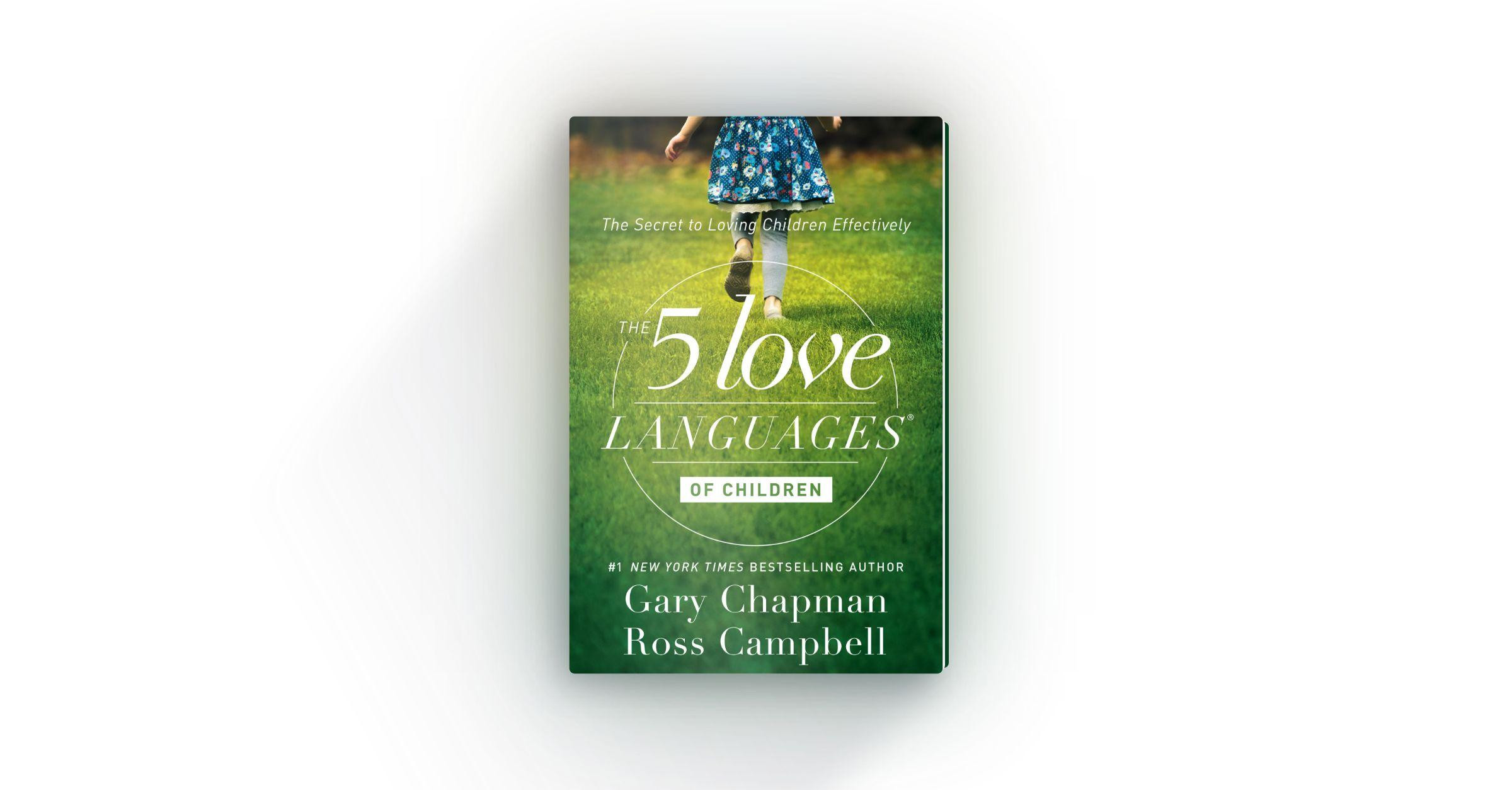









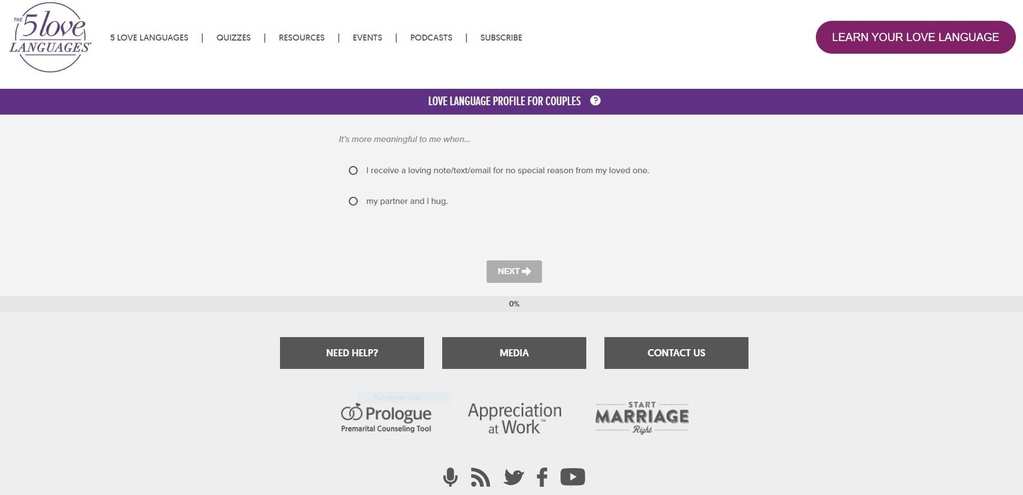
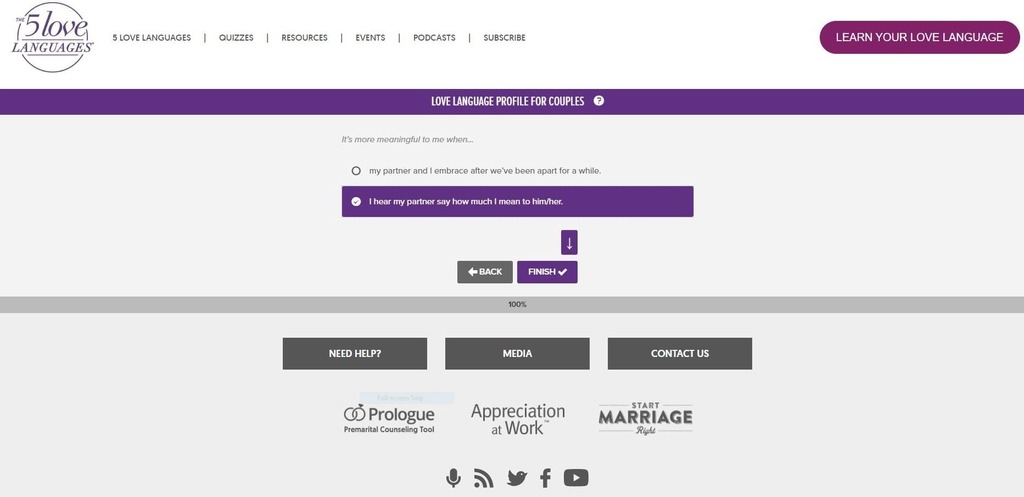
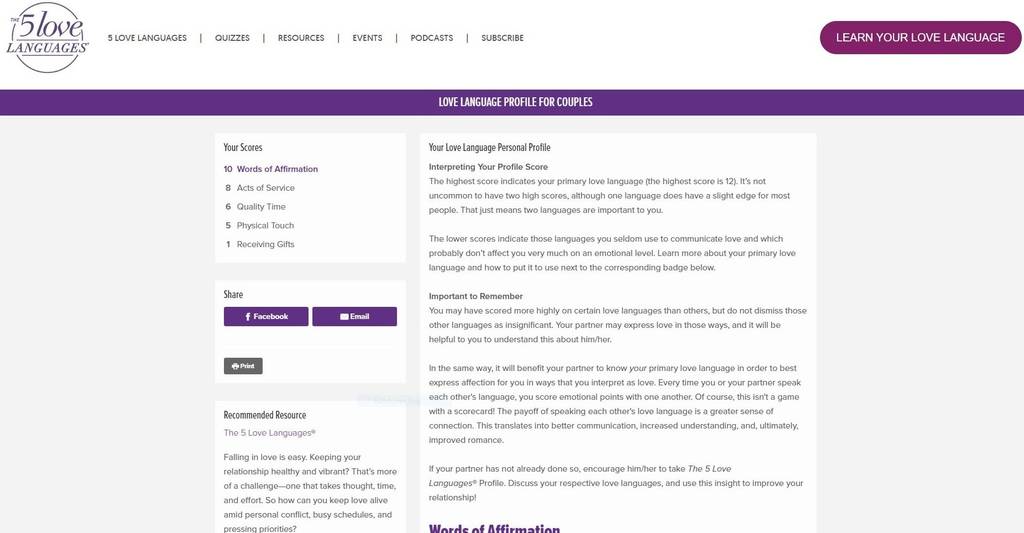












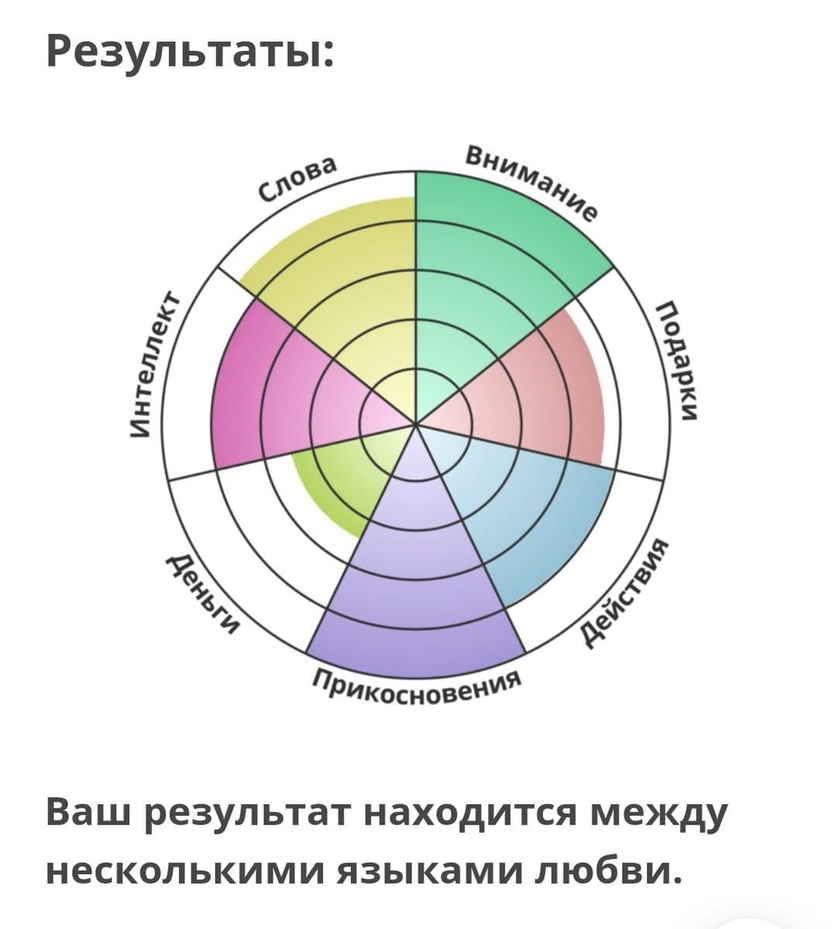
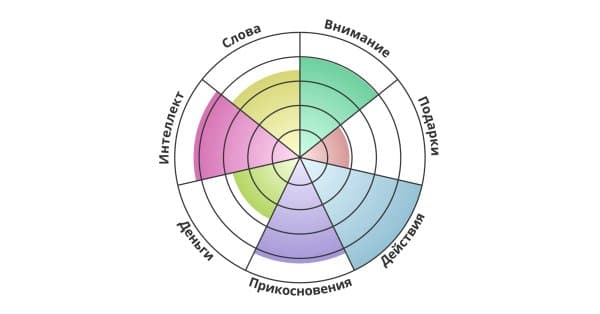

:max_bytes(150000):strip_icc()/Sherri-Gordon-1000-9b857b46047148108c1f2fb50bee6e51.jpg)
:max_bytes(150000):strip_icc()/Adah-Chung-1000-df54540455394e3ab797f6fce238d785.jpg)
:max_bytes(150000):strip_icc()/can-the-five-love-languages-help-your-relationship-4783538_round5-bc8cda272d9b4e58a9de82b322fccd6b.jpg)

















































